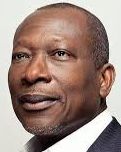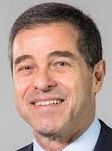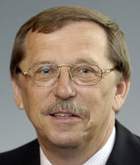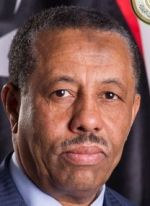Rulers
Index Ta-Ti
Ta Mok, original name Ung Choeun, also called Chhit Choeun, Ek Choeun, etc. (b. 1926, Brakeab village, Takeo province, southern Cambodia - d. July 21, 2006, Phnom Penh, Cambodia), Cambodian leader. He joined the resistance against the French colonialists in the 1940s and was an early adherent of the Communist Party ("Khmer Rouge") built up by Pol Pot; at some time during his revolutionary career, he took the nom de guerre of Ta Mok, meaning Grandfather Mok. He was said to have been one of the commanders involved in the March 1974 razing of the former royal capital at Oudong, the expulsion of its civilian population, and the massacre of officials and government soldiers captured there. After the Khmer Rouge victory in April 1975, he headed the party's southwestern zone from his home province of Takeo. In 1978, he was dispatched to conduct a purge in the eastern zone bordering Vietnam. A Vietnamese invasion drove the Khmer Rouge from power in 1979. They continued to fight against the Vietnamese-installed regime, and the loss of a leg to a land mine in the early 1980s while inspecting a road project failed to keep Ta Mok from carrying on with the guerrilla struggle. In a 1997 power play he toppled Pol Pot and led the Khmer Rouge in its final days; its force was all but spent, and the government captured its last stronghold at Anlong Veng in 1998, forcing Ta Mok to flee. Unlike other surviving Khmer Rouge leaders, he struck no deal to surrender or defect to the government. He was captured along the Thai-Cambodian border in March 1999 while on the run with a small band of followers. Held in a Phnom Penh military prison, he was charged with crimes against humanity in 2002 but died before he could be tried. His supposed ruthlessness earned him the nickname "The Butcher" in the Western press.
Taaffe, Eduard (Franz Joseph) Graf (Count), (11th) Viscount Taaffe (b. Feb. 24, 1833, Vienna, Austria - d. Nov. 29, 1895, Ellischau, Bohemia, Austria [now Nalzovy, Czech Republic]), Landespräsident of Salzburg (1863-67), Statthalter of Oberösterreich (1867) and Tirol (1871-79), and interior minister (1867, 1870-71) and prime minister (1868-70, 1879-93) of Austria. He succeeded as viscount in the Irish peerage in 1873.
Taal, Olari (b. Aug. 7, 1953, Valga, Estonian S.S.R.), interior minister of Estonia (1998-99). He was also minister of construction (1992) and economic affairs (1992).
Taba`a, Sidi Rashid al-Shakir Sahib al- (b. c. 1795 - d. [strangled] Sept. 11, 1837, Bardo palace, near Tunis, Tunisia), prime minister of Tunisia (1829-37).
Tabacaru, Nicolae (b. Aug. 20, 1955, Tarutino [now Tarutyne] rayon, Odessa oblast, Ukrainian S.S.R.), foreign minister of Moldova (1997-2000). He was also ambassador to Germany (2001-03).
Tabacci, Bruno (b. August 1946, Quistello, Lombardia, Italy), president of Lombardia (1987-89).

Tabai |
Tabai, Ieremia (Tienang) (b. Dec. 16, 1950, Nonouti island, Gilbert and Ellice Islands [now in Kiribati]), president of Kiribati (1979-82, 1983-91). In 1974 he was returned to the House of Assembly of the Gilbert and Ellice Islands by the Nonouti constituency and later became the recognized "leader of the opposition" in a system characterized by loose coalitions of like-minded members rather than by formal political parties. In opposition he was a consistent critic of the centralist tendencies of Chief Minister Naboua Ratieta's government, of its somewhat extravagant plans for a costly defense force, and of increasing westernization in government and lifestyles. He championed the virtues of traditional Gilbertese culture, publicized the grievances of village-dwelling copra farmers, and criticized the government expenditure on Tarawa at the expense of the "outer islands." In 1978 Tabai became chief minister. Prior to independence, he proved himself to be a shrewd negotiator when he led his government in discussions with the U.K. over a financial settlement. Also at issue were the demands (not met) of the Banabans that their ancestral homeland of Ocean Island, now a barren wasteland because of phosphate mining, should be separated from Kiribati. In 1979 Tabai was made a companion of St. Michael and St. George by Queen Elizabeth II. When the Gilbert Islands became independent Kiribati on July 12, 1979, Tabai became its first president. He was knighted (G.C.M.G.) in 1982, but does not generally use the title Sir. Retiring from the presidency after serving the maximum three terms allowed by the constitution, he served as secretary-general of the South Pacific Forum (1992-98). In 1999 he was fined for trying to establish an independent radio station. In 2000 he founded a newspaper, the Kiribati Newstar.
Tabani, Ashraf W(ali Mohammad) (b. Dec. 17, 1930 - d. July 16, 2009, Karachi, Pakistan), governor of Sindh (1987-88).
Tabera, Félix, interior and justice minister of Bolivia (1937).

Tabet |
Tabet, Ayoub, Arabic Ayyub Thabit (b. 1875?, Beirut, Lebanon - d. Feb. 16, 1947), interior minister (1928), acting prime minister (1936-37, 1943), and acting president (1943) of Lebanon.
Tabeyev, Fikryat (Ahmedzhanovich) (b. March 4, 1928, Azeyev village, Ryazan oblast, Russian S.F.S.R. - d. June 3, 2015), Soviet politician. He was first secretary of the Communist Party committee of the Tatar A.S.S.R. (1960-79), ambassador to Afghanistan (1979-86), and first deputy premier of the Russian S.F.S.R. (1986-90).
Tabi, Barnabas, internal affairs minister of Vanuatu (1999-2001).
Tabi, Sidi Yusuf Sahib al- (d. [killed] Jan. 23, 1815, Tunis, Tunisia), prime minister of Tunisia (1800-15).
Tablante (Hidalgo), Carlos (Humberto) (b. Oct. 29, 1954, Maracay, Aragua, Venezuela), governor of Aragua (1989-96). He was also Venezuelan minister of state and president of the National Commission Against the Illicit Use of Drugs (1996-98).
Taboada (Mora), Diógenes (b. June 18, 1885, Pisco-Yacú, San Luis, Argentina - d. Dec. 24, 1978, Buenos Aires, Argentina), interior minister (1938-40) and foreign minister (1959-61) of Argentina. He was also ambassador to Uruguay (1958-59) and Peru (1961-62).
Tabone, Anton (b. Nov. 15, 1937, Gozo island, Malta), Maltese politician; nephew of Censu Tabone. He was minister for Gozo (1987-96) and speaker of the House of Representatives (1998-2008).
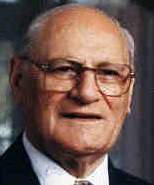
C. Tabone |
Tabone, Censu, byname of Vincent Tabone (b. March 30, 1913, Victoria, Gozo, Malta - d. March 14, 2012, St. Julian's, Malta), foreign minister (1987-89) and president (1989-94) of Malta. He was also minister of labour, employment, and welfare (1966-71).
Tabor, Hans (Rasmussen) (b. April 25, 1922 - d. Nov. 19, 2003), foreign minister of Denmark (1967-68). He was also permanent representative to the United Nations (1964-67, 1974-75) and ambassador to Italy (1968-74), Malta (1969-74), Canada (1975-79), and Norway (1986-92).
Taborga (Terrazas), Alberto (b. Jan. 21, 1909, La Paz, Bolivia - d. ...), interior, justice, and immigration minister of Bolivia (1943-44).
Taborga Torrico, (José) Huáscar (b. Nov. 22, 1930, Cochabamba, Bolivia - d. Oct. 20, 2012), foreign minister of Bolivia (1971). He was also minister of education and culture (1970-71).
Tabuna, Dominic (Joselito) (b. Aug. 9, 1980), justice minister (2012-13) and finance minister (2013) of Nauru. He was also speaker of parliament (2010).
Tabunscic, Gheorghe (b. Aug. 1, 1939, Copciac, Romania [now in Moldova]), governor of Gagauzia (1995-99, 2002-06).

Taché |
Taché, Sir Étienne Paschal (b. Sept. 5, 1795, Saint-Thomas, Lower Canada [now Quebec] - d. July 30, 1865, Saint-Thomas), joint premier of Canada (1855-57, 1864-65). He fought with the British in the War of 1812 and entered active political life with the first elections for the united province of Canada, being elected member for the riding of L'Islet (1841). From 1841 to 1846, he remained in the background of the major political debates and spoke little in the House of Assembly. But when Taché gave a speech in 1846 on the need to establish a militia in Lower Canada, his colleagues took notice. Only two months after his speech, the Draper-Papineau government named him deputy adjutant-general of the militia, responsible for reorganizing the Lower Canadian armed forces. In 1848, he was appointed to the Executive Council and named commissioner of public works in the Baldwin-Lafontaine administration. He was receiver general in several administrations from 1849 to 1857. In 1855-56, he formed a government with Sir Allan Napier MacNab. When MacNab was forced to resign, Taché chose John Alexander Macdonald to form a new government. This coalition was the first sign of an alliance between Liberals in Lower Canada and Conservatives in Upper Canada. In 1857 Taché retired from politics, but he was summoned back by Macdonald in 1864. That same year he presided over the Quebec Conference, which approved the Seventy-two Resolutions that were to form the basis of the British North America Act. He was the only "father of Confederation" who did not live to see it. He was knighted in 1858.
Tachnazarov, Guychnazar (Tachnazarovich), Turkmen Guýçnazar (Taçnazarowiç) Taçnazarow (b. 1951, Kizyl-Arvat, Ashkhabad oblast, Turkmen S.S.R. [now Serdar, Balkan velayat, Turkmenistan]), a deputy prime minister of Turkmenistan (2005). He was also chairman of Turkmengaz State Concern (1996-2005) and minister of oil and gas industry and mineral resources (2005).
Tack, Juan Antonio (b. Nov. 16, 1934, Panama - d. Feb. 23, 2011, Panama City, Panama), foreign minister of Panama (1969-76).
Taçoy, Hasan (b. 1963, Nicosia, Cyprus), foreign minister of North Cyprus (2022). He was also minister of public works and transport (2009-10, 2014-15) and economy and energy (2019-20).
Taddei, Paolino (b. Jan. 22, 1860, Poggio a Caiano, Tuscany [now in Prato province, Toscana, Italy] - d. Oct. 15, 1925, Florence, Italy), interior minister of Italy (1922). He was also prefect of Ferrara (1910-13), Perugia (1913-14), Ancona (1914-17), and Torino (1917-22) provinces.
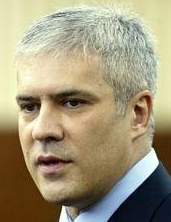
Tadic |
Tadic, Boris (b. Jan. 15, 1958, Sarajevo, Bosnia and Herzegovina), defense minister of Serbia and Montenegro (2003-04) and president of Serbia (2004-12). He lost the 2012 presidential elections to Tomislav Nikolic.
Tadmoury, Selim (b. 1938, Tripoli, Lebanon), Lebanese diplomat. He was ambassador to China (1983-85), Turkey (1987-90), and the Soviet Union/Russia (1990-99) and permanent representative to the United Nations (1999-2003).
Taewon-gun, original name Yi Ha-ung (b. 1820, Seoul, Korea [now in South Korea] - d. Feb. 22, 1898, Seoul), regent of Korea (1864-73); father of King Kojong. He was born as a distant relative of the royal family and as such held no position in the government. However, when King Ch'oljong died in 1864, leaving no suitable heir to the throne, Yi Ha-ung's minor son was picked as the successor, with him as regent. He assumed the title Taewon-gun ("Prince of the Great Court"). He engaged in extensive national rebuilding programs while taking a strongly isolationist stand, in stark contrast to Japan's open-door policy during this period. He inaugurated a far-ranging reform program to strengthen the monarchy, weaken the power of the factions and great clans, and enhance the revenue of the state; he modernized and increased the armies and rationalized the administration. He successfully mobilized the nation against the small but better-equipped naval detachments sent by France and the United States and rejected Japanese and Western overtures for trade and diplomatic relations. As it was customary that the king's in-laws enjoyed power in the court, he did everything to prevent a threat from this quarter, and when his son was 16 he selected an orphaned girl among his wife's relatives, Min, as the new queen, thinking to be safe with this woman. He underestimated her cleverness, however, and she allied with his enemies. By 1873, they had enough power to oust him; his son, anyway, had reached the age of 21. Seeing his anti-foreign policies being reversed, he in 1882 inspired a rebellion against the supporters of Queen Min and their alleged Japanese allies; he temporarily returned to power, but a Chinese force soon arrived and took him as a prisoner to China for three years.
Taezaz, Blattengeta Lorenzo (Mebrhatu) (b. June 30, 1900 - d. June 23, 1947, Stockholm, Sweden), foreign minister of Ethiopia (1941-42). He was also minister for posts, telephones, and telegrams (1942-43), president of the Chamber of Deputies (1943-44), and ambassador to the Soviet Union (1944-46).
Tafrov, Stefan (Lyubomirov) (b. Feb. 11, 1958, Sofia, Bulgaria), Bulgarian diplomat. He was ambassador to Italy (1992-95), the United Kingdom and Ireland (1995-97), and France (1997-2001) and permanent representative to the United Nations (2001-06, 2012-16).
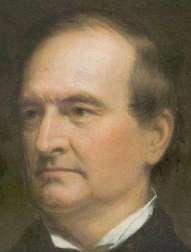
A. Taft |
Taft, Alphonso (b. Nov. 5, 1810, Townshend, Vt. - d. May 21, 1891, San Diego, Calif.), U.S. secretary of war (1876) and attorney general (1876-77). He was also minister to Austria-Hungary (1882) and Russia (1884-85).
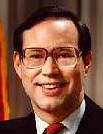
B. Taft |
Taft, Bob, byname of Robert Alphonso Taft III (b. Jan. 8, 1942, Boston, Mass.), governor of Ohio (1999-2007); grandson of Robert A. Taft. He served in the Peace Corps teaching at a boarding school in Tanzania (1963-65), and in Vietnam with the State Department (1967-69). Embarking on a political career as a Republican, he was elected to the Ohio House of Representatives in 1976, served four years, then was elected Hamilton County commissioner. He wanted to be governor in 1990, but GOP leaders persuaded him to step aside to avoid a nasty primary fight with George Voinovich, who went on to serve two terms in the office. Taft instead became Ohio secretary of state (1991-99). He was rewarded for his patience in 1998, winning the gubernatorial race 50%-45% over his Democratic opponent, former state attorney general Lee Fisher. In his first year in office he fulfilled many of his campaign promises. He made several tax cuts, but later the financial situation forced him to raise taxes again. In February 2002 he announced his $1.6 billion, 10-year Third Frontier Project to fund biomedical research and support industries and high-tech products with growth potential. He was unopposed in the 2002 Republican primary and raised huge sums, eventually $12 million. The Democratic nomination went to former Cuyahoga County commissioner Tim Hagan, a spirited liberal who had trouble raising money, eventually netting $1 million. Taft, who angered some conservatives when he named as his lieutenant governor candidate Columbus councilwoman Jennette Bradley, a supporter of abortion rights, won 58%-38%. Swept up in a state investment scandal that led to his own no contest plea to ethics law violations in 2005, he ended his tenure as one of the most unpopular governors in the country.

R.A. Taft |
Taft, Robert A(lphonso) (b. Sept. 8, 1889, Cincinnati, Ohio - d. July 31, 1953, New York City), U.S. politician; son of William Howard Taft. He served during World War I as assistant counsel for the U.S. Food Administration (1917-18) and then with the American Relief Administration (1919). A Republican, he became a member of the Ohio House of Representatives (1921-26) and the state Senate (1931-32). Elected to the U.S. Senate in 1938, when the Republican Party was slowly reviving, he lost no time in establishing himself as a powerful influence, hammering away at the "vain, immoral, and dangerous" precepts of the New Deal, denouncing its "socialistic trends," defending traditional American "individualism," and calling for a balanced budget and less centralization of power in Washington. He was also an outspoken anti-interventionist, though after the Japanese attack on Pearl Harbor (1941) he supported the war effort. He was reelected by a narrow margin in 1944, but with the election of a Republican-majority Congress in 1946, his importance increased. Often called "Mr. Republican," he dominated the party's Senate policy committee, and his most notable achievement was the passage of the Taft-Hartley Labor Relations Act (1947), which placed restrictions on organized labour. Though he retreated somewhat from his earlier isolationism, he still opposed U.S. involvement in world affairs. This, and his unexciting personality, were reasons for his failure to win the Republican presidential nomination. He had already been a favourite-son candidate in 1936, but had the most support in 1948, when he lost to Thomas E. Dewey, and in 1952, when he lost to Dwight D. Eisenhower. In January 1953 Taft (who had won a third term by an overwhelming majority in 1950) became Senate majority leader.
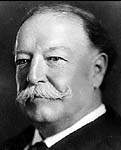
W.H. Taft |
Taft, William Howard (b. Sept. 15, 1857, Cincinnati, Ohio - d. March 8, 1930, Washington, D.C.), president of the United States (1909-13); son of Alphonso Taft. He held local political offices until 1887, when he became a judge of the superior court of Ohio. He then served as U.S. solicitor general (1890-92) and as judge of the U.S. Sixth Circuit Court of Appeals (1892-1900). In 1900 he was persuaded by Pres. William McKinley to give up his judgeship to serve as chairman of the second Philippine Commission, charged with organizing civil government in the islands following the Spanish-American War (1898). Having achieved the end of military rule, he became the first civilian governor in 1901 and thereafter concentrated on the economic development of the islands. He served with great distinction and became popular with the Philippine people. He refused to leave the post when offered appointment to the Supreme Court. When, in 1904, he was named secretary of war, he left with the stipulation that he could continue to supervise Philippine affairs. Pres. Theodore Roosevelt, declining to run for reelection in 1908, threw his support behind Taft, who won the Republican nomination and went on to an easy victory at the polls over the Democratic candidate, William Jennings Bryan. Progressives were disappointed with Taft, and the last months of his unspectacular administration were clouded by a growing breach with Roosevelt, whose increasing radicalism alienated the incumbent. When Taft reluctantly ran for a second term in 1912 against Roosevelt, who ran as a Progressive, the Democrat Woodrow Wilson benefited from the split and won. In 1921 Taft was appointed chief justice of the United States. In declining health, he resigned in February 1930 and died the next month.
Taft, William Howard, III (b. Aug. 7, 1915, Bar Harbor, Maine - d. Feb. 23, 1991, Washington, D.C.), U.S. diplomat; son of Robert A. Taft. He was ambassador to Ireland (1953-57).
Taganov, Merettagan (Gurbandurdiyevich), Turkmen Merettagan (Gurbandurdyýewiç) Taganow, justice minister of Turkmenistan (2021- ).
Taganov, Palvan (Klychdurdiyevich), Turkmen Palwan (Glyçdurdyýewiç) Taganow, a deputy prime minister of Turkmenistan (2013-16). He was also chairman of the Chamber of Commerce and Industry (2007-12) and the State Committee for Tourism (2012-13).
Tagarev, Todor (Dimitrov) (b. April 18, 1960, Gara Krichim [now Stamboliyski], Bulgaria), defense minister of Bulgaria (2013).
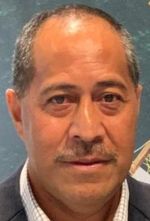
Tagelagi |
Tagelagi, Dalton (Emani) (b. June 5, 1968, Alofi, Niue), premier of Niue (2020- ). He was also minister of infrastructure (2014-17) and natural resources (2017-20).
Tagirov, Afzal (Mukhitdinovich) (b. Nov. 6 [Oct. 25, O.S.], 1890, Abdrakhmanovo, Samara province, Russia - d. [executed] Sept. 27, 1937), chairman of the Central Executive Committee of the Bashkir A.S.S.R. (1931-37).
Tagiyev, Ibragim (Tagi ogly) (b. 1894 - d. [executed] Oct. 13, 1937), executive secretary of the Communist Party committee of the Nakhichevan A.S.S.R. (1920s/30s).
Tagiyev, Tachberdy (Tagiyevich), Turkmen Täçberdi (Tagyýewiç) Tagyýew (b. 1955, Kizyl-Atrek rayon, Krasnovodsk oblast, Turkmen S.S.R. [now Etrek etrap, Balkan velayat, Turkmenistan]), a deputy prime minister of Turkmenistan (2007-09). He was also minister of oil and gas industry and mineral resources (2002-03), head of Balkan velayat (2003-06), and chairman of Turkmengaz State Concern (2007).
Tagle (y Frago), Protasio (Pérez de) (b. 1839, Mexico City, Mexico - d. July 31, 1903, Mexico City), governor of the Distrito Federal (1876) and Mexican minister of interior (1876-77) and justice and public instruction (1877-79).
Tagle y Portocarrero, José Bernardo de, (IV) marqués de Torre Tagle, conde de la Monclova, marqués de Trujillo (b. March 21, 1779, Lima, Peru - d. Sept. 26, 1825, Callao, Peru), interim administrator (1823) and president (1823-24) of Peru. He was also mayor of Lima (1811-12).
Tago, Stephen, home affairs minister (1978-80) and defense minister (1985-87) of Papua New Guinea. He was also minister of environment, conservation, and human settlement (1977-78) and science, culture, and tourism (1980-82).
Taha, Ali Osman Mohamed, Arabic `Ali `Uthman Muhammad Taha (b. 1948), foreign minister (1995-98), first vice president (1998-2005, 2011-13), and second vice president (2005-11) of The Sudan.
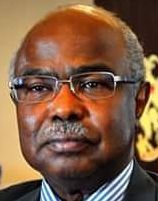
H.B. Taha |
Taha, Hissein Brahim (b. Nov. 1, 1951, Abéché, Chad), foreign minister of Chad (2017) and secretary-general of the Organization of Islamic Cooperation (2021- ). He was also ambassador to Taiwan (2001-06) and France (2006-17).
Tahi(gogona), Onneyn (Morris) (b. July 24, 1944, Losingoiburie village, Aoba [now Ambae] island, New Hebrides [now Vanuatu] - d. [car crash] 1998, Ambae island), acting president of Vanuatu (1989). He was minister of education, youth, and sports (1983-87), public works (1991), and agriculture, livestock, forestry, and fisheries (1992-95) and speaker of parliament (1988-91).
Tahiliani, R(adhakrishna) H(ariram) (b. May 12, 1930, Karachi, India [now in Pakistan] - d. Oct. 14, 2015, New Delhi, India), governor of Sikkim (1990-94). Admiral Tahiliani was also Indian chief of naval staff (1984-87).

B. Tahiri |
Tahiri, Besnik (b. July 1, 1975, Podujevo, Kosovo, Serbia), foreign minister of Kosovo (2021).
Tahiri, Saimir (Bashkim) (b. Oct. 30, 1979, Tiranë, Albania), interior minister of Albania (2013-17).
Tähkämaa, Taisto (Toivo Johannes) (b. Dec. 11, 1924, Parainen, Finland), defense minister of Finland (1977-79). He was also minister of agriculture and forestry (1979-83).
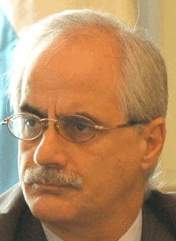
Taiana |
Taiana (Riccitelli), Jorge (Enrique) (b. May 31, 1950, Buenos Aires, Argentina), foreign minister (2005-10) and defense minister (2021- ) of Argentina. He was ambassador to Guatemala in 1992-96.
Taila Nage, Joachim (b. June 10, 1962, Bonzale, Équateur, Congo [Léopoldville] [now in Sud-Ubangi, Congo (Kinshasa)]), governor of Sud-Ubangi (2017-19).
Tailhadès, Edgar (b. Jan. 10, 1904 - d. June 23, 1986), president of the Regional Council of Languedoc-Roussillon (1974-83).
Tailhand, Adrien (Albert) (b. July 1, 1810, Aubenas, Ardèche, France - d. Oct. 8, 1889, Aubenas), justice minister of France (1874-75).
Taina, Anneli (Kristiina) (b. June 21, 1951, Imatra, Finland), defense minister of Finland (1995-99). She was also minister of housing (1995).
Tairov, Yusif (Pasha ogly) (b. 1893 - d. [executed] Jan. 8, 1938), executive secretary of the Communist Party committee of Nakhichevan (c. 1924).
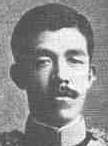
Taisho-tenno |
Taisho-tenno (posthumous name), original name Yoshihito Harunomiya (b. Aug. 31, 1879, Tokyo, Japan - d. Dec. 25, 1926, Hayama, Japan), emperor of Japan (1912-26). The third son of the Meiji-tenno, Yoshihito was proclaimed heir apparent on his 8th birthday, after his two elder brothers died, and he was declared crown prince on Nov. 3, 1889. In 1897 he took his seat in the House of Peers. He married Princess Sadako, a daughter of Prince Michitaka Kujo, in 1900 and had four sons: Hirohito, Yasuhito, Nobuhito, and Takahito. On the death of his father in July 1912, he became, by the official count, the 123rd emperor of Japan. Owing to the national mourning the formal ceremony of enthronement did not take place until November 1915. Unlike his predecessor, he played almost no political role. His physical and mental faculties were increasingly impaired by a series of strokes after 1919, and Crown Prince Hirohito was appointed prince regent in 1921. His reign, referred to as the Taisho ("Great Righteousness") era, was marked by foreign policies congenial to Western powers, especially to Great Britain and the United States. These included participation in World War I on the Allied side, the anti-Bolshevik intervention in Siberia, and participation in the Washington disarmament conference. Japan continued the modernization of its economy, and there was a political liberalization, as characterized by an expansion of the suffrage, that led historians to speak of the period of "Taisho Democracy."
Taitt, Sir Branford (Mayhew) (b. May 15, 1938, St. Michael, Barbados - d. Feb. 15, 2013), foreign minister of Barbados (1993-94); knighted 2010. He was also minister of trade, industry, and commerce (1971-76), tourism and industry (1986-87), and health (1987-93) and president of the Senate (2008-12).
Taittinger, Jean (Marie Pierre Hubert) (b. Jan. 25, 1923, Neuilly-sur-Seine, Seine [now in Hauts-de-Seine], France - d. Sept. 23, 2012, Epalinges, Vaud, Switzerland), justice minister of France (1973-74); son of Pierre Taittinger. He was also mayor of Reims (1959-77).
Taittinger, Pierre (Charles) (b. Oct. 4, 1887, Paris, France - d. Jan. 22, 1965, Paris), president of the Municipal Council of Paris (1943-44).
Taittinger, Pierre-Christian (b. Feb. 5, 1926, Paris, France - d. Sept. 27, 2009, Versailles, Yvelines, France), president of the Municipal Council of Paris (1962-63); son of Pierre Taittinger; brother of Jean Taittinger.
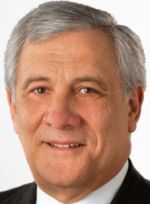
A. Tajani |
Tajani, Antonio (b. Aug. 4, 1953, Rome, Italy), president of the European Parliament (2017-19) and foreign minister and a deputy prime minister of Italy (2022- ).
Tajani, Diego (b. June 8, 1827, Cutro, Two Sicilies [now in Calabria, Italy] - d. Feb. 2, 1921, Rome, Italy), justice minister of Italy (1878-79, 1885-87).
Tajuddin Ahazul Khairi Waddien, Sir Ahmad (b. Sept. 2, 1913, Brunei Town [now Bandar Seri Begawan], Brunei - d. June 4, 1950, Singapore), sultan of Brunei (1924-50); knighted 1949.
Tak van Poortvliet, Johannes Pieter Roetert ("van Poortvliet" added in 1874) (b. June 21, 1839, Engelen, Noord-Brabant, Netherlands - d. Jan. 26, 1904, The Hague, Netherlands), interior minister of the Netherlands (1891-94). He was also minister of water management, trade, and industry (1877-79).
Taka, Chazel, or Shadhil Taqa (b. 1929, Mosul, Iraq - d. [poisoned?] Oct. 20, 1974, Rabat, Morocco), foreign minister of Iraq (1974). A prominent poet, he was also ambassador to the Soviet Union (1969-72).
Takács, Albert (b. March 27, 1955, Kecskemét, Hungary), justice minister of Hungary (2007-08).
Takada, Isamu (b. July 8, 1926 - d. Sept. 8, 2018, Nagasaki, Japan), governor of Nagasaki (1982-98).
Takahashi, Harumi (b. Jan. 6, 1954), governor of Hokkaido (2003-19).
Takahashi, Kazuo (b. July 28, 1930 - d. Jan. 8, 2022, Yamagata, Japan), governor of Yamagata (1993-2005).
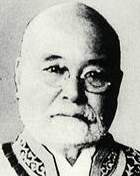
Korekiyo Takahashi |
Takahashi, Korekiyo (b. July 27, 1854, Tokyo, Japan - d. Feb. 26, 1936, Tokyo), prime minister of Japan (1921-22). Long an official of the Yokohama Specie Bank, he became its president in 1906, and from 1911 to 1913 he was president of the Bank of Japan. In 1921, after the assassination of Takashi Hara, he became prime minister and head of the Seiyukai party, but his cabinet fell in 1922. He was one of Japan's greatest finance ministers, serving in that capacity in 1913-14, 1918-22, 1927, and 1931-36. An advocate of sound government finance, supported by the business interests, he opposed army demands for larger military appropriations and warned against inflation and overexpansion of the national debt. He was assassinated by army extremists in an unsuccessful military coup.
Takasu, Yukio (b. Aug. 29, 1946), Japanese diplomat. He was permanent representative to the United Nations (2007-10).
Takemura, Masayoshi (b. Aug. 26, 1934, Yokaichi, Shiga prefecture, Japan - d. Sept. 28, 2022), governor of Shiga (1974-86) and finance minister of Japan (1994-96).
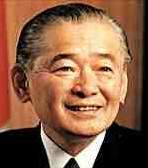
Takeshita |
Takeshita, Noboru (b. Feb. 26, 1924, Kakeya village, Shimane prefecture, Japan - d. June 19, 2000, Tokyo, Japan), prime minister of Japan (1987-89). He was a member of the Shimane prefectural assembly (1951-58) before being elected to the lower house of the Diet (parliament). His first ministerial post was as chief cabinet secretary (1971-72, 1974); he later was minister of construction (1976) and finance (1979-80, 1982-86). Within the Liberal-Democratic Party (LDP), he belonged to the pivotal faction led by Kakuei Tanaka. However, in February 1985, he inaugurated his own study group, Soseikai. Although this same ploy had previously been used by Tanaka to establish a personal power base within the ranks of the Eisaku Sato faction, Takeshita's move reportedly infuriated Tanaka. Takeshita was secretary-general of the LDP in 1986-87. In July 1987 he set up his own faction. In October 1987 he was handpicked for the post of president of the LDP (and thus prime minister) by his predecessor, Yasuhiro Nakasone. He is most remembered for helping to pass an unpopular sales tax. In April 1988 he admitted that he was among those politicians who had received stock and cash donations from Recruit, a Japanese company which sought to win special treatment for its businesses. Three cabinet ministers were forced to resign; Takeshita himself toughed it out for months, but with both his own and the LDP's popularity on the rocks - public support at one point plunged to a mere 3% or less - he finally accepted his fate and resigned in 1989. Takeshita, long regarded as one of Japan's "shadow shoguns," played one of his last political cards when he selected protégé Keizo Obuchi (to whom he had turned over his faction in 1992) for premier in 1998. He retired from politics in May 2000.
Takesy, Asterio R. (b. May 25, 1944, Ulul island, Truk [now Chuuk], Micronesia [now in Federated States of Micronesia]), foreign minister of the Federated States of Micronesia (1990-91 [acting], 1996-97). He was also minister of resources and development (1991-95) and ambassador to the United States (2012-16).
Takeuchi, Ryuji (b. May 1, 1903, Beijing, China - d. Sept. 6, 1999), Japanese diplomat. He was permanent observer to the United Nations (1952-53) and ambassador to Belgium (1955-57, also minister to Luxembourg), West Germany (1957-60), and the United States (1963-67).
Takht Ravanchi, Majid (b. Oct. 15, 1958, Tehran, Iran), Iranian diplomat. He was ambassador to Switzerland and Liechtenstein (2002-06) and permanent representative to the United Nations (2019-22).
Takhtamyshev, Georgy (Stepanovich) (b. April 18, 1874, Belgorod, Russia - d. [executed] May 27, 1930, Moscow, Russian S.F.S.R.), Russian minister of communications (1917).
Takhtarov, Adil-Girey (b. 1886, Kumtorkala, Dagestan oblast [now republic], Russia - d. 1962), chairman of the Central Executive Committee (1937-38) and of the Presidium of the Supreme Soviet (1938-50) of the Dagestan A.S.S.R.
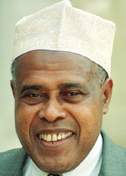
Taki |
Taki Abdoulkarim, Mohamed (b. Feb. 20, 1936, Mbeni, Grande Comore, Comoros - d. Nov. 6, 1998, Beit Salam, Moroni, Comoros), president of the Comoros (1996-98). He was minister of development (1970-71), education (1971-72), rural development (1972-73), equipment (1973-75), and interior (1975) and speaker of the Federal Assembly (1982-84), then went into exile in France. Returning in 1990, he unsuccessfully challenged Said Mohamed Djohar in presidential elections, then went back into exile. Emerging again in 1992, he served briefly as Djohar's government coordinator, but was dismissed and later was linked to an abortive coup attempt. He went back into hiding until September 1995 when he supported the overthrow of Djohar by Robert Denard's mercenaries and was briefly installed as co-president until French troops landed and ousted the mercenaries. In March 1996 he emerged as winner of presidential elections in the coup-prone Indian Ocean island state. Taki, of the National Union for Democracy, took 64.2% of the votes in the second round. His opponent, Abbas Djoussouf, joined other Comoros leaders in congratulating Taki on winning what observers said was a fair and peaceful poll. Taki expressed his satisfaction with the outcome of the election. He told Radio Comoros: "Perhaps for the first time in the history of our country, the election of a president has proceeded democratically, freely and transparently. For this we are indebted above all to France, to the French government, and to the international organizations." He said he would unite Comorans and would not represent any particular region. He promised an economic revival with foreign aid, though it was not clear where this would come from. When in 1997 the island of Anjouan declared its independence, he immediately sent federal troops, but this only fuelled the aggression of the secessionists. He died in office.
Takizala (Luyanu Mwis Mbingin), Henri-Désiré (b. Aug. 5, 1936, Lundu, Belgian Congo [now in Kwilu province, Congo (Kinshasa)] - d. Dec. 22, 2000, Brussels, Belgium), governor of Kwilu (1966), Bandundu (1966-67), Kasaï Oriental (1967-68), Kivu (1968-69), Équateur (1969-70), and Katanga (1970-72) and commissioner of Kasaï Occidental (1972-74). He was also minister of public works (1974-77), mines (1977-84), higher education and scientific research (1984-85), mobilization, propaganda, and political action (1985), and agriculture (1988-90) of Zaire.
Takla, Philippe (b. Feb. 3, 1915, Zouk Mikaël, Lebanon - d. July 10, 2006), foreign minister (1946, 1949-51, 1952, 1958, 1960-64, 1964-65, 1966, 1974-75, 1975-76) and finance minister (1951-52) of Lebanon. He was elected to parliament in 1945 and again in 1947 and 1957. He was also minister of economy (1948-51, 1951-52, 1959-60) and justice (1959-60, 1966). In 1964 he became governor of the central bank and in 1967 permanent representative to the United Nations, then in 1968-71 was ambassador in Paris. He retired from public life in 1976.
Takla, Selim (b. 1895 - d. Jan. 11, 1945), foreign minister of Lebanon (1938, 1943-45).
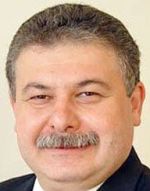
Sergey Takoyev |
Takoyev, Sergey (Kermenovich) (b. June 2, 1964, Digora, North Ossetian A.S.S.R., Russian S.F.S.R.), prime minister of North Ossetia-Alania (2012-15).
Takoyev, Simon (Aliyevich) (b. May 27, 1876, Khristianovskoye, Terek oblast [now Digora, North Ossetia-Alania republic], Russia - d. [in prison] October 1938), executive secretary of the Communist Party committee of Adzharistan (1922). He was also chairman of the party committee (1920) and Executive Committee (1921) of Terek oblast, chairman of the Council of People's Commissars of the Mountain (Gorskaya) A.S.S.R. (1921-22), and executive secretary of the party committee of North Ossetian autonomous oblast (1924-27).

Talabani |
Talabani, Jalal (Husamuddin) (b. 1933, Kelkan village, northern Iraq - d. Oct. 3, 2017, Berlin, Germany), president of the Governing Council (2003) and president (2005-14) of Iraq. As a young man he was quickly seduced by the Kurdish struggle for a homeland to unite a people scattered across Iraq, Iran, Turkey, and Syria. He joined the Kurdistan Democratic Party (KDP) of Mustafa Barzani and took to the hills in a first uprising against the Iraqi government in 1961. But he famously fell out with Barzani who sued for peace with Baghdad - the start of a long and costly internecine feud among Iraqi Kurds. Talabani joined a KDP splinter faction in 1964 and fled to neighbouring Iran in protest. He formalized the breakup in 1975 by establishing his Patriotic Union of Kurdistan after Barzani's forces, abandoned by their Iranian, U.S., and Israeli allies, were routed by the Iraqi army. In the aftermath of the 1991 Gulf War, Western intervention allowed the Kurds to reestablish control over the three most northerly provinces of Iraq, but the rebel enclave fell far short of Kurdish claims for full independence amid Turkish opposition to statehood. The rivalry between Talabani and the Barzanis, now led by Mustafa's son Massoud, degenerated to all-out war in 1993, as Talabani challenged the rival KDP monopoly over customs revenues levied at the Turkish border. The disastrous struggle climaxed with a KDP-invited invasion and reconquest of Arbil by Iraqi forces in 1996. True rapprochement came only in 2002, when it became clear that Washington intended to overthrow Saddam Hussein. Talabani and Barzani then set aside their rivalries and united to safeguard their gains. In 2005, after the first election since the U.S.-led invasion in 2003, Talabani became president of Iraq, while Barzani became president of autonomous Kurdistan. Talabani was reelected in 2006 and 2010, cementing his people's powerful role on the national stage after suffering years as second-class citizens. A close ally of the United States, he won plaudits for striving to smooth strained relations with Syria and Iran as part of efforts to end the two regional powers' suspected efforts to feed the insurgency in Iraq. After suffering a stroke in 2012, he left for treatment in Germany, only returning shortly before the end of his term in 2014.
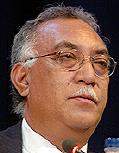
Talagi |
Talagi, Sir Toke (Tufukia) (b. Jan. 9, 1951, Alofi, Niue - d. July 14, 2020, Niue), premier of Niue (2008-20); knighted 2016. He was also minister of finance (2002-05, 2008-20) and tourism (2002).
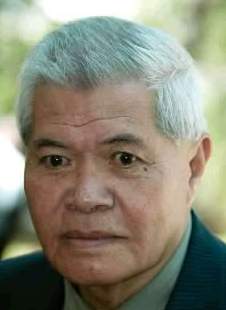
Talake |
Talake, Koloa (Fineaso) (b. June 7, 1934, Vaitupu, Gilbert and Ellice Islands [now in Tuvalu] - d. May 26, 2008), finance minister (1993-96) and prime minister (2001-02) of Tuvalu. He was auditor of the Gilbert and Ellice Islands (1973-75), then auditor (1976-77) and financial secretary (1977-78) of Tuvalu. As MP for Vaitupu since 1993, he moved the censure motion that forced Prime Minister Bikenibeu Paeniu to resign in 1999. Another no-confidence vote, against Faimalaga Luka, led to Talake becoming prime minister. In this role he considered taking legal action against the industrialized nations of the world for causing global warming. Tuvalu is predicted to be among the first countries to disappear under rising sea levels. During his term New Zealand agreed to change its immigration policies to formally admit 75 Tuvaluans a year under its Pacific Access Category, as he sought to gradually reduce Tuvalu's population. However, the prevailing sentiment in Tuvalu was that the country could not afford the kind of legal representation needed to take on major countries in court, and he lost his seat in the 2002 elections. He subsequently moved to New Zealand himself.
Talal (ibn Abdul Aziz Al Saud) (b. Aug. 15, 1931 - d. Dec. 22, 2018), Saudi prince; son of Abdul Aziz. He was minister of communications (1953-55) and economy and finance (1960-61) and ambassador to France (1955-56).
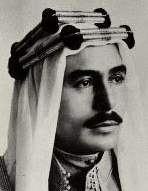
Talal (Jordan) | 
Talat |
Talal (ibn Abdullah al-Hashimi), Arabic Talal (ibn `Abd Allah al-Hashimi) (b. Feb. 26, 1909, Mecca, Ottoman Empire [now in Saudi Arabia] - d. July 8, 1972, Istanbul, Turkey), king of Jordan (1951-52).
Talanchuk, Petro (Mykhailovych) (b. July 1, 1938, Gorodishche-Kosovskoye [Horodyshche-Kosivske], Kiev oblast, Ukrainian S.S.R.), Ukrainian politician. He was minister of education (1992-94) and a minor presidential candidate (1994).
Talat, Mehmet Ali (b. July 6, 1952, Kyrenia, Cyprus), prime minister (2004-05) and president (2005-10) of North Cyprus. He was also minister of education and culture (1994-95) and deputy prime minister (1995-96). He was an unsuccessful presidential candidate in 2000 and 2010.
Talbot, Charles Chetwynd-Talbot, (2nd) Earl (b. April 25, 1777 - d. Jan. 10, 1849, Ingestre Hall, Staffordshire, England), lord lieutenant of Ireland (1817-21). He succeeded as earl in 1793.
Talbot, Frederick Hilborn (b. Oct. 13, 1927, Mahaicony, East Coast Demerara, British Guiana [now Guyana] - d. April 11, 2019), Guyanese diplomat. He was permanent representative to the United Nations (1971-73), ambassador to the United States (1973-75), and high commissioner to Canada (1973-74) and Jamaica (1975-81). He was also a bishop of the African Methodist Episcopal Church.
Talbot, George Wilfred, Guyanese diplomat. He was permanent representative to the United Nations (2012-16) and ambassador to Brazil (2016-21).
Talbot, Sir Reginald (Arthur James) (b. July 11, 1841, London, England - d. Jan. 15, 1929, London), governor of Victoria (1904-08); knighted 1902; grandson of Charles Chetwynd-Talbot, Earl Talbot.
Talbot of Hensol, Charles Talbot, (1st) Baron (b. Dec. 21, 1685 - d. Feb. 14, 1737, London, England), British lord chancellor (1733-37). He was also solicitor general (1726-33). He was created baron in 1733.
Talbott, Strobe, byname of Nelson Strobridge Talbott III (b. April 25, 1946, Dayton, Ohio), acting U.S. secretary of state (1997). He was president of the Brookings Institution in 2002-17.
Talboys, Sir Brian (Edward) (b. June 7, 1921, Wanganui, New Zealand - d. June 3, 2012, Invercargill, New Zealand), deputy prime minister and foreign minister of New Zealand (1975-81); knighted 1991. He was also minister of agriculture (1962-69), science (1963-72), education (1969-72), overseas trade (1972, 1975-81), and industries and commerce (1972).
Talesi (Honolulu), Teniku, acting governor-general of Tuvalu (2019-21).
Taleyarkhan, Homi J(ehangir) H(ormusji) (b. Feb. 9, 1917, Bombay [now Mumbai], India - d. June 27, 1998), governor of Sikkim (1981-84). He was also Indian ambassador to Libya (1971-77) and Italy (1984-85).
Talhi, Jadallah Azzuz (bil-Qasim) al-, also spelled Giadalla Azzuz Belgassem Ettalhi (b. 1939, Libya), secretary of the General People's Committee (1979-84, 1986-87) and foreign minister (1987-90) of Libya. He was also secretary/minister of industry and mineral resources (1972-79), communications (1984-86), strategic industries (1990-94), the Great Man-Made River Project (1994-98), and planning (1998-2000) and permanent representative to the United Nations (2007-09).
Talhouni, Bahjat (Abdul Khadr) al-, Arabic Bahjat (`Abd al-Khadir) al-Talhuni (b. 1913, Ma`an, vilayet of Syria, Ottoman Empire [now in Jordan] - d. Jan. 30, 1994, Amman, Jordan), prime minister of Jordan (1960-62, 1964-65, 1967-69, 1969-70). He became a judge in Karak in 1938 and president of the Court of Appeals in 1952 before joining the cabinet as minister of the interior (1953-54). As chief of the royal court (1954-60, 1963-64, 1969, 1973-74), he was King Hussein's chief adviser. He was first named prime minister in 1960, after Prime Minister Hazza` al-Majali's assassination, and was recalled to office three times. The self-effacing Talhouni was considered a moderate Nasserist, though loyal to King Hussein, and was thus appointed by the king whenever he wanted to improve relations with Egypt and when he wished to assert control over the cabinet. Talhouni also took up an ambiguous stand towards the Palestinian guerrillas based in Jordan, the country's major policy problem in those years: while loyal to the Jordanian establishment, he was acceptable to the guerrillas and sought an accommodation with them. He was removed each time when unpopular measures were deemed necessary. He was also foreign minister (1961, 1967-68), justice minister (1964-65), and defense and interior minister (1968). In 1974 he was named president of the Senate, a post he held until the early 1980s, and he headed many pan-Arab parliamentary committees at international events and conferences. He also was head of the Jordanian-Soviet (later Jordanian-Russian) Friendship Society.
Talhouni, Tharwat al- (b. 1922, Ma`an, Transjordan [now Jordan]), interior minister of Jordan (1974-76); brother-in-law of Bahjat al-Talhouni. He was also governor of Amman (1971-74).
Talib, Naji (b. 1917, Nasiriyah, Ottoman Empire [now in Iraq] - d. March 23, 2012), foreign minister (1964-65) and prime minister (1966-67) of Iraq. He was also minister of social affairs (1958-59), industry (1963-64), and petroleum (1966-67).
Tall, Wasfi (Mustafa) al- (b. 1920, Irbid, Transjordan [now in Jordan] - d. [assassinated] Nov. 28, 1971, Cairo, Egypt), prime minister (1962-63, 1965-67, 1970-71) and defense minister (1962-63, 1965-66, 1966-67) of Jordan. He was also ambassador to Iraq (1960-62) and chief of the royal court (1967).

Tall Sall |
Tall Sall, Aïssata (b. Dec. 12, 1957, Podor, Senegal), foreign minister of Senegal (2020- ). She was also minister of communications (1998-2000).
Tallec, Jacques (Victor François) (b. July 30, 1902, Lorient, Morbihan, France - d. Sept. 17, 1977, Joigny, Yonne, France), governor of New Caledonia (1944-47).
Tallec, Jean-François (b. Dec. 25, 1946, Saint-Denis, France), prefect of Saint-Pierre and Miquelon (2001-02). He was also prefect of the départements of Indre (2002-05), Yonne (2005-07), and Dordogne (2007-08).
Talleyrand-Périgord, Alexandre Daniel, baron de (b. Feb. 22, 1776, Paris, France - d. July 3, 1839, Bois-d'Oingt, Rhône, France), French official; brother of Auguste Louis, comte de Talleyrand-Périgord; cousin of Charles Maurice de Talleyrand-Périgord. He was prefect of the départements of Loiret (1814-15, 1815), Vaucluse (1817), Aisne (1820-22), Allier (1822-23), Nièvre (1828-30), Drôme (1830), and Pas-de-Calais (1831-33) and minister to Tuscany (1833-35) and Denmark (1835-38).
Talleyrand-Périgord, Auguste Louis, comte de (b. Feb. 10, 1770, Paris, France - d. Oct. 20, 1832, Milan, Austria [now in Italy]), French diplomat. He was minister to Baden (1808) and Switzerland (1808-13, 1814-23). He was made comte de l'Empire in 1810.
Talleyrand-Périgord, Charles Angélique, baron de (b. Nov. 8, 1821, Laon, Aisne, France - d. Feb. 29, 1896, Florence, Italy), French diplomat; son of Alexandre Daniel, baron de Talleyrand-Périgord. He was minister to Saxe-Weimar-Eisenach (1852-54), Baden (1854-56), Sardinia (1859-61), Belgium (1861-62), and Prussia (1862-64) and ambassador to Russia (1864-69).
Talleyrand-Périgord, Charles Maurice de, (from 1806) prince de Bénévent (b. Feb. 2, 1754, Paris, France - d. May 17, 1838, Paris), foreign minister (1797-99, 1799-1807, 1814-15, 1815), president of the provisional government (1814), and prime minister (1815) of France. He was nominated bishop of Autun by Louis XVI (1788), elected to the Estates General (1789), and was one of the members of the Assembly selected to draw up the Declaration of Rights. He took a cynical delight in attacking the clergy to which he still nominally belonged, and proposed confiscating the landed property of the church. In 1790 he was elected president of the Assembly. In 1791 he consecrated two "constitutional" bishops, was excommunicated, and gave up his clerical career. Early in 1792 he was sent to London, but failed to conciliate William Pitt the Younger; in December he was placed on the list of émigrés. He remained in exile until January 1794, when the Alien Act drove him to the U.S. After the fall of Maximilien Robespierre he returned to Paris (1796) and was made foreign minister under the Directory (1797). For a time he was in disgrace, but he resumed his post after helping Napoléon Bonaparte gain power under the Consulate (1799). Recognizing the latter's genius, he was greatly instrumental in consolidating Napoléon's power as consul for life (1802) and as emperor (1804). He shared responsibility with Napoléon for the organization (1806) of the Confederation of the Rhine, but soon after withdrew from the ministry, though he still served as grand chamberlain (1804-09). At Erfurt (1808), he revealed state secrets to Russia and mortally offended Napoléon, after the disasters in Spain, by making tentative arrangements for the succession. He was opposed to the invasion of Russia (1812) and on this basis deserted Napoléon. In 1814 he dictated to the Senate the terms of Napoléon's deposition, and became foreign minister under Louis XVIII. He negotiated the treaty by which the allies left France in possession of the boundaries of 1792, and at the Congress of Vienna (1814-15) he established France's right to take part on equal terms. After the second Restoration, he became prime minister, but was soon forced out by the ultraroyalists. He was Louis-Philippe's chief adviser at the July Revolution (1830) and went to London as ambassador, retiring in 1834.
Tallgren, Carl Olof (Kristian) (b. Jan. 28, 1927, Turku, Finland), finance minister of Finland (1970-71). He was also chairman of the Swedish People's Party (1974-77).
Tallo, Piet Alexander (b. April 27, 1942, Tepas, Netherlands East Indies [now in Timor Tengah Selatan regency, Nusa Tenggara Timur, Indonesia] - d. April 25, 2009, Jakarta, Indonesia), governor of Nusa Tenggara Timur (1998-2008).
Talmadge, Eugene (b. Sept. 23, 1884, Forsyth, Ga. - d. Dec. 21, 1946, Atlanta, Ga.), governor of Georgia (1933-37, 1941-43).
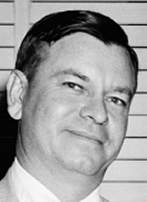
H. Talmadge |
Talmadge, Herman (Eugene) (b. Aug. 9, 1913, near McRae, Ga. - d. March 21, 2002, Hampton, Ga.), governor of Georgia (1947, 1948-55). His father, Eugene, was governor-elect when he died in December 1946. The Talmadge machine maintained that the legislature, which it dominated, should pick the new governor from among the candidates who had lost in November. Conveniently, one of them was the younger Talmadge, who had received some write-in votes. Herman Talmadge won the legislative vote but was kept from the governor's office by outgoing Gov. Ellis Arnall, who contended Lieutenant Governor-elect M.E. Thompson was his rightful successor. When Arnall departed for the night, Talmadge supporters took over the governor's office and mansion, and Arnall found his way blocked by state troopers. The state Supreme Court eventually ruled in favour of Thompson, but Talmadge beat him in a special election in 1948 and won a four-year term in 1950. As governor, he imposed a sales tax and used the money to overhaul schools, hospitals, and roads. In 1956 he was elected to the U.S. Senate, where he became part of the Southern coalition that for a time obstructed civil rights legislation. But when Leroy Johnson in 1962 became the first black elected to the Georgia legislature since Reconstruction, Talmadge invited him to breakfast at his mansion. Still, Talmadge voted against the 1964 civil rights and the 1965 voting rights bills, though by 1975 he voted to extend the voting rights act. In 1973 he served on the Senate Watergate committee. In 1980, after he was denounced by the Senate for financial irregularities and admitted to an alcohol problem, he was unseated by the first Republican to win a Georgia Senate race since Reconstruction.
Talmage, Thomas G. (b. Oct. 22, 1801, Somerset, N.J. - d. May 4, 1863), mayor of Brooklyn (1845).
Talon, Patrice (Guillaume Athanase) (b. May 1, 1958, Abomey, Dahomey [now Benin]), president of Benin (2016- ).
Talu, (Mehmet) Naim (b. July 22, 1919, Istanbul, Turkey - d. May 15, 1998, Istanbul), prime minister of Turkey (1973-74). He was also governor of the Central Bank of Turkey (1967-71) and minister of commerce (1971-73).
Talvi (Pérez), Ernesto (b. June 10, 1957, Montevideo, Uruguay), foreign minister of Uruguay (2020). He was a presidential candidate in 2019.
Talyzin, Nikolay (Vladimirovich) (b. Jan. 28, 1929, Moscow, Russian S.F.S.R. - d. Jan. 23, 1991, Moscow), Soviet politician. He was minister of communications (1975-80), a deputy premier (1980-85, 1988-89), a first deputy premier (1985-88), and chairman of the State Planning Committee (1985-88).
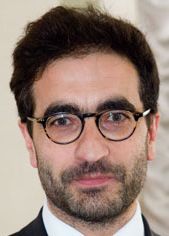
Tamagnini |
Tamagnini, Filippo (b. Jan. 30, 1972, San Marino), captain-regent of San Marino (2011).
Tamanabae, Suckling (b. July 25, 1957 - d. July 14, 2020), governor of Oro (2007-12).
Tamasuniene, Rita (b. Sept. 27, 1973, Maisiagala, Lithuanian S.S.R.), interior minister of Lithuania (2019-20).
Tamayo, Luis (b. March 3, 1896, Bogotá, Colombia - d. ...), interior minister (1942) and war minister (1945-46) of Colombia. He was also governor of Cundinamarca (1934-36), minister to the United Kingdom (1937-40), and minister of national economy (1945).
Tamayo Pacheco, (Juan) Francisco (b. Oct. 4, 1891, Urubamba, Peru - d. April 18, 1957, Lima, Peru), interior minister of Peru (1931).
Tamayo Ramos, Jorge (b. 1923?, Oruro, Bolivia), finance minister of Bolivia (1978, 1981). He was also minister of national economy (1957-60).
Tamayo Sáenz, Marcial (b. April 13, 1921, La Paz, Bolivia - d. March 18, 1997, La Paz), foreign minister of Bolivia (1983); son of José Tamayo Solares. He was also a writer and was minister of information (1956-57) and interior, justice, and immigration (1958) and permanent representative to the United Nations (1958-61).
Tamayo Solares, Franz (b. Feb. 28, 1879, La Paz, Bolivia - d. July 29, 1956, La Paz), foreign minister of Bolivia (1932-33). A noted writer, he was elected president in 1934 but was prevented from taking office by a coup.
Tamayo Solares, José (b. Jan. 31, 1890, La Paz, Bolivia - d. af. 1953, Buenos Aires, Argentina), foreign minister of Bolivia (1943-44); brother of Franz Tamayo Solares.
Tambiyev, Yusup (Dudayevich) (b. Dec. 1, 1906, Nazran, Terek oblast [now in Ingushetia], Russia - d. Kirgiz S.S.R.), chairman of the Executive Committee of Soviets (1937-38) and of the Presidium of the Supreme Soviet (1938-44) of the Chechen-Ingush A.S.S.R.
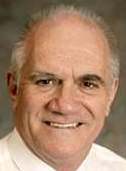
Tambling |
Tambling, Grant (Ernest John) (b. June 20, 1943, Wondai, Queensland, Australia), administrator of Norfolk Island (2003-07).
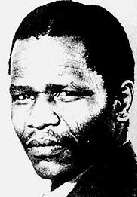
Tambo |
Tambo, Oliver (Reginald Kaizana) (b. Oct. 27, 1917, Kantolo village, near Bizana, East Pondoland, Cape province [now in Eastern Cape], South Africa - d. April 24, 1993, Johannesburg, South Africa), South African political activist. He joined the African National Congress (ANC) in 1943. In 1944 he and Nelson Mandela were among the founders of the ANC Youth League. Tambo became a member of the ANC executive council in 1949 and was appointed secretary-general in 1955. Arrested on treason charges in 1956, he was released the following year and in 1958 became ANC deputy president-general. In 1960, when word leaked out that the ANC would be banned, he managed to slip out of the country, and during the following 30 years he almost singlehandedly built up the external and military wings of the ANC while the organization was banned and many of its leaders, including Mandela, imprisoned. He became acting president-general when Albert Luthuli died in 1967, and he was approved as president-general by the Morogoro conference in 1969. His success in isolating Pretoria and mustering international condemnation of apartheid was often measured by the fact that by 1989 the ANC had more representatives abroad than the government. His speeches were free of rhetoric and ideology and reflected the thoughtful and serious mind of a devoted family man. After the ban on the ANC was lifted, Tambo, who had led its operations mainly from Lusaka (Zambia) and London, returned home in triumph in December 1990, but a stroke he had suffered in 1989 left him unable to continue his executive duties. In July 1991 Mandela was named ANC president-general, and Tambo was given the largely honorary post of national chairman.

Tambroni |
Tambroni (Armaroli), Fernando (b. Nov. 25, 1901, Ascoli Piceno, Italy - d. Feb. 18, 1963, Rome, Italy), prime minister of Italy (1960). He was also minister of the merchant marine (1953-55), interior (1955-59), and budget and treasury (1959-60).
Tambunan, A(lbertus) M(aruli), governor of Sulawesi Tengah (1973-78).
Tambunan, E(dward) W(ellington) P(ahala) (b. Jan. 14, 1928, Balige, Netherlands East Indies [now in Sumatera Utara, Indonesia] - d. Jan. 17, 2006, Jakarta, Indonesia), governor of Sumatera Utara (1978-83).
Tambuwal, Aminu Waziri (b. Jan. 10, 1966, Tambuwal [now in Sokoto state], Nigeria), governor of Sokoto (2015- ). He was also speaker of the Nigerian House of Representatives (2011-15).
Tambwe No Fumu wa Mla Nau, also called Mbaye Trambwe (b. 1735, Iconi, Ngazidja, Comoros - d. 1815), sultan of Washili (c. 1760-...).
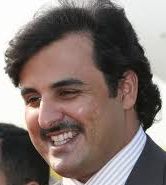
Tamim |
Tamim ibn Hamad Al Thani, Sheikh (b. June 3, 1980, Doha, Qatar), emir of Qatar (2013- ); son of Sheikh Hamad ibn Khalifa Al Thani. He became crown prince in 2003.
Tamir, Shmuel, original surname Katznelson (b. March 10, 1923, Jerusalem, Palestine - d. June 29, 1987, Herzliya, Israel), justice minister of Israel (1977-80).
Tamm, Claës Gustaf Adolf friherre (b. Aug. 10, 1838, Stavby socken, Uppsala, Sweden - d. June 25, 1925, Stockholm, Sweden), finance minister of Sweden (1886-88) and governor of Stockholm city (1888-1902).
Tamm, Henric (Sebastian) (b. May 31, 1869, Älfkarleby socken, Uppsala, Sweden - d. May 21, 1936), finance minister of Sweden (1920-21).
Tamosaitis, Antanas (b. Aug. 18, 1894, Smukuciai, Russia [now in Lithuania] - d. late 1940, Kaunas, Lithuanian S.S.R.), justice minister of Lithuania (1939-40).
Tampiza, Constantin (Alexandru) (b. Dec. 21, 1947, Costangalia, Moldavian S.S.R.), finance minister of Moldova (1991-92). He was also a deputy prime minister and minister of national economy (1990-92).
Tamrat Layne, Tamrat also spelled Tamirat (b. 1955), prime minister (1991-95) and deputy prime minister and defense minister (1995-96) of Ethiopia. He was arrested for corruption and abuse of office in 1996 and sentenced to 18 years in prison on March 14, 2000; he was released Dec. 19, 2008.
Tamuera, Tekiree (b. Feb. 16, 1940, Maiana, Gilbert and Ellice Islands [now in Kiribati]), chairman of the Council of State of Kiribati (1994). He was speaker of parliament (1994-2002).
Tan, Karen (b. April 1964, Singapore), Singaporean diplomat. She was ambassador to Laos (2004-07) and Bhutan and Nepal (2011-13), high commissioner to India (2011-13), and permanent representative to the United Nations (2013-16).

T. Tan |
Tan (Keng Yam), Tony, Pinyin Chen Qingyan (b. Feb. 7, 1940), finance minister (1983-85), defense minister (1995-2003), deputy prime minister (1995-2005), and president (2011-17) of Singapore. First elected to public office in 1979, he also was minister of education (1980-83, 1985-91), health (1985), and trade and industry (1985-86). In 2003-05 he was coordinating minister for security and defense, overseeing the work of multiple ministries to tighten security against conventional and terrorist threats.
Tan Haoming (b. 1871, Long Xian, Guangxi, China - d. 1925, Shanghai, China), military governor of Guangxi (1917-21). He held the posts of commander of the 2nd Division and then commander of the 5th Army. In 1921, when the revolutionary Guangdong army entered Guangxi, he fled from office with another pro-Beijing general, Lu Rongting. Later he gained sufficient support from Beijing and made his way back to Guangxi, but his forces were soon defeated by Shen Hongying. He went to Shanghai afterwards, where he was killed by his guard.
Tan Siew Sin, Tun (b. May 21, 1916, Malacca, Straits Settlements [now in Malaysia] - d. March 17, 1988, Kuala Lumpur, Malaysia), finance minister of Malaya/Malaysia (1959-69, 1970-74). He was also minister of commerce and industry (1957-59), minister without portfolio (1969-70), and president of the Malayan/Malaysian Chinese Association (1961-74). He was awarded the title Tun in 1967.
Tanabe, Kunio (b. Sept. 24, 1913, Enzan [now part of Koshu], Yamanashi prefecture, Japan - d. Dec. 19, 2005, Koshu), governor of Yamanashi (1967-79).
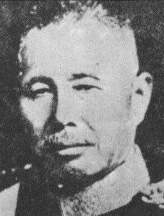
G. Tanaka |
Tanaka, Giichi, in full Danshaku (Baron) Giichi Tanaka (b. June 22, 1863, Hagi, Choshu province [now in Yamaguchi prefecture], Japan - d. Sept. 29, 1929, Tokyo, Japan), prime minister of Japan (1927-29). A protégé of Aritomo Yamagata, he had a distinguished career in the army and during 1910-13 was director of the Military Affairs Bureau. As minister of war (1918-21, 1923-24), he forcefully advocated, and then vigorously prosecuted, the Japanese campaign in Siberia against the new Soviet regime in Russia. Dreaming of a Japanese empire in Siberia, he conspired with his military associates to send many times the number of troops originally agreed upon and to keep them there long after other countries had withdrawn their forces. Tanaka, who was created a baron and promoted to general in 1920, was one of the most bitterly criticized ministers in Japan. Elected president of the dominant Friends of Constitutional Government (Rikken Seiyukai) political party and retiring from the army in 1925, he became prime minister and foreign minister in 1927. He promoted legislation inflicting the death penalty on revolutionists and subversives. His "strong-arm" policy with respect to China earned him sharp criticism at home and abroad. In 1928 he intervened to block the progress of Chiang Kai-shek's Northern Expedition and Jinan was occupied. He was particularly adamant about retaining Japanese control in southern Manchuria. However, the so-called "Tanaka Memorial," supposedly a report to the emperor in which he urged Japanese expansion in China, is apparently a forgery. His failure to persuade the army to punish officers involved in the assassination of the Manchurian warlord Zhang Zuolin led to the fall of his cabinet in July 1929.
Tanaka, Hisaichi, also called Hisakazu Tanaka (b. 1889 - d. March 1947, Guangzhou, China), Japanese governor of Hong Kong (1944-45). He was condemned to death and executed as a war criminal.
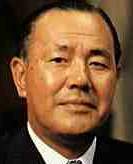
K. Tanaka |
Tanaka, Kakuei (b. May 4, 1918, Kariwa, Niigata prefecture, Japan - d. Dec. 16, 1993, Tokyo, Japan), prime minister of Japan (1972-74). One of the richest men in Japan, he was elected to parliament in 1947 as a candidate of the Democratic Party, and the following year joined the newly formed Democratic Liberal Party, a forerunner of the Liberal-Democratic Party (LDP). Building the most powerful, tightly knit faction of the LDP, he became minister of postal services and communications (1957-58), finance (1962-64), and international trade and industry (1971-72) and was made secretary-general of the LDP in 1965 and 1968. In 1972 he succeeded Prime Minister Eisaku Sato in a surprising upset victory over Sato's chosen successor, Takeo Fukuda. He opened diplomatic relations with the People's Republic of China and advocated a policy of redistributing industry across the nation. In the elections of July 1974 his party made a poor showing. In December he was forced to resign in disgrace, dogged by questions about his personal fortune, allegations of tax evasion, and widespread criticism that his economic policies sparked inflation. In July 1976 he was arrested for allegedly accepting about $2 million in exchange for promoting the sale of Lockheed Corp. jets while in office. After a 7-year trial, during which he continued to rule over his LDP faction and thus had a major voice in the selection of prime ministers, he was convicted of graft in October 1983 and sentenced to four years in prison. A subsequent appeal was rejected by the Tokyo High Court in July 1987, but he remained free pending an appeal to the Supreme Court, which was still unresolved when he died. His influence waned after he suffered a serious stroke in February 1985; his faction split up in July 1987 and he finally retired from politics in October 1989.
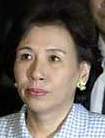
M. Tanaka |
Tanaka, Makiko (b. Jan. 14, 1944, Niigata prefecture, Japan), foreign minister of Japan (2001-02); daughter of Kakuei Tanaka. She was first elected to the Diet in 1993, representing her father's old district in Niigata prefecture. She served as head of the Science and Technology Agency in 1994-95 but became popular for her cutting commentary about her colleagues in the Liberal-Democratic Party (LDP). During a three-way race for the party leadership in 1998, for instance, she remarked that it was an unfortunate battle between "a militarist, a yokel, and a weirdo." By 2001 her straight talk, down-to-earth approach, and determination to end the factional rivalries, backroom deals, and scandals that rocked the ruling LDP had made her the most admired politician in the country. She was an effective campaign supporter of reformist candidate Junichiro Koizumi (the "weirdo"), who was elected prime minister in April 2001 and then appointed her Japan's first female foreign minister. Less than three months into her job Maki, as she was affectionately known, came under fire for allegedly moving away from Japan's neutral position on a proposed U.S. missile shield and possibly damaging ties with the country's most important ally. After initially balking at Koizumi's orders to dismiss Tokyo's ambassador to Washington, she was barred from representing Japan at the UN General Assembly in November. In January 2002 she was unceremoniously dumped over a feud with Foreign Ministry bureaucrats and the LDP old guard. The official line was that the bickering was holding up passage of the budget. She was also lambasted in the press for crying on camera in the spat that led to her sacking. In June she was suspended from the LDP after refusing to cooperate with a party probe into graft allegations. She resigned her seat in parliament in August.
Tanaka, Yasuo (b. April 12, 1956), governor of Nagano (2000-02, 2002-06).
Tanangada, Jimson Fiau, home affairs minister of the Solomon Islands (2017). He was also minister of women, youth, children, and family affairs (2014-15), rural development (2015-17), and police, national security, and correctional services (2017).
Tanangada, Lanelle Olandrea (b. 1979), Solomon Islands politician; wife of Jimson Fiau Tanangada. She has been minister of women, youth, children, and family affairs (2018-19), police, national security, and correctional services (2019), and education and human resource development (2020- ).
Tanase, Alexandru (b. Feb. 24, 1971, Kishinev, Moldavian S.S.R. [now Chisinau, Moldova]), justice minister of Moldova (2009-11, 2018). He was also president of the Constitutional Court (2011-17).
Tanasie, Petre (b. Oct. 9, 1927, Slatioara, Romania), Romanian diplomat. He was ambassador to India, Sri Lanka, and Nepal (1969-77) and permanent representative to the United Nations (1987-90).
Tanassi, Mario (b. March 17, 1916, Ururi, Campobasso province, Italy - d. May 5, 2007, Rome, Italy), defense minister (1970-72, 1972-74) and finance minister (1974) of Italy. He was also minister of industry and commerce (1968-69).
Tanay, Shahnawaz (b. 1950 - d. March 7, 2022, Islamabad, Pakistan), defense minister of Afghanistan (1988-90).
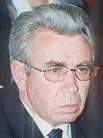
Tanayev |
Tanayev, Nikolay (Timofeyevich) (b. Nov. 5, 1945, Mikhailovka, Penza oblast, Russian S.F.S.R. - d. July 19, 2020, St. Petersburg, Russia), prime minister of Kyrgyzstan (2002-05). He was independent Kyrgyzstan's first ethnic Russian prime minister. He fled to Russia following the protests in March 2005 that led to the ouster of Pres. Askar Akayev. In June an international arrest warrant was issued for him as he was accused of illegally transferring state funds to a private business run by his son. He later returned to Kyrgyzstan, and after being questioned by the prosecutor-general's office in Bishkek, he was released on condition that he stays in the country while investigations are going on. In September, however, he was arrested at a border crossing with Kazakhstan, trying to exit the country. He then was to remain under arrest until the end of the investigation. On May 4, 2006, it was announced that "all criminal cases" against him had been closed due to "his poor health." He was also allowed to leave the country for Russia.
Tanchev (Zhelev), Petur (b. July 12, 1920, Gledka, Bulgaria - d. July 21, 1992), justice minister (1962-66), a deputy premier (1966-71), and a first deputy premier (1971-74) of Bulgaria.
Tancos, João Manuel de Noronha, marquês de (b. March 6, 1679 - d. Jan. 19, 1761), governor of Angola (1713-17). He became (6º) conde de Atalaya in 1722 and (1º) marquês de Tancos in 1751.
Tancredo, Tom, byname of Thomas Gerard Tancredo (b. Dec. 20, 1945, Denver, Colo.), U.S. politician. He was a representative from Colorado (1999-2009) and a candidate for the 2008 Republican presidential nomination.
Tandefelt, Adolf friherre (b. Aug. 8, 1747, Hartola socken, Finland - d. Jan. 5, 1822, Helsingfors [now Helsinki], Finland), governor of Uleåborg (1782-85) and Vasa (1785-94). He was made a Finnish friherre (baron) in 1809.
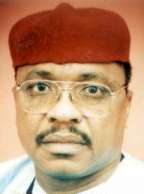
Tandja |
Tandja, Mamadou (b. 1938, Maïné-Soroa, Diffa département, southeastern Niger - d. Nov. 24, 2020, Niamey, Niger), president of Niger (1999-2010). A member of the Kanouri ethnic group, he joined the army in the mid-1950s, rose to the rank of colonel, and won four prestigious decorations. As prefect of Maradi (1976-79) and Tahoua (1981-88), interior minister (1979-81, 1990-91), and ambassador to Nigeria (1988-90), Tandja was known as the "working chief." He participated in most of the formative - and sometimes controversial - events since Niger won its independence from France. In 1974, during a period of severe drought and charges of corruption against Pres. Hamani Diori, Tandja was a member of the military junta that forced Hamani from power and replaced him with Gen. Seyni Kountché. Perhaps the darkest moment in Tandja's career came in 1990, when - as interior minister - he was involved in the violent repression of ethnic Tuareg rebels who had attacked a police station in the north. The rebels alleged the military government had not fulfilled promises to help develop the north or assist Tuareg nomads who had returned to Niger from neighbouring Algeria and Libya. The ensuing clash killed up to 100 rebels, and helped trigger a four-year Tuareg rebellion. Still, these darker memories seem to have been overshadowed in the national imagination by Tandja's reputation for efficiency and hard work. For example, when he served as prefect in Maradi, on the Nigerian border, he won praise from local business leaders for easing restrictions and helping facilitate cross-border trade. He retired from the army in 1991 and began a new career as a politician, winning the leadership of his political party, the National Movement for the Development of Society, and running unsuccessfully for president in 1993 and 1996. He was finally elected in 1999 and reelected in 2004. In 2005-07 he was chairman of the Economic Community of West African States. In 2009 he held a referendum to allow him a third term, but he was ousted in a military coup in 2010. He was released from prison in 2011 when corruption charges were dropped.
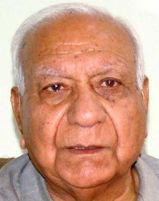
B.D. Tandon | 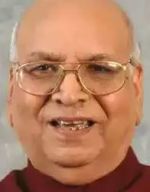
L. Tandon |
Tandon, Balramji Dass (b. Nov. 1, 1927, Amritsar, Punjab, India - d. Aug. 14, 2018, Raipur, Chhattisgarh, India), governor of Chhattisgarh (2014-18).
Tandon, Lalji (b. April 12, 1935, Lucknow, India - d. July 21, 2020, Lucknow), governor of Bihar (2018-19) and Madhya Pradesh (2019-20).
Tandy (Pomerantz), Karen (Patrice) (b. Oct. 24, 1953, Tarrant county, Texas), administrator of the U.S. Drug Enforcement Administration (2003-07).
Tandy, Maurice Patrick (b. May 14, 1912 - d. October 1986), British political officer in the Trucial States (1943-44) and political agent in Kuwait (1945-46).
Tanev, Georgi (Sotirov) (b. Oct. 8, 1943, Pazardzhik, Bulgaria), interior minister of Bulgaria (1988-89). He was also transport minister (1988).
Taney, Roger B(rooke) (b. March 17, 1777, Calvert county, Md. - d. Oct. 12, 1864, Washington, D.C.), U.S. attorney general (1831-33), acting secretary of war (1831), secretary of the treasury (1833-34), and chief justice of the Supreme Court (1836-64).
Tang (Ying-yen), Henry, Pinyin Tang Yingnian (b. 1952, Hong Kong), financial secretary (2003-07), acting chief executive (2005), and chief secretary for administration (2007-11) of Hong Kong.
Tang Erhe (b. 1878, Hangzhou, Zhejiang, China - d. November 1940), education minister (1922), interior minister (1926-27), and finance minister (1927) of China.
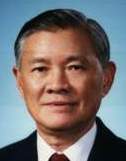
Tang Fei |
Tang Fei (b. March 15, 1932, Taicang county, Jiangsu, China), premier of Taiwan (2000). He came to Taiwan with Chiang Kai-shek's Nationalist troops which lost a civil war to the Chinese Communists and fled into exile on the island in 1949. He graduated from Taiwan's Air Force Academy and began his career as a fighter pilot in the 1950s. During his more than 50 years in service, he served as Air Force Academy superintendent, commanding general of the Combat Air Command, air force commander-in-chief, and (from 1998) chief of the general staff. He became defense minister in 1999 and was one of the most popular members of the cabinet. He was instrumental in parliamentary passage of the long-delayed National Defence Law that officially put the military in the service of the country instead of the Nationalist Party. Swept to power in elections in March 2000 that ended 55 years of Nationalist rule, Pres. Chen Shui-bian of the Democratic Progressive Party appointed Nationalist veteran Tang as premier. The defeated Nationalists reluctantly agreed to let Tang serve as premier but said the party would "neither endorse his administration nor be responsible for it." Chen's decision to recruit Tang was widely hailed as a wise move as it would help the president build support in the military, which had long been controlled by the Nationalists, and also in the Nationalist-dominated legislature. Also, choosing the mainland-born Tang would help promote balance where the political scene is often polarized between native-born Taiwanese like Chen and mainland immigrants like Tang. But once Tang took office in May, he found himself in the crossfire between the Nationalists and the DPP. He became Taiwan's shortest-serving premier when he resigned on health grounds in October after just four and a half months in office.
Tang Hualong (b. 1874, Xishui, Hubei, China - d. Sept. 1, 1918, Victoria, B.C.), education minister (1914-15) and interior minister (1917) of China; brother of Tang Xiangming. A successful candidate in the imperial examination, he joined the constitution movement in 1908 after studying abroad in Japan and was subsequently named president of the Union of Provincial Councils. November 1911 saw the founding of the Hubei Military Government, of which he was named chief advisor. He was elected speaker of the House of Representatives during Yuan Shikai's reign as a member of the (pro-Yuan) Progressive Party of China, and was named interior minister after Duan Qirui took power. The public was upset about the government's continuing acquisition of external debts to prosecute the civil war. Tang, who was returning from an official visit to the United States intended to secure war loans, was assassinated in Canada by a Kuomintang member named Wang Chang (1886-1918), who killed himself thereafter.

Tang Jiaxuan |
Tang Jiaxuan (b. Jan. 17, 1938, Zhenjiang, Jiangsu, China), foreign minister of China (1998-2003).
Tang Jiyao (b. 1881, Huize, Yunnan, China - d. May 23, 1927, Kunming, Yunnan), governor of Guizhou (1912-13) and Yunnan (1913-21, 1922-27). He studied in Japan from 1904 and joined the United League the following year. Holding posts in the Yunnan provincial army, he participated in the uprising against the Qing dynasty in 1911 and expelled Yungui (Yunnan-Guizhou) governor Li Jingxi. He maintained a high prestige in the southwestern region throughout his life. Tending to be a revolutionary, he was named one of the generalissimos of the Southern government (one of the others being Sun Yat-sen) but did not take office. He compromised with the Beijing government later, keeping his status in the south and isolating Sun Yat-sen, who was forced to leave soon. He was expelled from office in 1921 by Gu Pinzhen, but defeated the latter in 1922. He was expelled again in February 1927, through a coup by his subordinate Long Yun and Hu Ruoyu.
Tang Shaoyi (b. 1860, Zhongshan, Guangdong, China - d. [assassinated] Sept. 30, 1938, Shanghai, China), premier (1912), transportation minister (1912), and foreign minister (1916, 1924-25) of China.
Tang Shengzhi (b. 1889, Hunan province, China - d. April 6, 1970, Changsha, Hunan), governor of Hunan (1926-27).
Tang Shizun (b. 1883, Renshou, Sichuan, China - d. [in war] March 28, 1950, Yuexi, Xikang [now in Sichuan]), chairman of the government of Sichuan (1949-50).
Tang Shouqian (b. 1856, Shanyin, Zhejiang, China - d. 1917), military governor of Zhejiang (1911-12). A successful candidate in the imperial examination during the late Qing period, he was in charge of the construction of the Shanghai-Hangzhou railway, and took office as the speaker of the Provincial Council of Zhejiang on the eve of the founding of the republic. He was made the military governor of Zhejiang shortly after the anti-Qing uprising in that rich coastal province. He was one of the founders of the Unity Party of China, whose leader was Zhang Jian. He traveled to Southeast Asia during Yuan Shikai's reign as emperor, which he strongly opposed, and died soon after he returned.
Tang Xiangming (b. 1885 - d. 1975), military (1913-16) and civil (1913-14, 1916) governor of Hunan and civil governor of Hubei (1922-24).
Tang Yao-ming (b. Nov. 29, 1938, Taichung, Taiwan - d. Nov. 3, 2021, Taipei, Taiwan), defense minister of Taiwan (2002-04). He was also army commander (1996-99) and chief of the General Staff (1999-2002).
Tang Yulin (b. 1871, Fuxin [some sources say Chaoyang], Liaoning, China - d. July 1935, Tianjin, China), chairman of the government of Rehe (1926-32).
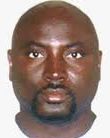
Tangara |
Tangara, Mamadou (b. June 4, 1965, Bathurst [now Banjul], The Gambia), foreign minister of The Gambia (2010-12, 2012, 2018- ). He was also minister of higher education, research, science, and technology (2010, 2012, 2012-13) and fisheries, water resources, and National Assembly matters (2012) and permanent representative to the United Nations (2013-16, 2017-18).
Tangaroa, Sir Tangaroa (b. May 6, 1921, Penrhyn, Cook Islands - d. May 23, 2009, Auckland, N.Z.), queen's representative of the Cook Islands (1984-90); knighted 1987.
Tani, Masayuki (b. Feb. 9, 1889, Kumamoto prefecture, Japan - d. Oct. 26, 1962, Tokyo, Japan), foreign minister of Japan (1942-43). He was also minister to Manchukuo (1933-36) and ambassador to Austria (1936-38), China (Nanjing government; 1943-45), and the United States (1956-57).
Tanigaki, Sadakazu (b. March 7, 1945, Kyoto prefecture, Japan), finance minister of Japan (2003-06). He was also minister of land, infrastructure, transport, tourism, and ocean policy (2008) and justice (2012-14).
Tanimoto, Masanori (b. April 16, 1945), governor of Ishikawa (1994-2022).
Tanin, Zahir (b. May 1, 1956), head of the United Nations Interim Administration Mission in Kosovo (2015-21). He was also permanent representative of Afghanistan to the UN (2006-15).
Tanir, Vefa (b. 1927, Ilgin, Turkey - d. March 10, 2023, Ankara, Turkey), defense minister of Turkey (1995-96). He was also minister of health (1973-74, 1977), public works (1974-75), and forestry (1991-93).
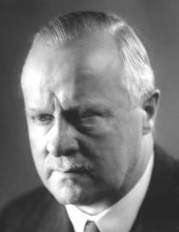
Tanner |
Tanner, Väinö (Alfred), original surname Thomasson (b. March 12, 1881, Helsinki, Finland - d. April 19, 1966, Helsinki), prime minister of Finland (1926-27). Early associated with the cooperative movement, he entered the Finnish parliament as a Social Democrat in 1907. He sat out the 1918 civil war, opposing the Social Democratic alliance with Communist forces, and, after the "White" victory, he worked successfully to revive his party along democratic parliamentary lines. Thereafter he consistently opposed Soviet encroachments on his country's independence. He was chargé d'affaires (1920-21) and minister (1921-23) to Romania before serving as prime minister in Finland's first Social Democrat administration, which was short-lived. Later he became finance minister (1937-39). At the outbreak of the Winter War, he engineered the downfall of the cabinet in a move widely understood as a means of installing a war government. Serving as foreign minister (1939-40), he supported the government's hard line against Soviet demands and largely consolidated the Finnish working class behind the war effort. After the peace of March 1940, he became minister of supply, but Soviet pressure forced his resignation in August. With the resumption of the war, he became minister of commerce and industry (1941-42) and then of finance (1942-44). After the armistice, the Communists accused him of being one of those "responsible for the war." He was arrested on Nov. 6, 1945, and sentenced to 5½ years' imprisonment on Feb. 21, 1946. Released on parole in November 1948 and pardoned in May 1949, he returned to parliament in 1951 and was reelected chairman of the Social Democratic Party in 1957, retiring in 1963. He suffered from persistent Soviet hostility, and Soviet pressure in 1958 was responsible for keeping his party out of office so long as he was leader.
Tannis, Clive (Leonard) (b. 1928 - d. May 1983), home affairs minister of Saint Vincent (1972-74). He was also minister of communications and works (1956-57, 1961, 1962-64), labour (1961, 1965-66, 1972-74), trade and production (1965-66), and tourism (1965-66, 1972-74) and leader of the People's Political Party (1980-83).
Tannis, Hudson K(emul) (b. 1928 - d. [plane crash] Aug. 3, 1986, between St. Vincent and Bequia islands), foreign minister of Saint Vincent and the Grenadines (1980-84). He was also minister of communications, works, and labour (1969-70, 1975-77), education and health (1970-72), home affairs (1977-78, 1979-80), and tourism (1977-78, 1979-84) and non-resident ambassador to the United States (1981-86).
Tanoh-Boutchoué, Bernard (b. July 17, 1950 - d. April 18, 2018, New York City), Ivorian diplomat. He was ambassador to Egypt and Sudan (2008-11), Russia (2011-17), Azerbaijan, Belarus, Georgia, Latvia, and Ukraine (2012-17), and Lithuania (2013-17) and permanent representative to the United Nations (2017-18).
Tanriyar, Ali (b. 1914, Palihor village, near Kavala, Greece - d. May 25, 2017, Istanbul, Turkey), interior minister of Turkey (1983-84).
Tantan, Sadettin (b. 1941, Sapanca, Sakarya, Turkey), interior minister of Turkey (1999-2001). He was also mayor of Fatih (1994-99).
Tantawi (Suleiman), Mohamed Hussein, Arabic Muhammad Husayn Tantawi (Sulayman) (b. Oct. 31, 1935 - d. Sept. 21, 2021), defense minister (1991-2012) and head of the ruling Armed Forces Supreme Council (2011-12) of Egypt. He was raised to the rank of field marshal in 1993.
Tantzen, Theodor (Johann) (b. June 14, 1877, Heering, Oldenburg [now in Niedersachsen], Germany - d. Jan. 11, 1947, Oldenburg, Niedersachsen, Germany), minister-president of Oldenburg (1919-23, 1945-46).
Tanucci, Bernardo, marchese (b. Jan. 20, 1698, Stia, Tuscany [Italy] - d. April 29, 1783, Naples, Kingdom of Naples [Italy]), foreign minister of Naples (1755-76).
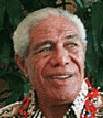
Tanumafili |
Tanumafili II, Malietoa (b. Jan. 4, 1913, Apia, Samoa - d. May 11, 2007, Apia), head of state of (Western) Samoa (1962-2007). He succeeded to the Malietoa title after the death of his father, Tanumafili I, in 1939. In 1940 he was appointed as an advisor (fautua) to the New Zealand governor in Samoa. He was one of the prominent Samoan leaders leading up to independence. On the achievement of independence in 1962, he became joint head of state with Tupua Tamasese Mea'ole, and the following year, he became sole head of state when Tupua Tamasese died. In 1977, Queen Elizabeth II visited Samoa on the royal yacht Britannia for one day, and Malietoa was invested with the collar badge and star of the Knight Grand Cross of the Most Distinguished Order of St. Michael and St. George (G.C.M.G.). In 1986 he was appointed chancellor of the University of the South Pacific. In 2000 the Grand Order of Samoa was bestowed on him. He visited China on a state visit in 1976, and also traveled to West Germany, South Korea, Japan, the United Kingdom, Fiji, Australia, New Zealand, Tonga, and Hawaii, and attended the 1984 Olympic Games in Los Angeles. According to Samoa's constitution, he held his post for life while the heads of state after him would hold the post for a term of five years.
Tanyayev, Aleksandr (Petrovich) (b. April 25 [April 13, O.S.], 1898, Moscow, Russia - d. Nov. 23, 1974, Moscow), executive secretary of the Communist Party committee of the Tatar A.S.S.R. (1920).
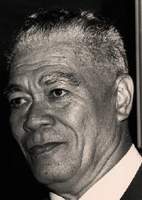
Taofifenua | 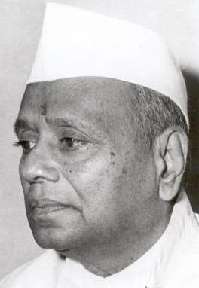
Tapase |
Taofifenua, Atelemo (b. May 10, 1927, Wallis island - d. July 5, 2005, Nouméa, New Caledonia), prime minister of `Uvea (Wallis) (1999-2000).
Tapase, Ganpatrao Devji (b. Oct. 30, 1908 [official date July 15, 1909], Satara [now in Maharashtra], India - d. Oct. 3, 1991), governor of Uttar Pradesh (1977-80) and Haryana (1980-84).
Tapgun, Fidelis (Naanmiap) (b. Nov. 1, 1945, Shendam [now in Plateau state], Nigeria), governor of Plateau (1992-93). He was also Nigerian ambassador to Kenya (2000-02) and minister of industry (2005-07).
Tapia Fonseca, Jorge Luis (b. 1964), a vice premier of Cuba (2019- ).
Tapia Valdés, Jorge (Antonio) (b. 1935 - d. June 30, 2020, Madrid, Spain), justice minister of Chile (1972). He was also minister of education (1972-73), ambassador to the Netherlands (1990-94) and Israel (1994-97), and intendant of Tarapacá (2000).
Tapias Pilonieta, Arturo (b. April 10, 1894, Charalá, Santander, Colombia - d. Sept. 4, 1973, Bogotá, Colombia), justice minister of Colombia (1946-47).
Tapie, Bernard (b. Jan. 26, 1943, Paris, France - d. Oct. 3, 2021, Paris), French politician. Better known as a businessman, he was city minister (1992, 1992-93).
Tapsell, Sir Peter (Wilfred) (b. Jan. 21, 1930, Rotorua, N.Z. - d. April 5, 2012, Ruatoria, N.Z.), internal affairs minister (1984-87) and defense minister (1990) of New Zealand; knighted 1997. He was also minister of police (1987-89), forestry and lands (1987-90), recreation and sport (1988-90), and science (1989-90) and speaker of the House of Representatives (1993-96).
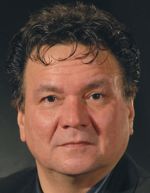
Taptuna |
Taptuna, Peter (b. 1956?, Cambridge Bay, N.W.T. [now in Nunavut]), premier of Nunavut (2013-17).
Taquary, José Antonio de Calazans Rodrigues, (2º) barão de (b. Aug. 27, 1805, Castelo de Vide, Portugal - d. May 27, 1876), president of Ceará (1871-72); son of Manoel Jorge Rodrigues, barão de Taquary. He became baron in 1871.
Taquary, Manoel Jorge Rodrigues, (1º) barão de (b. April 23, 1777, Lisbon, Portugal - d. May 14, 1845, Rio de Janeiro, Brazil), president of Pará (1835). He was made baron in 1845.
Taques, Benevenuto Augusto de Magalhães (b. Nov. 9, 1818, São Salvador da Bahia [now Salvador], Brazil - d. Oct. 17, 1881, Rio de Janeiro, Brazil), foreign minister of Brazil (1861-62). He was also president of Rio Grande do Norte (1849), Maranhão (1857), Pernambuco (1857-58), and Rio de Janeiro (1868-69).
Taques, José Pedro Gonçalves (b. March 15, 1968, Cuiabá, Mato Grosso, Brazil), governor of Mato Grosso (2015-19).
Tarabanov, Milko (Yanev) (b. Feb. 12, 1905, Harmanli, Bulgaria - d. Aug. 24, 1979), Bulgarian diplomat. He was minister to Italy (1948-50), ambassador to Czechoslovakia (1954-56), and permanent representative to the United Nations (1963-71).
Tarakanov, Fyodor (Gavrilovich) (b. Feb. 16, 1900, Kudymkar, Perm province [now in Perm kray], Russia - d. 1997), chairman of the Executive Committee of Komi autonomous oblast (1930-33).

Taraki |
Taraki, Nur Mohammad (b. July 15, 1917, Sur Kelay village, Muqur district, Ghazni province, Afghanistan - d. Oct. 9?, 1979, Kabul, Afghanistan), Afghan politician. He was a junior official in the press department of the Afghan government in the late 1940s, and press attaché at the Afghan embassy in Washington, D.C., in 1952-53. On returning to Kabul he worked as a translator for U.S. agencies and started his own translation bureau. In 1965 he founded the People's Democratic Party of Afghanistan, which split into two factions in 1967. After the overthrow of the monarchy in July 1973 by Sardar Mohammad Daud Khan, one faction, known as Parcham ("Banner"), supported the Daud regime while Taraki's Khalq ("Masses") faction opposed it. In 1977, however, the two factions, possibly under Soviet pressure, reunited, with Taraki as secretary-general. A noted writer, he held strong pro-Communist views, and the Daud government jailed him for a brief period. In 1978, with the help of Soviet-trained army units, he overthrew Daud, who was killed with all his family, and became president of the Revolutionary Council and prime minister. At the beginning of September 1979 he left for Havana to represent Afghanistan at a summit conference of nonaligned nations, leaving the government in the hands of Hafizullah Amin, who had been appointed prime minister some five months earlier. Returning via Moscow, Taraki was believed to have been advised by Soviet leader Leonid Brezhnev to get rid of Amin, whose anti-Islamic policy was considered dangerous. But he failed in this and was himself replaced by Amin on September 16, two days after a shootout in the presidential palace. It was speculated that Taraki had been killed; officially he was reported to have died "of the serious disease which he suffered for sometime past" on October 9.
Taran, Andriy (Vasylyovych) (b. March 4, 1955, Frankfurt an der Oder, East Germany), defense minister of Ukraine (2020-21). He was appointed ambassador to Slovenia in 2022.
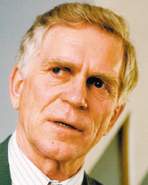
Tarand |
Tarand, Andres (b. Jan. 11, 1940, Tallinn, Estonia), prime minister of Estonia (1994-95). He was also minister of environment (1992-94).
Taranenko, Aleksey (Georgiyevich) (b. 1900, Vladimir volost, Tsaritsyn province [now in Volgograd oblast], Russia - d. 1960, Ulan-Ude, Buryat A.S.S.R., Russian S.F.S.R.), first secretary of the Communist Party committee of the Komi A.S.S.R. (1940-48). He was also first deputy premier (1951-55) and deputy premier (1955-60) of the Buryat-Mongol/Buryat A.S.S.R.
Taranupi, Muki (Samuel) (b. May 25, 1957), home affairs minister (1997) and defense minister (1999-2000) of Papua New Guinea. He was also minister of education (1997-99, 2001-02) and agriculture and livestock (2000-01).
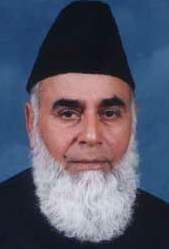
Tarar | 
Tarasenko |
Tarar, Mohammad Rafiq (b. Nov. 2, 1929, Pir Kot village, Ghakkar Mandi, Wazirabad tehsil, Punjab, India [now in Pakistan] - d. March 7, 2022, Lahore, Pakistan), president of Pakistan (1998-2001). In October 1966, he was appointed as Additional Sessions Judge. He was elevated to the Lahore High Court in 1974 and served as a member of the Election Commission of Pakistan from 1980 until his elevation as chief justice of the Lahore High Court on Dec. 13, 1989. He was elevated to the Supreme Court in January 1991. He retired in October 1994, and was elected as a senator in March 1997. He became president in 1998 after only 10 months in active politics. When Pervez Musharraf took power in a 1999 coup, Tarar was kept as figurehead until he was suddenly removed in 2001.
Tarasenko, Andrey (Vladimirovich) (b. Aug. 9, 1963, Vladivostok, Russian S.F.S.R.), acting governor of Primorsky kray (2017-18) and prime minister of Sakha (2020- ).
Tarasov, Mikhail (Petrovich) (b. 1899, Kamenka, Moscow province, Russia - d. 1970), chairman of the Presidium of the Supreme Soviet of the Russian S.F.S.R. (1950-59). He was also chairman of the Supreme Soviet of the Russian S.F.S.R. (1947-51).
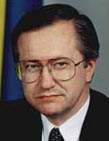
Tarasyuk |
Tarasyuk, Borys (Ivanovych) (b. Jan. 1, 1949, Dzerzhinsk, Zhitomir oblast, Ukrainian S.S.R.), foreign minister of Ukraine (1998-2000, 2005-07). He was also ambassador to the Benelux countries (1995-98) and Ukraine's representative at NATO (1997-98).
Tarawneh, Ahmad (Mahmud) (b. 1920, Karak, Transjordan [now Jordan] - d. Aug. 8, 1998, Karak), finance minister (1958-59), defense minister (1959-60), and interior minister (1972-73) of Jordan. He was also minister of agriculture (1950-51, 1952-54), commerce (1950-51), communications and public works (1954), education (1957-58), and justice (1960), chief of the royal court (1960-61, 1970-72), president of the National Consultative Council (1980-82), and president of the Senate (1983-84).
Tarawneh, Ahmad Abdul Karim (b. 1931, Mazar, Karak province, Transjordan [now Jordan]), interior minister (1973) and justice minister (1976-79, 1980-85) of Jordan; son-in-law of Fadel al-Dalgamouni.
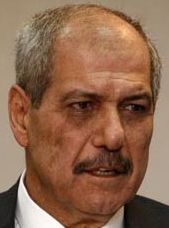
F. Tarawneh |
Tarawneh, Fayez (Ahmad), Arabic Fa´iz Ahmad Tarawna (b. May 1, 1949, Amman, Transjordan [now Jordan] - d. Dec. 15, 2021, Amman), prime minister of Jordan (1998-99, 2012); son of Ahmad Tarawneh. In 1988-89 he was minister of supply. He was one of Jordan's main negotiators in talks which led to its 1994 peace treaty with Israel. He served as Jordan's ambassador to the U.S. from 1993 until being made foreign minister in 1997. In February 1998 he was appointed chief of the royal court, a key position which King Hussein had used in the past to groom future premiers. In August 1998 Tarawneh was indeed made prime minister. In January 2000 he was reappointed chief of the royal court, serving until March 2003, and he held the position again from January 2013 to June 2018.
Tarazevich, Georgy (Stanislavovich) (b. July 17, 1937, Myadel, Minsk oblast, Belorussian S.S.R. - d. March 21, 2003, Minsk, Belarus), chairman of the Presidium of the Supreme Soviet of the Belorussian S.S.R. (1985-89). He was also mayor (1980-83) and first secretary of the party committee (1983-85) of Minsk city and Belarusian ambassador to Poland (1994-95).
Tarazi, Salah al-Din (b. 1917, Damascus, Ottoman Empire [now in Syria] - d. [traffic accident] Oct. 4, 1980, The Hague, Netherlands), Syrian diplomat. He was ambassador (for the United Arab Republic in 1958-61) to the Soviet Union (1957-58, 1965-70), Czechoslovakia (1958-59), China (1960-62), and Turkey (1970-74) and permanent representative to the United Nations (1962-64).
Tarchiani, Alberto (b. Nov. 1, 1885, Rome, Italy - d. Nov. 30, 1964, Rome), Italian politician. He was minister of public works (1944) and ambassador to the United States (1945-55).
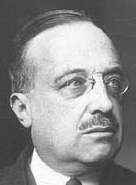
Tardieu |
Tardieu, André (Pierre Gabriel Amédée) (b. Sept. 22, 1876, Paris, France - d. Sept. 15, 1945, Menton, Alpes-Maritimes, France), prime minister of France (1929-30, 1930, 1932). He joined the diplomatic service but left it to become a journalist, making his reputation as chief political editor (from 1905) of Le Temps. In 1914, just before the outbreak of World War I, he was elected to the Chamber of Deputies. He insisted that he wanted active service with a combat unit and served with distinction in the light infantry until 1916. In 1917-18 he was head of the French War Commission in the U.S. One of the five French representatives at the Paris peace conference, he drafted significant parts of the Treaty of Versailles. Under Georges Clemenceau he was minister for the Liberated Areas (Alsace-Lorraine) briefly in 1919-20, but after Clemenceau's retirement he refused to enter any government until 1926. Both in the Chamber and in the press, he uncompromisingly opposed any relaxation of the Versailles treaty's punitive provisions against Germany; he acclaimed the invasion of the Ruhr with enthusiasm. He lost his parliamentary seat in the elections of 1924 but recovered it in 1926. He served as minister of public works (1926-28) and interior (1928-30, 1930) and, as the leader of the right-centre in the Chamber, became premier. He was minister of agriculture (1931-32) and of war (1932) under Pierre Laval before his third term as premier, during which he served also as foreign minister. He was defeated in the general elections in 1932. In 1934 he was a minister of state. Finally, he retired from active politics in 1936. For years he proposed a reform of the constitution that would strengthen the executive against the legislature; some of his ideas were later adopted by the Fifth Republic.
Tardini, Domenico Cardinal (b. Feb. 29, 1888, Rome, Italy - d. July 30, 1961, Vatican City), Vatican secretary of state (1952-61). He was ordained on Sept. 20, 1912. After nine years as a theology professor at the Roman seminary he was named a consultor of the Congregation of Sacraments in December 1920, and the following year was made a clerk in the Congregation for Extraordinary Ecclesiastical Affairs. In March 1922 he became a papal chamberlain. In 1929 he was made a domestic prelate and promoted to the post of undersecretary of the Congregation for Extraordinary Affairs. Elected a member of the Pontifical Academy of St. Thomas Aquinas and the Catholic Religion in 1932, he was appointed to membership on the Pontifical Commission for Russia in 1933 and later became its president. Named consultor to the Sacred Congregation for the Oriental Church in 1934, he was promoted to substitute secretary of state for ordinary affairs and made secretary of the Pontifical Commission for the Interpretation of the Code of Canon Law in 1935. Two years later he was named secretary for extraordinary affairs and secretary of the Sacred Congregation for Extraordinary Affairs. In 1952 he was appointed pro-secretary of state for extraordinary affairs and in 1958 pro-secretary of state and later secretary of state. After refusing a red hat in 1953 he was elevated to the College of Cardinals on Nov. 17, 1958.
Tardy de Montravel, Louis (Marie François) (b. Sept. 28, 1811, Vincennes, Seine [now in Val-de-Marne], France - d. Oct. 4, 1864, Elbeuf, Seine-Inférieure [now Seine-Maritime], France), commandant of New Caledonia (1854) and governor of French Guiana (1859-64).
Tareo, Rina M., Marshall Islands diplomat. She was chargé d'affaires at the United Nations (2007-08).
Tarfa, Paul (Chabri) (b. Aug. 6, 1941, Garkida [now in Adamawa state], Nigeria), administrator of Oyo (1978-79).
Tariki, Abdullah (ibn Hamoud) (b. March 19, 1919, Zilfi, Saudi Arabia - d. Sept. 7, 1997, Cairo, Egypt), Saudi oil minister (1960-62).
Tarin, Shaukat (Fayaz Ahmad), also spelled Tareen (b. Oct. 1, 1953, Multan, Pakistan), finance advisor (2008-09) and finance minister (2009-10, 2021-22) of Pakistan.
Tariq ibn Taimur (al-Sa`id), (Sayyid) (b. June 30, 1921, Bombay [now Mumbai], India - d. 1980), prime minister of Oman (1970-72); brother of Sa`id ibn Taimur.
Tarjanne, Pekka (Johannes) (b. Sept. 19, 1937, Stockholm, Sweden - d. Feb. 24, 2010, Hattula, Finland), secretary-general of the International Telecommunication Union (1989-99); son of a cousin of Toivo Tarjanne. He was also Finnish minister of communications (1972-75).
Tarjanne, Toivo, original surname (until 1906) Törnqvist (b. Feb. 8, 1893, Helsingfors [now Helsinki], Finland - d. Aug. 23, 1988), governor of Vaasa (1943-44). He was also Finnish chancellor of justice (1944-50) and president of the Supreme Court (1950-63).
Tarkhan, Ilyas (Umerovich) (b. 1900, Kobrek, Tavrida province, Russia - d. [executed] April 17, 1938, Simferopol, Crimean A.S.S.R., Russian S.F.S.R.), chairman of the Central Executive Committee of the Crimean A.S.S.R. (1931-37).
Tarkhan-Mouravov, Konstantin (Davydovich) (b. 1811 - d. Feb. 18 [Feb. 6, O.S.], 1869), governor of Shemakha/Baku (1857-63).
Tarkil, Said (Rodionovich) (b. May 15, 1951), acting foreign minister of Abkhazia (1993).

Tarlev |
Tarlev, Vasile (Petru) (b. Oct. 9, 1963, Bascalia, Basarabeasca district, Moldavian S.S.R.), prime minister of Moldova (2001-08).
Tarmidi, Bianrifi (b. March 15, 1958), prime minister of the Comoros (1999-2000). He has also been a presidential candidate (2010) and minister of economy and investments (2018-19), maritime and air transport (2019-20), agriculture, fisheries, and environment (2020-21), and posts, telecommunications, and digital economy (2021- ).
Tarnowski, Adam (b. March 2, 1892, Jakubów, Poland - d. May 9, 1956, Dartford, England), foreign minister of Poland in exile (1944-49). He was also minister to Bulgaria (1930-40).

Tarradellas |
Tarradellas i Joan, Josep, marqués de Tarradellas (b. Feb. 19, 1899, Cervelló, Spain - d. June 10, 1988, Barcelona, Spain), Catalan political leader. A militant in a labour movement in Barcelona at age 15 and secretary of nationalist propaganda for a trade union at 17, he was one of the founders of the Republican Left Party of Catalonia in 1931. He held various posts in the Catalan Generalitat (its institution of self-government), including president of the Executive Council (1936-37) and finance councillor (1936-39). After Gen. Francisco Franco captured Barcelona and abolished the Generalitat, Tarradellas fled Spain (Feb. 9, 1939), vowing never to set foot in the country until Catalonian autonomy had been restored. During the first years of his exile in France, he was arrested at least 14 times by the Nazi Gestapo and the French police. In 1941 Franco requested his extradition from Nazi-occupied France, but because of a bureaucratic error Tarradellas managed to cross the French border into Switzerland. He was interned in Switzerland and later freed under the protection of the Mexican embassy. He again became president of the Executive Council in 1952, and he was elected president of the Generalitat by the surviving deputies gathered in Mexico City in 1954. Tarradellas moved to Saint-Martin-le-Beau near Tours, France, in 1956 and remained there until 1977. After Franco's death (1975) he refused to return to Spain until the Generalitat was restored. Upon his triumphal return to Barcelona Oct. 23, 1977, he stood on the balcony of the Generalitat assembly building and shouted in Catalan: "Ja sóc aquí!" ("Now I'm here!"). He was confirmed as president of the Generalitat, and in 1979 Catalonia received its statute of autonomy. He retired from politics in 1980 and was made marquess in 1986.
Tarraf, Nureddin (b. 1910 - d. May 23, 1995), chairman of the Executive Council of the Egyptian Region (1958-60). He was also Egyptian minister of communications (1952) and health (1952-58, 1961) and a deputy prime minister (1964-65).
Taruta, Serhiy (Oleksiyovych) (b. July 23, 1955, Vinogradne [Vynohradne], Donetsk oblast, Ukrainian S.S.R.), Ukrainian politician. He was governor of Donetsk oblast (2014) and a minor presidential candidate (2019).
Taseer, Salman, also spelled Salmaan (b. May 31, 1944, Simla [now Shimla, Himachal Pradesh], India - d. [assassinated] Jan. 4, 2011, Islamabad, Pakistan), governor of Punjab (Pakistan) (2008-11).
Tashenev, Zhumabek (Akhmetovich) (b. March 20 [March 7, O.S.], 1915, Tanagul, Akmolinsk oblast, Russia [now in Akmola oblast, Kazakhstan] - d. Nov. 18, 1986, Chimkent, Kazakh S.S.R. [now Shymkent, Kazakhstan]), chairman of the Presidium of the Supreme Soviet of the Kazakh S.S.R. (1955-60). He was also chairman of the Executive Committee of Severo-Kazakhstan oblast (1948-52) and first secretary of the party committee of Aktyubinsk oblast (1952-55).
Tashibekova, Dzhamal (Chuybekovna) (b. Aug. 27, 1937), foreign minister of the Kirgiz S.S.R. (1980-86).
Tashkulov, Akbar (Dzhurabayevich) (b. Sept. 21, 1971, Dzhizak rayon, Dzhizak oblast, Uzbek S.S.R.), justice minister of Uzbekistan (2022- ). He was also rector of Tashkent State University of Law (2021-22).
Tasker, Benjamin (b. 1690, Calvert county, Maryland - d. June 19, 1768, Annapolis, Maryland), mayor of Annapolis (1721-22, 1726-27, 1750-53, 1756-57) and acting governor of Maryland (1752-53).
Tasker, Benjamin, Jr. (b. Feb. 25, 1721 [Feb. 14, 1720, O.S.], Annapolis, Maryland - d. Oct. 17, 1760), mayor of Annapolis (1754-55); son of Benjamin Tasker; brother-in-law of Samuel Ogle.
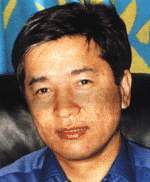
Tasmagambetov |
Tasmagambetov, Imangali (Nurgaliyevich) (b. Dec. 9, 1956, Novobogat village, Makhambet district, Guryev [now Atyrau] oblast, Kazakh S.S.R.), prime minister (2002-03) and defense minister (2014-16) of Kazakhstan. He was also a deputy prime minister (1995-97, 2000-02, 2016-17), minister of education and culture (1997), head of Atyrau oblast (1999-2000), Almaty city (2004-08), and Astana city (2008-14), head of the administration of the president (2004), and ambassador to Russia (2017-19).
Tasnádi Nagy, András, also spelled Tasnády-Nagy (b. Jan. 29, 1882, Budapest, Hungary - d. July 1, 1956, Budapest), justice minister of Hungary (1938-39). He was also speaker of the House of Representatives (1939-45).
Tasovski, Slobodan (b. July 9, 1954), Macedonian diplomat. He was chargé d'affaires in the Netherlands (2007-08), permanent representative to the United Nations (2008-11), and ambassador to India (2011-14).
Tasso, Takuya (b. June 10, 1964, Morioka, Japan), governor of Iwate (2007- ).
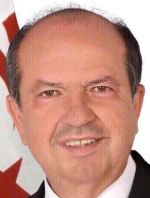
Tatar |
Tatar, Ersin (b. 1960, Nicosia, Cyprus), finance minister (2009-13), prime minister (2019-20), and president (2020- ) of North Cyprus. He was leader of the National Unity Party in 2018-20.
Tatarashvili, Shota (Mikhailovich) (b. 1922, Tiflis, Georgian S.S.R. [now Tbilisi, Georgia] - d. August 1975), chairman of the Council of Ministers of the Abkhaz A.S.S.R. (1973-75). He was also minister of rural construction of the Georgian S.S.R.
Tatarescu, Gheorghe (I.), byname Guta Tatarescu (b. Dec. 22, 1886, Craiova, Romania - d. March 28, 1957, Bucharest, Romania), prime minister (1934-37, 1939-40), foreign minister (1934, 1938, 1945-47), defense minister (1934), army minister (1934-37), interior minister (1937, 1939), and deputy premier (1945-47) of Romania.
Tatarinov, Stepan (Petrovich) (b. 1782 - d. Feb. 1 [Jan. 20, O.S.], 1847, Omsk, Russia), governor of Tomsk (1840-47).
Tatarinov, Valerian (Alekseyevich) (b. Aug. 28 [Aug. 16, O.S.], 1816, Golopyorovo, Vladimir province, Russia - d. Feb. 25 [Feb. 13, O.S.], 1871, St. Petersburg, Russia), Russian state comptroller (1863-71).

Tate |
Tate, William (b. Yorkshire, England), president of the States of Alderney (2019- ).
Tatham, David E(verard) (b. June 28, 1939), governor of the Falkland Islands (1992-95). He was also British ambassador to Yemen (Sana) (1984-87), Lebanon (1990-92), and the Maldives (1996-99) and high commissioner to Sri Lanka (1996-99).
Tatishchev, Graf Aleksandr (Ivanovich) (b. Aug. 8, 1763 - d. June 17, 1833), war minister of Russia (1823-27). He was made Graf (count) in 1826.
Tatishchev, Graf Dmitry (Nikolayevich) (b. Dec. 22, 1867, St. Petersburg, Russia - d. [shot] Aug. 17, 1919, Moscow, Russia), governor of Lomza (1907-09) and Yaroslavl (1909-15); grandson of cousin of Graf Aleksandr Tatishchev.
Tatishchev, Dmitry (Pavlovich) (b. 1767 - d. Sept. 16, 1845, Vienna, Austria), Russian diplomat; grandson of Yakov Arshenevsky; nephew of Ilya Arshenevsky, Nikolay Arshenevsky, and Pyotr Arshenevsky. He was minister to Sicily (1802-03, 1805-08) and the Netherlands (1821-22) and ambassador to Spain (1815-21) and Austria (1826-41).
Tatishchev, Graf Sergey (Sergeyevich) (b. July 25, 1872 - d. March 29, 1915), governor of Vilna (acting, 1905-06) and Saratov (1906-11); brother of Graf Vladimir Tatishchev; cousin of Graf Dmitry Tatishchev; great-grandson of Pyotr Zheltukhin.
Tatishchev, Graf Vladimir (Sergeyevich) (b. April 11 or May 11, 1865 - d. Aug. 28, 1928), finance minister of Crimea (1918).
Tatiyev, Ruslan (Mazhitovich) (b. July 26, 1955, Alma-Ata [now Almaty] oblast, Kazakh S.S.R. - d. Dec. 11, 2020), prime minister of Ingushetia (1993).
Tatliyev, Suleiman (Bayram ogly) (b. Feb. 27, 1925, Dag Kesemen, Azerbaijan S.S.R. - d. March 9, 2014), chairman of the Presidium of the Supreme Soviet of the Azerbaijan S.S.R. (1985-89). He was also first deputy premier (1978-85).
Tattenbach, Franz (Ludwig Wilhelm) Graf von (b. Sept. 13, 1886, Frankfurt am Main, Germany - d. Feb. 21, 1974, San José, Costa Rica), German diplomat. He was chargé d'affaires in Guatemala (1922-24) and minister to Venezuela (1932-37).
Tattenbach Yglesias, Christian (Franz Rafael) (b. Jan. 10, 1924, San José, Costa Rica - d. 2007), interior minister of Costa Rica (1966-70); son of Franz Graf von Tattenbach. He was also ambassador to Guatemala (1951-53) and Nicaragua (1953), president of the Legislative Assembly (1981-82), and permanent representative to the United Nations (1990-94).
Taube, Arvid Fredrik greve (b. Jan. 19, 1853, Lossa, Uppsala, Sweden - d. Oct. 14, 1916, Alingsås, Älvsborg [now in Västra Götaland], Sweden), foreign minister of Sweden (1909-11). He was also minister to Germany (1900-09, 1912-16).
Taube, Didrik Henrik greve (b. Sept. 24, 1711, Karlskrona, Blekinge, Sweden - d. Feb. 17, 1781, Mem, Östergötland, Sweden), governor of Gotland (1757-63) and Göteborg och Bohus (1763-72).
Taube, Gustaf Adam greve, formerly Gustaf Adam friherre Taube af Kudding (b. Dec. 1, 1673 - d. Oct. 14, 1732, Stockholm, Sweden), governor of Stockholm city (1714-32). He was made greve (count) in 1719.
Taube, Baron Maksim (Antonovich) (b. Jan. 6, 1827 [Dec. 25, 1826, O.S.], Livonia province, Russia - d. June 25 [June 12, O.S.], 1910, Pavlovsk, St. Petersburg province, Russia), governor-general of the Steppes (1889-1900).
Taube, Baron Mikhail (Aleksandrovich) (b. May 27 [May 15, O.S.], 1869, Pavlovsk, Russia - d. Nov. 29, 1961, Paris, France), acting education minister of Russia (1914-15).
Taube, Otto Fredrik (b. Dec. 27, 1832, Norrköping, Östergötland, Sweden - d. Jan. 11, 1906, Stockholm, Sweden), war minister of Sweden (1880-82).
Taube af Odenkat, Evert Wilhelm friherre (b. Sept. 8, 1737, Vassbotten, Sweden - d. Aug. 15, 1799, Karlsbad, Austria [now Karlovy Vary, Czech Republic]), acting chancellery president of Sweden (1792); nephew of Wilhelm Ludvig friherre Taube af Odenkat.
Taube af Odenkat, Wilhelm Ludvig friherre (b. July 10, 1690, Örebro, Sweden - d. Aug. 8, 1750), governor of Blekinge (1741-46).
Taubira, Christiane (Marie), former married name Christiane Taubira-Delannon (b. Feb. 2, 1952, Cayenne, French Guiana), justice minister of France (2012-16).

Taufa'ahau |
Taufa'ahau Tupou IV (b. July 4, 1918, Nuku'alofa, Tonga - d. Sept. 10, 2006, Auckland, New Zealand [Sept. 11, Tonga time]), king of Tonga (1965-2006). The eldest of Queen Salote's three sons, he was named Siaosi Taufa'ahau Tupoulahi and became known as Crown Prince Tupouto'a Tungi (assuming the title of Tungi after the death of his father Uiliame Tupoulahi Tungi in 1941). He was the first Tongan king to receive a Western university education, and he was the first Tongan to gain a university degree, a B.A. and LL.B. from the University of Sydney. Before he became king, he was appointed by Queen Salote as minister of education in 1943, and in 1944 he became minister of health, then in 1949 he became premier. When Queen Salote died in 1965, Taufa'ahau became king. Tonga, which had become a British protectorate in 1905, achieved full independence in 1970 during his rule. Taufa'ahau and Queen Mata'aho had four children, the eldest being Crown Prince Tupouto'a, followed by their only daughter Princess Pilolevu, their second son Ma'atu, and third son Prince Lavaka Ata 'Ulukalala. All the royal children married, except for the heir to the throne. The king was a lay preacher of the Free Wesleyan Church, and held a special position in the church. Under certain circumstances he had the right to appoint an acting president of the church. A keen sportsman in his youth, the king enjoyed going out on exercise with members of the Royal Guard. He made international headlines in 1976 when he became the world's heaviest monarch, tipping the Tonga airport scales, the only scales in the country that could hold him, at 209 kg. Obesity was a major problem in the island kingdom. The last decade of his reign witnessed a series of financial scandals and increasingly louder demands for democratic reform.
Tauguinas, Rolando (José) (b. Oct. 25, 1929, Presidencia Roque Sáenz Peña, Chaco, Argentina - d. June 22, 2012, Resistencia, Chaco), governor of Chaco (1991-95).
Taulelle, Jean (Paul Auguste) (b. April 15, 1914, Alès, Gard, France - d. April 22, 1999, Paris, France), prefect of Paris département (1974-77). He was also prefect of Sétif (1960-61), Bône (1961-62), Dordogne (1962-67), Saône-et-Loire (1968-72), Hérault (1972-73), and Seine-Maritime (1973-74).
Taumoepeau Tupou, Sonatane Tu'a(kinamolahi), (from 2011) Lord Taumoepeau Tupou of Toula and Kotu (b. March 14, 1943, Nuku'alofa, Tonga - d. Aug. 13, 2013, Nuku'alofa), foreign minister (2004-09) and acting defense minister (2005-09) of Tonga. From 1983 to 1986 he was Tonga's high commissioner to the United Kingdom and was also accredited as ambassador to Belgium, Denmark, France, West Germany, Italy, Luxembourg, the Netherlands, the Soviet Union, the United States, the European Commission, and the European Economic Community. In January 2000 he became the kingdom's first permanent representative to the United Nations, being also accredited in April 2000 as ambassador to the United States, Mexico, and Chile, and high commissioner to Canada, and in February 2004 also as ambassador to Cuba. After serving as minister, he again became permanent representative to the United Nations in 2009, also accredited to Canada, Chile, Cuba, Mexico, the United States, and Venezuela. He was also acting governor of Vava'u (2005-09). He was made a life peer in 2011.
Taunay, Alfredo (Maria Adriano) de Escragnole Taunay, visconde de (b. Feb. 22, 1843, Rio de Janeiro, Brazil - d. Jan. 25, 1899, Rio de Janeiro), president of Santa Catarina (1876-77) and Paraná (1885-86). He was made viscount in 1889.
Tauran, Jean-Louis (Pierre) Cardinal (b. April 5, 1943, Bordeaux, France - d. July 5, 2018, Hartford, Conn.), Vatican foreign minister (1990-2003). He became cardinal in 2003. From 2014 he was chamberlain.
Tauschitz, Stephan (b. July 9, 1889, Hörtendorf, near Klagenfurt, Austria - d. March 29, 1970, Klagenfurt), foreign minister of Austria (1934). He was also minister to Germany (1933-38), minister (1950-53) and ambassador (1953-54) to Argentina, and minister to Greece (1954-55).
Tausinga, Job Duddley (b. July 18, 1951, Tamaneke village, New Georgia Island, Western Province, Solomon Islands), foreign minister of the Solomon Islands (1992-93). He was also deputy prime minister and minister for forestry, environment, and conservation (2006) and minister for education and human resources development (2007-08).
Tautiyev, Boris (Abdul-Begir Gasanovich) (d. [executed] 1937), first secretary of the Communist Party committee of the South Ossetian autonomous oblast (1936?-37).
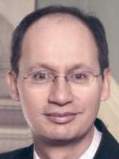
Tauwhare |
Tauwhare, Richard (David) (b. Nov. 1, 1959), governor of the Turks and Caicos Islands (2005-08).
Tavadze, Iliya (Kaysarovich) (b. Dec. 26, 1905 - d. after 1964), Soviet politician. He was people's commissar/minister of state control of the Georgian S.S.R. (1943-46) and was appointed Soviet minister to Syria and Lebanon (1950; did not take up the post).
Tavani, Vincenzo Calenda, barone di (b. Feb. 8, 1830, Nocera Inferiore, Two Sicilies [Italy] - d. Nov. 4, 1910, Nocera Inferiore), justice minister of Italy (1893-96).
Tavares, Álvaro Rodrigues da Silva (b. Feb. 3, 1915, Ponta do Sol, Santo Antão, Cape Verde [now Cabo Verde] - d. Sept. 24, 2011), governor of Portuguese Guinea (1957-58) and Angola (1960-61).
Tavares, Aurélio de Lyra (b. Nov. 7, 1905, Paraíba [now João Pessoa], Paraíba, Brazil - d. Nov. 18, 1998, Rio de Janeiro, Brazil), army minister (1967-69) and member of the military junta (1969) of Brazil; brother of Paulo de Lyra Tavares; nephew of Augusto Tavares de Lyra. He was also head of the military cabinet (1961-62, 1963) and ambassador to France (1970-74).
Tavares, Bernardino de Távora de Sousa (b. 16... - d. 1702), governor of Angola (1701-02).
Tavares, Francisco da Silva (b. Aug. 5, 1844, Bagé, Rio Grande do Sul, Brazil - d. Nov. 18, 1901, Bagé), acting president of Rio Grande do Sul (1890).
Tavares, João Maria Loureiro (b. July 9, 1844, Japaratuba, Sergipe, Brazil - d. June 14, 1910, Propriá, Sergipe), acting president of Sergipe (1906).
Tavares, Joaquim Villela de Castro (b. Feb. 2, 1816, Recife, Pernambuco, Brazil - d. March 11, 1858, Recife), president of Ceará (1853-54).
Tavares, José de Medeiros (b. Nov. 3, 1932, Junqueiro, Alagoas, Brazil - d. April 27, 2003, Maceió, Alagoas), governor of Alagoas (1986-87).
Tavares, José Reinaldo Carneiro (b. 1939, São Luís, Maranhão, Brazil), governor of Maranhão (2002-07). He was also minister of transport (1986-90).
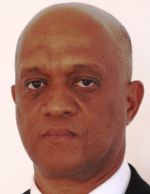
L.F. Tavares |
Tavares, Luís Filipe (Lopes) (b. Aug. 25, 1965, Praia, Cape Verde [now Cabo Verde]), foreign and defense minister of Cabo Verde (2016-21).
Tavares, Paulo de Lyra (b. Jan. 8, 1901, Recife, Pernambuco, Brazil - d. Dec. 28, 1959, Rio de Janeiro, Brazil), acting finance minister of Brazil (1944); nephew of Augusto Tavares de Lyra. He was also head of the civil cabinet (1955-56).
Tavares, Pedro Augusto, Junior (b. Aug. 30, 1858, Campos, Rio de Janeiro, Brazil - d. July 9, 1934, Rio de Janeiro, Brazil), president of Maranhão (1889-90).
Taveras Guzmán, Juan Arístides, byname Títole (b. Nov. 24, 1936, Moca, Dominican Republic - d. Oct. 4, 2017, Santo Domingo, Dominican Republic), foreign minister of the Dominican Republic (1991-94). He was also permanent representative to the United Nations (1987-89).
Tavernier, Jean (Francis Louis) (b. March 6, 1928, Algiers, Algeria - d. Nov. 28, 2020, Bordeaux, France), president of the Regional Council of Aquitaine (1988-92).

Taviani | 
Tavola |
Taviani, Paolo Emilio (b. Nov. 6, 1912, Genoa, Italy - d. June 18, 2001, Rome, Italy), defense minister (1953-58), finance minister (1959-60), and interior minister (1962-63, 1963-68, 1973-74) of Italy. He was also minister of foreign trade (1953), treasury (1960-62), Mezzogiorno development (1968-73), and budget and economic planning (1972-73).
Tavola, Kaliopate (b. Oct. 10, 1946, Dravuni island, Fiji), foreign minister of Fiji (2000-06). He was also ambassador to Belgium, Luxembourg, the Netherlands, France, Italy, Spain, Portugal, and Greece (1988-98).
Távora, Francisco de Assis, marquês de, in full Francisco de Assis de Távora, 3º marquês de Távora, 3º conde de Alvor (b. Oct. 7, 1703 - d. Jan. 13, 1759), viceroy of Portuguese India (1750-54). He was conde de Alvor by descent and marquês de Távora iure uxoris. He was executed with his entire family for conspiring to assassinate King José I.
Távora, Juarez do Nascimento Fernandes (b. Jan. 14, 1898, Jaguaribemirim [now Jaguaribe], Ceará, Brazil - d. July 18, 1975, Rio de Janeiro, Brazil), Brazilian politician; brother of Manoel do Nascimento Fernandes Távora. He was minister of transport and public works (1930, 1964-67) and agriculture (1932-34), chief of the military cabinet (1954-55), and a presidential candidate (1955).
Távora, Manoel do Nascimento Fernandes (b. March 21, 1877, Jaguaribemirim [now Jaguaribe], Ceará, Brazil - d. Sept. 23, 1973, Fortaleza, Ceará), federal interventor in Ceará (1930-31).
Távora, Virgílio de Moraes Fernandes (b. Sept. 29, 1919, Fortaleza, Brazil - d. June 3, 1988, São Paulo, Brazil), governor of Ceará (1963-66, 1979-82); son of Manoel do Nascimento Fernandes Távora. He was also Brazilian minister of transport and public works (1961-62).
Tawéma, Daniel (b. Dec. 31, 1947, Matéri, northwestern Dahomey [now Benin]), foreign minister (1989-90) and interior minister (1998-2003, 2003-05) of Benin. He was a presidential candidate in 2006, but won only 0.6% of the vote.

Tawfiq |
Tawfiq Pasha (ibn Ismail ibn Ibrahim ibn Muhammad Ali), Muhammad, also spelled Mohammed Tewfik Pasha (b. April 30, 1852, Cairo, Egypt - d. Jan. 7, 1892, Hulwan, Egypt), khedive of Egypt (1879-92); son of Ismail Pasha. He was prime minister for a few weeks in 1879 during the crisis which precipitated the deposition of Ismail Pasha. Summoned by the Ottoman sultan to succeed his father, he adopted a cooperative, if passive, attitude toward Anglo-French control of Egyptian state finances. Nationalist opposition to foreign influence increased from September 1881 when he faced a military mutiny. Having little domestic support, he was forced in February 1882 to accept a Nationalist ministry with Arabi Pasha as minister of war. Tawfiq Pasha's position in the capital having become intolerable, he retired to Alexandria where he stayed during the disorders and British naval bombardment in July. Arabi's popular support increased, and Tawfiq was forced to seek the protection of the British, who invaded Egypt in August and returned him to authority; on September 25 he returned to Cairo. Relying solely on the advice of Sir Evelyn Baring (later Earl of Cromer), the British representative, he acquiesced in the British occupation and in 1884 reluctantly agreed to the British request for Egyptian withdrawal from the Sudan. Tewfik Pasha took a special interest in irrigation, education, and justice. He showed little desire to keep up the unapproachable state of an Oriental ruler, and in many ways his manners were less Oriental than European. He was a strong advocate of monogamy.

Tax |
Tax, Stergomena Lawrence (b. July 6, 1960, Magu district, Mwanza region, Tanganyika [now in Tanzania]), executive secretary of the Southern African Development Community (2013-21) and defense minister (2021-22) and foreign minister (2022- ) of Tanzania.
Taxell, (Lars Evald) Christoffer (b. Feb. 14, 1948, Turku, Finland), justice minister of Finland (1979-87). He was also chairman of the Swedish People's Party (1985-90) and minister of education (1987-90).
Tay Son brothers, collective name (derived from their home village, Tay Son, central Vietnam) for Nguyen Hue (b. c. 1752 - d. Sept. 15, 1792), Nguyen Nhac (b. c. 1752 - d. Dec. 16, 1793), and Nguyen Lu (b. c. 1752 - d. 1792), Vietnamese rulers. In 1771 the brothers began an insurrection in their home region, supported largely by peasants; ultimately, in what became known as the Tay Son rebellion, they overthrew the imperial Le dynasty as well as the two rival feudal houses of the Nguyen in the south and the Trinh in the north. Led by Nguyen Hue (later Emperor Quang Trung), the youngest and most gifted of the brothers, they took the coastal city of Qui Nhon (1774), made a temporary alliance with the Trinh (1775) to defeat the Nguyen (1776-77), became dominant in central and southern Vietnam, defeated a large Siamese army (1785), and finally overcame the Trinh in the north (1786-87). The brothers each governed a portion of Vietnam. In 1788 the Le dynasty called on the Chinese to help expel the Tay Son, and Chinese troops were deployed to Vietnam for the first time since 1406. Nguyen Hue, who ruled in the north, formally declared the Le deposed and proclaimed himself emperor; he built a large army and, in 1789, drove the Chinese back into China. However, the reforms initiated by the brothers did not attack the fundamental problems of land ownership, causing disillusionment among their followers. After Nguyen Hue's death, he was succeeded by his 10-year-old son, under whom the country was unified in 1793, but the movement quickly lost its strength, and Nguyen Anh (later Emperor Gia Long), the last surviving member of the Nguyen dynasty, with the help of French armaments, ended the Tay Son rule in 1802.
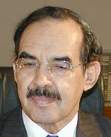
M. Taya |
Taya, Maaouya Ould Sid'Ahmed, Arabic Mu`awiya walad Sayyidi Ahmad Taya` (b. 1941, Atar, northeastern Mauritania), president of Mauritania (1984-2005). He joined the army after high school and rose through the ranks. In 1974, he went to Paris for two years of study at a military staff college, returning to become army chief of staff. When the army ousted the civilian government, Taya became defense minister (1978-79). In 1981 the ruling military council made him prime minister and defense minister, but fear of destabilization from Morocco prompted his dismissal in March 1984. In December 1984 Colonel Taya, seen as sympathetic to Morocco, seized power from Mohamed Khouna Ould Haidalla in a bloodless coup. He promised to install democracy, but said his plans were delayed by student unrest, an upsurge of protests by a black minority charging oppression by the dominant Moors, and alleged coup attempts. Opponents said Taya invented the coup plots as pretexts to eliminate possible rivals and that he purged the army of strong officers, leaving it with ineffective commanders unlikely to challenge him. Finally, in 1992, he won the country's first multiparty presidential election, condemned by the opposition as fraudulent. The 1997 election was boycotted by the opposition. In 2003 he defeated Haidalla and other challengers, who denounced the vote as an "electoral masquerade." He was strongly criticized by many Mauritanians for allying his overwhelmingly Muslim nation with the United States in the "war on terror" and for opening full diplomatic relations with Israel in 1999, one of only three Arab League nations to do so. Overthrown on Aug. 3, 2005, while he was in Saudi Arabia attending the funeral of King Fahd, he went first to Niger, then left for The Gambia on August 9 and on August 21 for Qatar where he was given political asylum.
Taya, Sid'Ahmed Ould (b. 1936, Atar, Mauritania), Mauritanian diplomat. He was ambassador to Algeria (1967-69) and permanent representative to the United Nations (1970-71).
Tayan, Turhan (b. Oct. 19, 1943, Bursa, Turkey), defense minister of Turkey (1996-97). He was also minister of education (1995-96).
Taybekov, Elubay (Bazimovich) (b. May 1, 1901, Sabyndy, Russia [now in Akmola oblast, Kazakhstan] - d. Jan. 19, 1991), chairman of the Council of Ministers of the Kazakh S.S.R. (1954-55). He was also first secretary of the party committees of Aktyubinsk (1944-48) and Akmolinsk (1950-51) oblasti and chairman of the Executive Committee of Vostochno-Kazakhstan oblast (1955-58).
Taye Atske-Selassie (Amde), Ethiopian diplomat. He was ambassador to Egypt (2017-18) and permanent representative to the United Nations (2018-23).
Taylhardat (Sotillo), Adolfo (Raúl) (b. May 6, 1934, La Victoria, Venezuela - d. July 9, 2017), Venezuelan diplomat. He was ambassador to Haiti (1973-74), Cuba (1975-78), Austria (1981-85), and France (1991-93) and permanent representative to the United Nations (1993-94).
Taylor, Alfred A(lexander) (b. Aug. 6, 1848, Happy Valley, Tenn. - d. Nov. 24, 1931, Johnson City, Tenn.), governor of Tennessee (1921-23); cousin of Nathaniel E. Harris.
Taylor, Bill, byname of William Leonard Taylor (b. Sept. 14, 1938, Toowoomba, Qld.), administrator of Christmas Island and Cocos Islands (1999-2003).
Taylor, Caldwell, Grenadian diplomat. He was permanent representative to the United Nations (1980-83).
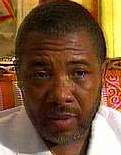
C. Taylor |
Taylor, (Ghankay) Charles (McArthur Dapkana) (b. Jan. 28, 1948, Arthington, near Monrovia, Liberia), president of Liberia (1997-2003). He became director of the General Services Administration under Pres. Samuel K. Doe. Accused by Doe of having embezzled nearly $1 million, Taylor fled to the U.S., where he was detained on a Liberian arrest warrant in 1984. Before he could be extradited, however, he escaped from a Massachusetts jail in 1985 and emerged in Libya to form the National Patriotic Front of Liberia (NPFL), a militia that invaded Liberia in December 1989. His bid for power was checked by rival factions, who for the next seven years fought a bitter war, in which over 150,000 people were killed. Although Taylor's NPFL never took control of the capital, it was dominant in the countryside and plundered Liberia's natural resources. A 1996 peace pact led to a 1997 election, and Liberians elected as president the very man who had sparked the civil war that ravaged the country: Taylor won an overwhelming 75% of the vote. This was attributed to his monopoly of the formerly state-owned national radio station (on which he was referred to as "His Excellency") and his handouts to the largely impoverished electorate, and also to the fear that he would again resort to force if denied the victory. But the country was again gripped by civil war, and Taylor was also accused of supporting rebels in neighbouring Sierra Leone. Under international pressure he resigned and left the country in 2003, settling in Calabar, Cross River state, Nigeria. In March 2006 the Nigerian government agreed to hand him over to a UN Special Court; he was arrested and flown to Sierra Leone, then in June 2006 transferred to The Hague for a war crimes trial, which began in June 2007. He was found guilty in April 2012 and given a 50-year prison sentence in May. In October he was transferred to the U.K. to serve the remainder of his sentence there. His former wife Jewel Howard-Taylor became vice president in 2018.
Taylor, David (George Pendleton) (b. July 5, 1933 - d. Nov. 8, 2007, London, England), governor of Montserrat (1990-93).
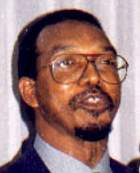
Derek Taylor | 
Duncan Taylor |
Taylor, Derek (Hugh) (b. Oct. 1, 1951, Grand Turk, Turks and Caicos Islands), chief minister of the Turks and Caicos Islands (1995-2003).
Taylor, Duncan (John Rushworth) (b. Oct. 17, 1958, New Malden, Surrey, England), governor of the Cayman Islands (2010-13); son of Sir Jock Taylor. He was also British high commissioner to Barbados and the Eastern Caribbean (2005-09) and ambassador to Mexico (2013-18).
Taylor, Glen H(earst) (b. April 12, 1904, Portland, Ore. - d. April 28, 1984, Millbrae, Calif.), U.S. politician. He was a Democratic senator from Idaho (1945-51) and Progressive Party vice presidential candidate (1948).
Taylor, Sir Henry (Milton) (b. Nov. 4, 1903 - d. Feb. 14, 1994), governor-general of The Bahamas (1988-92); knighted 1980.
Taylor, Ivy (Ruth) (b. June 17, 1970), mayor of San Antonio (2014-17).
Taylor, Sir Jock, byname of Sir John Lang Taylor (b. Aug. 3, 1924, Krondorf, Czechoslovakia [now part of Stráz nad Ohrí, Czech Republic] - d. Sept. 30, 2002), British diplomat; knighted 1979; son of Sir John Taylor. He was ambassador to Venezuela (1975-79), the Netherlands (1979-81), and West Germany (1981-84).
Taylor, Sir John (William) (b. March 1, 1895 - d. May 25, 1974), British diplomat; knighted 1954. He was ambassador to Mexico (1950-54).
Taylor, John W(ilkinson) (b. Sept. 26, 1906, Covington, Ky. - d. Dec. 11, 2001, Denver, Colo.), acting director-general of UNESCO (1952-53).
Taylor, Kathy, byname of Kathryn Louise Taylor (b. Sept. 29, 1955), mayor of Tulsa (2006-09).
Taylor, Dame Meg, byname of Dame Margaret Taylor (b. Wahgi Valley, Papua New Guinea), secretary-general of the Pacific Islands Forum (2014-21); knighted 2002. She was also Papua New Guinean ambassador to the United States, Mexico, and Canada (1989-94).
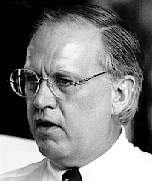
M. Taylor |
Taylor, Morry, byname of Maurice Manning Taylor, Jr. (b. Aug. 28, 1944, Detroit, Mich.), U.S. political figure. The president and CEO of Titan Wheel International (from 1983) was a candidate for the Republican presidential nomination in 1996.
Taylor, Raymond, Saint Kitts and Nevis diplomat. He was chargé d'affaires at the United Nations (1990-95).
Taylor, Richard Basil (b. April 11, 1920, Wanganui, N.Z. - d. March 9, 2000, Rotorua, N.Z.), administrator of Tokelau (1968-71). He was also New Zealand high commissioner to Western Samoa and Tonga (1968-71) and ambassador to the Philippines (1971-75), Thailand (1975-80), and Vietnam (1979-80).
Taylor, Robert L(ove) (b. July 31, 1850, Happy Valley, Tenn. - d. March 31, 1912, Washington, D.C.), governor of Tennessee (1887-91, 1897-99); brother of Alfred A. Taylor; cousin of Nathaniel E. Harris.
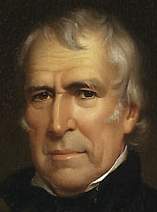
Z. Taylor |
Taylor, Zachary (b. Nov. 24, 1784, Montebello, Va. - d. July 9, 1850, Washington, D.C.), president of the United States (1849-50). He first volunteered for military service in 1806 and was given a commission as first lieutenant in 1808. He served in the army almost continuously thereafter, commanding troops in the War of 1812, the Black Hawk War (1832), and the Second Seminole War in Florida (1835-42) in which he acquired the nickname "Old Rough and Ready." Even before the United States formally declared war on Mexico on May 13, 1846, Taylor had defeated the Mexicans at Palo Alto and Resaca de la Palma, victories for which he was promoted to major general. Taylor then led his troops across the Rio Grande and in September captured Monterrey. When he wrote a letter, which found its way into the press, criticizing Pres. James K. Polk and his secretary of war, Polk ordered Taylor to remain on the defensive and transferred Taylor's best troops to Gen. Winfield Scott. Taylor disobeyed this order, however, in February 1847 when he marched south to the vicinity of Buena Vista, where, although outnumbered 4 to 1, his force won a brilliant victory and secured the north of Mexico. Taylor, who early in the war had already been seen by Whig politicians as a presidential possibility, now emerged as a hero. In 1848 he gained the Whig nomination on the fourth ballot and then went on to defeat the Democratic candidate, Lewis Cass, in the general election. The most perplexing problem of his administration was the controversy over the status of the new territories acquired from Mexico. He advocated statehood for California and New Mexico, but he encountered resistance by Southerners in Congress who opposed the admission of California as a free state. He died only 16 months after taking office.
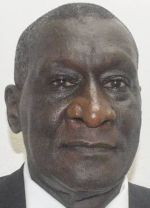
Taylor-Farrell |
Taylor-Farrell, (Joseph) Easton, also appearing as Joseph E. Farrell, premier and finance minister of Montserrat (2019- ). He was also minister of agriculture and lands, housing, and environment (2009-14).
Taylor-Kamara, Ismael Byne (b. 1913, Mabanta, Kasse chiefdom, Sierra Leone - d. April 13, 1974, Freetown, Sierra Leone), Sierra Leonean diplomat. He was permanent representative to the United Nations (1971-74).
Tazhibayev, Tulegen (Tazhibayevich) (b. Feb. 23, 1910, Sutkent, Syrdarya oblast, Russia [now in Turkestan oblast, Kazakhstan] - d. June 14, 1964), foreign minister of the Kazakh S.S.R. (1944-53, 1955-58). He was also people's commissar of education (1941), deputy premier (1942-44, 1954-57), and rector of the Kazakh State University (1948-53).
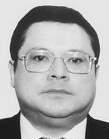
Tazhin |
Tazhin, Marat (Mukhanbetkaziyevich) (b. April 8, 1960, Aktyubinsk, Kazakh S.S.R. [now Aktobe, Kazakhstan]), foreign minister of Kazakhstan (2007-09). He has also been secretary of the Security Council (1999-2001, 2001-02), chairman of the National Security Committee (2001), ambassador to Russia (2014-17), secretary of state (2019), and ambassador to the Czech Republic (2020- ).
Tazhiyev, Ibragim (Tausiyevich) (b. April 20, 1904, near Terenozek, Russia [now in Kyzylorda oblast, Kazakhstan] - d. Sept. 28, 1960, Moscow, Russian S.F.S.R.), acting chairman of the Council of People's Commissars of the Kazakh S.S.R. (1938). He was also people's commissar of public utilities (1937-40) and a deputy premier (1937-40, 1943-53).
Tchere, Adoum (b. 1925, Mongo, Chad), defense minister of Chad (1971). He was also minister of labour and social affairs (1958-59), agriculture (1959, 1960-64), animal husbandry and water supplies (1959-60), and party organization (1971-73) and president of the National Assembly (1966-68).
Tchimpuati, Jorge Barros (d. Oct. 14, 2011, Luanda, Angola), Angolan politician. He was governor of the provinces of Zaire (1982-84) and Cabinda (1984-91).
Tchitchelle, (Robert) Stéphane, also spelled Tchichelle (b. Jan. 12, 1915, Yaya, Kouilou region, Middle Congo [now Congo (Brazzaville)] - d. October 1984), interior minister (1958-59) and foreign minister (1960-63) of Congo (Brazzaville).
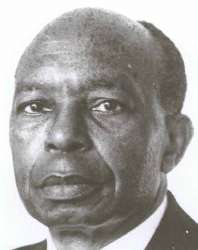
Tchoungui |
Tchoungui, Simon Pierre (b. Oct. 28, 1916, Nkolmending, Cameroon - d. July 1997), prime minister of East Cameroon (1965-72). He was also minister of health (1961-64) and national economy (1964-65) of Cameroon.
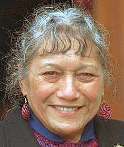
Te Ata-i |
Te Ata-i Rangi-Kahu Koroki Te Rata Mahuta Tawhiao Potatau Te Wherowhero, also spelled Te Atairangikaahu, original name Piki Mahuta (b. July 23, 1931, Huntly, N.Z. - d. Aug. 15, 2006, Ngaruawahia, N.Z.), queen of the Maori (1966-2006); daughter of Koroki Te Rata Mahuta Tawhiao Potatau Te Wherowhero. In her purely ceremonial role, she was a cultural ambassador for Maori people overseas and a hostess for visiting dignitaries, including the Japanese emperor Akihito, South African president Nelson Mandela, and U.S. president Bill Clinton. In 1995 she was present when Queen Elizabeth II, on a visit to New Zealand, signed her assent to a New Zealand act compensating a Maori tribe for lands confiscated 132 years earlier. She was careful to avoid becoming embroiled in domestic politics, even after the emergence, in May 2004, of the Maori Party; she did, however, encourage her niece, Nanaia Mahuta, to work for Maori causes from within the Labour government. She was made a Dame Commander of the British Empire in 1970 and a member of the Order of New Zealand in 1987. She was the first female and the longest-serving Maori monarch. Contrary to tradition, she had not named a successor before she died.
Te Puni, Linda, high commissioner of the Cook Islands (2010-11) and administrator of Tokelau (2015-16). In 2016-18 she was New Zealand high commissioner to Tuvalu (non-resident); in 2018 she was appointed ambassador to Chile.
Tea Banh, Samdech (Pichey Sena) (b. Nov. 5, 1945, Koh Kong province, Cambodia), defense minister of Cambodia (1988- ; 1993-2006 co-minister). He has also been minister of communications, transport, and posts (1985-88) and a deputy prime minister (1987-93, 2004- ). He was given the Samdech title in 2017.

Teach |
Teach, Edward (also spelled Thatch, Tache, or Tatch), byname Blackbeard (b. c. 1680, Bristol?, England - d. Nov. 22, 1718, Ocracoke Inlet, North Carolina), English pirate. Little is known about his early life. It is reported that he served as a privateer out of Jamaica during Queen Anne's War (1702-13). Named Blackbeard after his most prominent physical characteristic, he began his pirating sometime after 1713, sailing with, or possibly under the command of, Benjamin Hornigold, using the Bahamas as a base. In November 1717 they captured the French merchant vessel Concorde; Teach was placed in command of the ship and renamed it Queen Anne's Revenge. Adding more guns from ships plundered shortly thereafter, the pirate soon commanded a floating fortress reportedly mounting as many as forty cannon. He sailed the Caribbean and the Atlantic along coastal waters of American colonies, torturing merchant ship crewmen and passengers, stealing valuable cargo, and leaving destruction in his wake. In 1718, he moved to North Carolina, where he struck a deal with Gov. Charles Eden, paying him a percentage of his profits. Virginia Gov. Alexander Spotswood finally sent a small brigade, led by Robert Maynard, to depose the pirate king. Maynard ended up killing Teach in a long, bloody battle. Blackbeard received a reported five musketball wounds and more than 20 sword lacerations before dying. He had captured over 40 ships during his piratical career, and his death virtually represented the end of an era in the history of piracy in the New World. He was rumoured to have left great treasure buried at many sites, but nothing has ever been found.
Teague, Hilary (b. Sept. 13, 1805, Richmond, Va. - d. May 21, 1853, Liberia), secretary of state of Liberia (1848-50).
Teannaki, Teatao (b. 1939, Nonouti, Gilbert and Ellice Islands [now in Kiribati] - d. Oct. 11, 2016), president of Kiribati (1991-94). In 1974 he was elected to the House of Assembly (Maneaba ni Maungatabu) for the constituency of Abaiang and served as a member of the Public Accounts Committee. He became vice president in 1979, also subsequently holding the posts of minister of finance; education, training, and culture; home affairs and decentralization; and finance and economic planning. When Kiribati set out to elect a new president in 1991, it took two months to obtain a final vote because of a constitution designed to maximize participation by the citizenry, ensure that the president has popular support, and prevent anyone from being in power so long that they become entrenched. Former president Ieremia Tabai stepped down because under the constitution no president could serve more than three four-year terms in a row. The voting to find Tabai's replacement began in May 1991, when the republic went to the polls to elect new members of parliament. The new parliament then decided that no more than four but no fewer than three of its members were to stand in the national vote to elect the president. Teannaki, who was reelected to the House of Assembly, was one of four candidates selected by the House to run for president. He won the presidential elections on July 3 and was sworn in as president on July 4. His main rival was his brother-in-law, Roniti Teiwaki, though his lead was never substantial. Teannaki got his boost when results from the heavily populated South Tarawa and his home island of Abaiang put him ahead. The final votes were Teannaki 10,123, Teiwaki more than 9,000, and the other two candidates trailing significantly behind. He was forced to resign when he received a no-confidence vote on May 24, 1994. In February 2016 he became speaker of parliament.
Teardo, Alberto (b. 1937, Venice, Italy), president of Liguria (1981-83).
Teasdale, Joseph P(atrick) (b. March 29, 1936, Kansas City, Mo. - d. May 8, 2014, Kansas City, Mo.), governor of Missouri (1977-81).
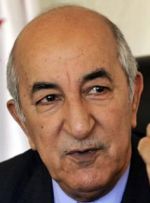
Tebboune |
Tebboune, Abdelmadjid (b. Nov. 17, 1945, Mechria, Naâma wilaya, Algeria), prime minister (2017) and president (2019- ) of Algeria. He was also wali of Adrar (1983-84), Tiaret (1984-89), and Tizi Ouzou (1989-91) and minister of culture and communications (1999-2000) and housing and urban planning (2001-02, 2012-17).
Tebet, Ramez (b. Nov. 7, 1936, Três Lagoas, Mato Grosso [now in Mato Grosso do Sul], Brazil - d. Nov. 17, 2006, Campo Grande, Mato Grosso do Sul), acting governor of Mato Grosso do Sul (1986-87). He was also minister of national integration (2001) and president of the Federal Senate (2001-03) of Brazil.
Tebet, Simone (Nassar) (b. Feb. 22, 1970, Três Lagoas, Mato Grosso [now in Mato Grosso do Sul], Brazil), Brazilian politician; daughter of Ramez Tebet. She has been mayor of Três Lagoas (2005-10), a minor presidential candidate (2022), and minister of planning and budget (2023- ).
Tecchio, Sebastiano (b. Jan. 3, 1807, Vicenza, Italy - d. Jan. 24, 1886, Venice, Italy), justice minister of Italy (1867). He was also minister of public works of Sardinia (1848-49) and president of the Chamber of Deputies (1862-63) and the Senate (1876-84).
Tedesco, Francesco (b. March 11, 1853, Andretta, Two Sicilies [now in Avellino province, Italy] - d. May 9, 1921, Rome, Italy), treasury minister (1910-14) and finance minister (1919-20, 1920) of Italy. He was also minister of public works (1903-05, 1905-06) and posts and telegraphs (1904-05, 1913).
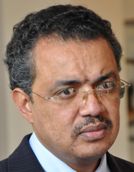
Tedros |
Tedros Adhanom (Ghebreyesus), also called Tewodros Adhanom (b. March 3, 1965, Asmara, Eritrea), foreign minister of Ethiopia (2012-16) and director-general of the World Health Organization (2017- ). He was health minister in 2005-12.
Teehankee, Claudio (b. April 18, 1918, Manila, Philippines - d. Nov. 27, 1989, New York City), justice secretary of the Philippines (1967-68). He was also chief justice of the Supreme Court (1986-88) and permanent representative to the United Nations (1988-89).
Teemant, Jaan (b. Sept. 24, 1872, Illuste, Russia [now in Estonia] - d. probably July 1941, Tallinn, Estonia), state elder of Estonia (1925-27, 1932). He was also attorney general (1918).
Teetsov, Anton (b. Nov. 21, 1889, Pärnu, Russia [now in Estonia] - d. Aug. 19, 1941, Sosva camp, Sverdlovsk oblast, Russian S.F.S.R.), finance minister of Estonia (1927-28).
Teferi Benti (b. 1921 - d. [killed] Feb. 3, 1977), chairman of the Provisional Military Administrative Council of Ethiopia (1974-77).
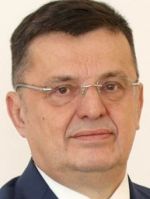
Tegeltija | 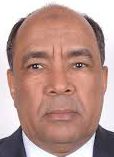
Teguedi |
Tegeltija, Zoran (b. Sept. 29, 1961, Mrkonjic Grad, Bosnia and Herzegovina), prime minister (2019-22) and finance minister (2023- ) of Bosnia and Herzegovina.
Teguedi, Ahmed Ould (b. Sept. 15, 1954, Chinguetti, Mauritania), foreign minister of Mauritania (2013-15). He was also chargé d'affaires in Egypt (1990), Yemen (1991-93), and Morocco (1993-95), head of the office responsible for Mauritanian interests (1995-99) and ambassador (1999-2009) in Israel, and permanent representative to the United Nations (2012-13).
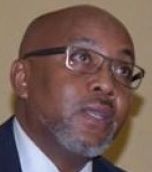
Tehindrazanarivelo |
Tehindrazanarivelo, Djacoba Liva, foreign minister of Madagascar (2020-21).
Teirac, Guillaume (Léonard) de Bellecombe, seigneur de (b. Feb. 20, 1728, Bellecombe village, near Perville [now in Tarn-et-Garonne département], France - d. Feb. 28, 1792, Montauban [now in Tarn-et-Garonne]), governor of Île Bourbon (1767-73) and French India (1777-82) and governor-general of Saint-Domingue (1782-85).
Teitgen, Pierre-Henri (b. May 29, 1908, Rennes, Ille-et-Vilaine, France - d. April 6, 1997, Paris, France), French defense minister (1947-48). He was also minister of information (1944-45), justice (1945-46), and overseas France (1955-56), a deputy prime minister (1947, 1948, 1953-54), minister of state (1949-50), and president of the Popular Republican Movement (1952-56).
Teixeira, Constantino (dos Santos), byname Tchutchu (d. 1988, Bissau, Guinea-Bissau), interior minister (1973-78) and prime minister (1978) of Guinea-Bissau.
Teixeira, Gabriel Maurício (b. Sept. 22, 1897, Funchal, Madeira, Portugal - d. July 24, 1973), governor of Macau (1940-46) and governor-general of Mozambique (1948-58).
Teixeira, Joaquim José (b. Aug. 27, 1811, Rio de Janeiro, Brazil - d. Jan. 1, 1885, Rio de Janeiro), president of Sergipe (1847-48).
Teixeira, Mauro (Ludovico) Borges (b. Feb. 15, 1920, Rio Verde, Goiás, Brazil - d. March 29, 2013, Goiânia, Goiás), governor of Goiás (1961-64); son of Pedro Ludovico Teixeira; cousin of José Ludovico de Almeida.
Teixeira, Pedro Ludovico (b. 1891, Goiás, Goiás, Brazil - d. Aug. 17, 1979, Goiânia, Goiás), federal interventor/governor of Goiás (1930-45, 1951-54).
Teixeira, Pedro Reginaldo, federal interventor in Alagoas (1930).
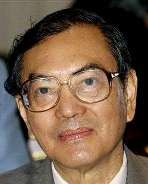
Tej |
Tej Bunnag (b. Nov. 25, 1943), foreign minister of Thailand (2008). He was ambassador to China and North Korea (1986-90), France (1996-2000), and the United States (2000-01). He was appointed foreign minister at the end of July 2008 to replace Noppadon Pattama who had to resign due to intense pressure after the listing of the Preah Vihear temple as a World Heritage site by Cambodia despite objection from Thailand. In his brief stint, Tej managed to reduce tension along the Thai-Cambodia border where both countries deployed troops following the clash over the status of the ancient temple. But the domestic political crisis, where thousands of anti-government protesters occupied the Government House, took a toll on Tej who could not withstand the pressure after a state of emergency was imposed in the capital in September; he resigned after holding the post for less than 40 days.
Tejada (y Ruiz de) Sorzano, José Luis (b. Jan. 12, 1882, La Paz, Bolivia - d. Oct. 4, 1938, Arica, Chile), vice president (1931-34) and president (1934-36) of Bolivia.
Tejan-Sie, Sir Banja (b. Aug. 7, 1917, Moyamba, Southern province, Sierra Leone - d. Aug. 8, 2000, Willesden, England), governor-general of Sierra Leone (1968-71); knighted 1970. He was also speaker of parliament (1962-67) and chief justice (1967-68).
Tejchma, Józef (b. July 14, 1927, Markowa, Poland - d. Dec. 13, 2021, Warsaw, Poland), a deputy premier of Poland (1972-79). He was also minister of culture (1974-78, 1980-82) and education (1979-80) and ambassador to Switzerland (1980) and Greece (1984-88).
Tejeda (Mares), José Simeón (b. 1826, Andaray, Arequipa, Peru - d. Aug. 30, 1873, Lima, Peru), justice and education minister of Peru (1864, 1865-67). He was also president of the Chamber of Deputies (1872-73).
Tejeda Olivares, (Sixto) Adalberto (b. March 28, 1883, Chicontepec, Veracruz, Mexico - d. Sept. 8, 1960, Mexico City, Mexico), governor of Veracruz (1920-24, 1928-32). He was also Mexican minister of communications and public works (1924-25) and interior (1925-28).
Tejedor, Carlos (b. Nov. 4, 1817, Buenos Aires, Argentina - d. Jan. 3, 1903, Buenos Aires), foreign minister of Argentina (1870-74) and governor of Buenos Aires (1878-80). He was also attorney general (1875-78).
Tejera (Penson), (Juan Nepomuceno Publio Escipión) Emiliano (b. Sept. 21, 1841, Santo Domingo, Haiti [now in Dominican Republic] - d. Jan. 9, 1923, Santo Domingo), finance minister (1902-03) and foreign minister (1905-08) of the Dominican Republic.
Tejera, Emilio, byname of Juan Nepomuceno Scipio Emiliano Tejera Bonetti (b. Sept. 24, 1880, Santo Domingo, Dominican Republic - d. Dec. 9, 1968, Miami, Fla.), member of the Council of Secretaries of State of the Dominican Republic (1911); son of Emiliano Tejera.
Tejera Guevara, Enrique Guillermo (b. Sept. 5, 1889, Valencia, Carabobo, Venezuela - d. Nov. 28, 1980, Caracas, Venezuela), president of Carabobo (1945). He was also Venezuelan minister of health and social assistance (1936) and education (1938-39) and minister to Belgium (1936-38) and Uruguay and Paraguay (1943-45).
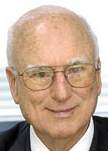
Tejera París |
Tejera París, Enrique (b. April 29, 1919, Caracas, Venezuela - d. Nov. 11, 2015, Caracas), foreign minister of Venezuela (1989); son of Enrique Guillermo Tejera Guevara. He was also governor of Sucre state (1959-61), ambassador to the United States (1963-68) and Spain (1996-98), and permanent representative to the Organization of American States (1963-67) and the United Nations (1994-96).
Tek, Ahmet Ferit, before 1935 (Ahmet) Ferit Bey (b. March 7, 1877, Bursa, Ottoman Empire [now in Turkey] - d. Nov. 25, 1971, Istanbul, Turkey), interior minister of Turkey (1923-24). He was also ambassador to the United Kingdom (1925-32), Poland (1932-39), and Japan (1939-43).
Tekeda Alemu (Woldemariam) (b. May 5, 1951, Addis Ababa, Ethiopia), Ethiopian diplomat. He was permanent representative to the United Nations (2011-18).
Tekkari, Béchir (b. 1952, Ksibet El Médiouni, Tunisia), justice minister of Tunisia (1999-2010). He was also minister of higher education and scientific research (2010-11).
Tekoah, Yosef, original name Yosef Tukaczynski (b. March 4, 1925, Belorussian S.S.R. - d. April 14, 1991, New York City), Israeli diplomat. He was chargé d'affaires (1959-60) and permanent representative (1968-75) to the United Nations and ambassador to Brazil (1960-62) and the Soviet Union (1962-65).

Teksler | 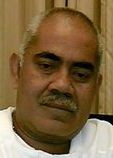
Telavi |
Teksler, Aleksey (Leonidovich) (b. Jan. 19, 1973, Chelyabinsk, Russian S.F.S.R.), governor of Chelyabinsk oblast (2019- ). He was also mayor of Norilsk (2008-09).
Telaumbanua, P(andita) R(oos), governor of Sumatera Utara (1965-67).
Telavi, Willy (b. July 7, 1958, Betio, Gilbert and Ellice Islands [now in Kiribati]), prime minister of Tuvalu (2010-13). He was police commissioner in 1993-2006 and home affairs minister in 2006-11.
Teleki (de Szék), Géza gróf (Count) (b. Sept. 28, 1843, Dés, Hungary [now Dej, Romania] - d. Sept. 27, 1913, Budapest, Hungary), interior minister of Hungary (1889-90).
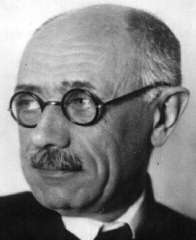
P. Teleki |
Teleki (de Szék), Pál (János Ede) gróf (Count) (b. Nov. 1, 1879, Budapest, Hungary - d. April 3, 1941, Budapest), foreign minister (1920, 1920-21) and prime minister (1920-21, 1939-41) of Hungary; son of Géza gróf Teleki. He entered the Hungarian parliament as early as 1905, but acquired international distinction first as a geographer. After World War I he went to Trianon to plead with the Allies against the amputation of large regions of Hungary but failed. He became prime minister in 1920 but resigned in 1921 after the abortive attempt of ex-emperor Karl to regain the Hungarian crown. He withdrew from party politics, in which he never greatly believed, holding the true functions of government to be educative and moral. In 1925 he served on the commission appointed by the League of Nations to investigate the disputed question of the frontier between Turkey and Iraq. He was also head of the Hungarian Boy Scouts Association. He returned to office as minister of education in May 1938 and became prime minister again in February 1939. He dissolved various Fascist organizations and affirmed his attachment to parliamentary institutions, but allowed the "Jewish Statute," which limited Jewish employment in proportion to Jewish numbers, to stand. Against his personal inclinations events drove his government more and more to the German side. Passionately convinced of the justice of Hungary's claim for a revision of the Treaty of Trianon, he supported the dismemberment of Czechoslovakia and Romania's forced cession of northern Transylvania, but he also concluded a treaty of eternal friendship with Yugoslavia (December 1940). In 1941 Germany invaded that country and demanded Hungary's help, while Britain threatened dire consequences if Hungary gave it; in what has been seen as a desperate act to demonstrate his and his nation's honour, he shot himself.
Teles, José Manuel Archer Galvão (b. April 8, 1938, Lisbon, Portugal), Portuguese diplomat. He was permanent representative to the United Nations (1975-76).
Teles, Sebastião Custódio de Sousa (b. July 27, 1847, Faro, Portugal - d. 1921), war minister (1898-1900, 1904-05, 1908-09) and prime minister (1909) of Portugal.
Teleszky, János (b. Sept. 15, 1868, Nagyvárad, Hungary [now Oradea, Romania] - d. June 13, 1939, Budapest, Hungary), finance minister of Hungary (1912-17).
Telicka, Pavel (b. Aug. 24, 1965, Washington, D.C.), Czech politician. He was EU commissioner for health and consumer protection (2004).
Telito, Sir Filoimea (b. March 19, 1945, Vaitupu island, Gilbert and Ellice Islands [now in Tuvalu] - d. July 11, 2011), governor-general of Tuvalu (2005-10); knighted 2007.
Tell, Christian (b. Jan. 12, 1808, Kronstadt [Brasov], Transylvania [now in Romania] - d. Feb. 24, 1884, Bucharest, Romania), war minister of Romania (1871). He was also mayor of Bucharest (1870-71).
Telle, Édouard (Émile Léon) (b. Sept. 2, 1859, Paris, France - d. 1949), governor of New Caledonia (1900-01 [acting], 1902), acting commissioner-general of French Congo (1905-06), and acting lieutenant governor of Gabon (1907-09).
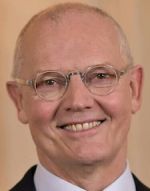
S. Telle |
Telle, Serge (b. May 5, 1955, Nantes, France), minister of state of Monaco (2016-20). He was also French ambassador to Monaco (2006-07).
Telles, Raymond L(orenzo), Jr., originally Ramón Telles (b. Sept. 5, 1915, El Paso, Texas - d. March 8, 2013, Sherman Oaks, Calif.), mayor of El Paso (1957-61). He was also U.S. ambassador to Costa Rica (1961-67).
Téllez (Kuenzler), Luis (Manuel Enrique) (b. Oct. 13, 1958, Mexico City, Mexico), Mexican politician. He was minister of energy (1997-2000) and communications and transport (2006-09).
Telli, (Elhadj Boubacar) Diallo (b. 1925, Porédaka, Guinea - d. March 1, 1977, Camp Boiro, near Conakry, Guinea), secretary-general of the Organization of African Unity (1964-72). He was also Guinean permanent representative to the United Nations (1958-60, 1961-64), ambassador to the United States (1959-61), and justice minister (1972-76). He was arrested on July 18, 1976, for allegedly plotting against Pres. Ahmed Sékou Touré's regime. Deprived of food and water, he died of starvation.
Tellier, Théophile Antoine Pascal (b. Sept. 3, 1872, Boulogne-sur-Seine, near Paris, France - d. Aug. 25, 1955, Paris), governor of Guadeloupe (1928-31) and Dahomey (1931-32) and lieutenant governor of Niger (1931-33).
Tello Alfaro, José (Andrés), justice minister of Peru (2022- ).
Tello Baurraud, Manuel (b. Nov. 1, 1898, Zacatecas, Zacatecas, Mexico - d. Nov. 27, 1971, Mexico City, Mexico), foreign minister of Mexico (1948-51 [acting], 1951-52, 1958-64). He was ambassador to the United States in 1953-58.
Tello Cristerna, Alejandro (b. May 30, 1971, Zacatecas, Zacatecas, Mexico), governor of Zacatecas (2016-21); grandnephew of Manuel Tello Baurraud.
Tello Macías, Carlos (Alejandro) (b. Nov. 4, 1938, Geneva, Switzerland), Mexican politician; son of Manuel Tello Baurraud; brother of Manuel Tello Macías. He was minister of budget and planning (1976-77), director-general of the Bank of Mexico (1982), and ambassador to Portugal (1987-89), the Soviet Union/Russia (1990-94), and Cuba (1994).

M. Tello M. |
Tello Macías, Manuel (b. March 15, 1935, Geneva, Switzerland - d. March 23, 2010, Mexico City, Mexico), foreign minister of Mexico (1994); son of Manuel Tello Baurraud. He was ambassador to the United Kingdom (1977-79) and France (1989-92) and permanent representative to the United Nations (1993-94, 1995-2000).

Telnov | 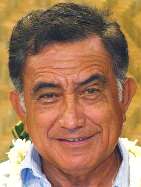
Temaru |
Telnov, Oleg (Vladimirovich) (b. Oct. 9, 1969), prime minister of Karelia (2016-17).
Telukluk, Paul (Barthelemy) (b. Sept. 14, 1948), internal affairs minister of Vanuatu (2014). He was also minister of natural resources (1991-96), lands, mines, energy, and rural water supply (2004-05), lands, geology, and mines (2005, 2010, 2015), and ni-Vanuatu business (2011, 2011). He was convicted and jailed for corruption in 2015 but pardoned in 2019.
Temane, Bahiti K(etaraka), labour and home affairs minister of Botswana (1994-99).
Temaru, Oscar (Manutahi) (b. Nov. 1, 1944, Faa'a, Tahiti, French Settlements in Oceania [now French Polynesia]), president of French Polynesia (2004, 2005-06, 2007-08, 2009, 2011-13). He was also president of the Assembly (2008-09, 2010-11).
Temata, Tessa (b. Nov. 2, 1967 - d. Dec. 8, 2019, Palmerston North, N.Z.), high commissioner of the Cook Islands (2019).
Tembo, Christon (Sifapi) (b. May 24, 1944, Kasempa, Northern Rhodesia [now Zambia] - d. March 6, 2009, Lusaka, Zambia), foreign minister (1995-96) and vice president (1997-2001) of Zambia. He was also ambassador to West Germany (1987-88) and minister of tourism (1991-95).
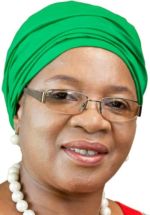
N. Tembo |
Tembo, Nancy (Gladys) (b. Nov. 1, 1959, Blantyre, Nyasaland [now Malawi]), foreign minister of Malawi (2022- ). She was also minister of forestry and natural resources (2020-22).
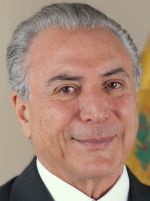
Temer |
Temer (Lulia), Michel (Miguel Elias) (b. Sept. 23, 1940, Tietê, São Paulo, Brazil), vice president (2011-16) and president (2016-19) of Brazil. Beginning his political career in the São Paulo state government, he became attorney general (1983-84, 1991-92) and secretary of public security (1984-86, 1992, 1993). A federal deputy from 1987, he became president of the Chamber of Deputies (1997-2001, 2009-10). In 2001 he was elected president of the Brazilian Democratic Movement Party (PMDB). Both party and man avoided clear ideological positions, which left them in a comfortable position for negotiating their participation in coalitions of any political colour. Thus he became vice president to Dilma Rousseff of the Workers' Party. As her position deteriorated after a major corruption scandal, he first kept a low profile but in March 2016 the PMDB officially abandoned the coalition. In May impeachment proceedings were started against Rousseff, and Temer became acting president while she was suspended. When the Senate voted to remove her from office in August, Temer replaced her for the rest of her term. In 2017 he was himself charged with corruption, but the Congress - itself highly enmeshed in scandal - twice voted to dismiss the charges; a third charge was leveled against him in December 2018, shortly before he left office. His approval rating at one point dropped as low as 3%, and in May 2018 he scrapped plans to run in the October presidential election. He was arrested in March 2019, facing ten counts of corruption.
Temereshev, Pyotr (Ivanovich) (b. Jan. 27, 1911, Bolshoy Tsermenur [no longer existing], Vyatka province [in present Kirov oblast], Russia - d. April 7, 1986, Yoshkar-Ola, Mari A.S.S.R., Russian S.F.S.R.), chairman of the Council of Ministers of the Mari A.S.S.R. (1951-54).

Temizel |
Temizel, Zekeriya (b. 1948, Tokat, Turkey), Turkish politician. The mastermind of the Mesut Yilmaz government's tax reforms which were seen by Turkish business as a harsh crackdown on financial markets, Temizel has a solid reputation for financial competence and honesty. He is a left-winger who, as finance minister from 1997, approved privatizations that perhaps ran against the grain. His package of reforms was tweaked following market criticism and was then seen as one of the government's biggest achievements. He was retained in the government of Bülent Ecevit formed in January 1999, but he resigned in February to run (unsuccessfully) for mayor of Istanbul.
Temkin, Anatoly (Arkadyevich) (b. July 11, 1955), acting governor of Perm oblast (2004).
Temple, Emmanuel (Jacques Marie) (b. Sept. 21, 1895, Montpellier, Hérault, France - d. Nov. 19, 1988, Montpellier), French defense minister (1954-55). He was also minister of veterans and war victims (1951-53, 1954) and justice (1955).
Templeton, Malcolm James Campbell (b. May 12, 1924, Dunedin, New Zealand - d. Sept. 11, 2017, Wellington, New Zealand), New Zealand diplomat. He was permanent representative to the United Nations (1973-78).
Templewood, Samuel (John Gurney) Hoare, (1st) Viscount (b. Feb. 24, 1880, London, England - d. May 7, 1959, London), British foreign secretary (1935), first lord of the Admiralty (1936-37), and home secretary (1937-39). He was also secretary of state for air (1922-24, 1924-29, 1940) and India (1931-35), lord privy seal (1939-40), and ambassador to Spain (1940-44). He succeeded as (2nd) Baronet in 1915 and was created viscount in 1944.
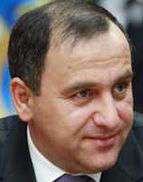
Temrezov | 
Temu |
Temrezov, Rashid (Borisbiyevich) (b. March 14, 1976, Cherkessk, Russian S.F.S.R.), head of the republic of Karachayevo-Cherkessia (2011- ).
Temu, Sir Puka (b. Jan. 7, 1954), foreign minister of Papua New Guinea (2012); knighted 2009. He was also minister of national planning and monitoring, provincial affairs, works, and transport (2002), public service (2002-03, 2012-17), state enterprises and information (2004), lands and physical planning (2005-10), agriculture and livestock (2011-12), health and HIV/AIDS (2017-19, 2020), and Bougainville affairs (2019-20), minister without portfolio (2004-05), and deputy prime minister (2007-10).

Ten Juá |
Ten Juá, Edite (Ramos da Costa) (b. Dec. 31, 1972, São Tomé and Príncipe), foreign minister of São Tomé and Príncipe (2020-22). She was also justice minister (2012-14).
Ten-Pow, Rudolph Michael (b. 1953), Guyanese diplomat. He was permanent representative to the United Nations (2016-20).
Tenby, Gwilym Lloyd George, (1st) Viscount (b. Dec. 4, 1894, Cricieth, Caernarvonshire, Wales - d. Feb. 14, 1967, London, England), British home secretary (1954-57); son of David Lloyd George, Earl Lloyd-George of Dwyfor. He was also minister of fuel and power (1942-45) and food (1951-54). He was created viscount in 1957.
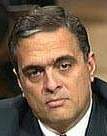
Tenet |
Tenet, George (John) (b. Jan. 5, 1953, Queens, New York City), CIA director (1996-2004).
Tenev (Hadzhikolev), Mikhail (b. Jan. 15, 1856, Kazanluk, Ottoman Empire [now in Bulgaria] - d. Oct. 6, 1943), finance minister of Bulgaria (1899-1900). He was also administrator (1887-94) and governor (1894-99) of the Bulgarian National Bank.
Tengirsenk, Yusuf Kemal, before Jan. 1, 1935, Yusuf Kemal Bey (b. 1878, Boyabat, Ottoman Empire [now in Turkey] - d. April 15, 1969, Ankara, Turkey), foreign minister of Turkey (1921-22). He was also ambassador to the United Kingdom (1924) and justice minister (1930-33).
Tennyson, Hallam Tennyson, (2nd) Baron (b. Aug. 11, 1852, Twickenham, Middlesex, England - d. Dec. 2, 1928, Freshwater, Isle of Wight, England), governor of South Australia (1899-1902) and governor-general of Australia (1902-04). He succeeded his father, the major poet Alfred Tennyson, (1st) Baron Tennyson, as baron in 1892.
Tenorio, Froilan C(ruz) (b. Sept. 9, 1939, Saipan, Northern Mariana Islands - d. May 4, 2020, Fort Worth, Texas), governor of the Northern Mariana Islands (1994-98); nephew of Pedro P. Tenorio. His long interest in public issues led to his first bid for public office in 1979. He won a Senate seat in the second commonwealth legislature representing Saipan. After completing his term, he was elected to serve as resident representative to the United States. For the following six years (1984-90), he represented the commonwealth in the United States. He returned to Saipan and ran unsuccessfully for governor in 1989. He was elected governor in 1993 as the first Democrat in 12 years.
Tenorio, Jorge Eduardo (b. June 30, 1943 - d. Dec. 8, 2011, San Salvador, El Salvador), finance minister (1980-83) and foreign minister (1984-85) of El Salvador. He was also minister of the presidency (1985-86) and president of the Supreme Court of Justice (1997-2000).
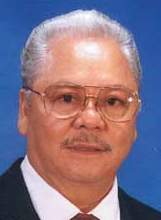
P.P. Tenorio |
Tenorio, Pedro P(angelinan), byname Teno (b. April 18, 1934, Saipan, Northern Mariana Islands - d. May 21, 2018, Saipan), governor of the Northern Mariana Islands (1982-90, 1998-2002). In government service, he first served in the House of Representatives of the Congress of Micronesia and became a member of the Marianas District Legislature. In 1978, when the Northern Marianas became a commonwealth of the United States, Tenorio was elected vice president of the Senate. He became president of the Senate in 1980. A Republican, he was elected governor in 1981 and reelected in 1985. He was elected to a third term in 1997.
Tenorio Hurtado, (José) Víctor (b. 1902?, Chachapoyas, Amazonas, Peru - d. ...), war minister of Peru (1958-60). He was also general commander of the army (1958).
Teny, Angelina (Jany), defense minister of South Sudan (2020- ); wife of Riek Machar.
Tenyukh, Ihor (Yosypovych) (b. May 23, 1958, Stryy [Stryi], Lvov [Lviv] oblast, Ukrainian S.S.R.), acting defense minister of Ukraine (2014). He was also commander of the navy (2006-10).
Teo, Feleti (Penitala) (b. Oct. 9, 1962, Tarawa, Gilbert and Ellice Islands [now in Kiribati]), acting secretary-general of the Pacific Islands Forum (2008); son of Sir Fiatau Penitala Teo; brother of Samuelu Teo. He was also attorney general of Tuvalu (1991-2000).
Teo, Sir Fiatau Penitala (b. July 23, 1911, Funafuti, Gilbert and Ellice Islands [now in Tuvalu] - d. Nov. 25, 1998, Funafuti), governor-general of Tuvalu (1978-86); knighted 1979.
Teo, Samuelu (Penitala) (b. 1957), acting governor-general of Tuvalu (2021); son of Sir Fiatau Penitala Teo. He has been minister of works, energy, and communications (1999-2001) and natural resources (2001-02) and speaker of parliament (2019- ).
Teoctist, original name Toader Arapasu (b. Feb. 7, 1915, Tocileni, Botosani county, Romania - d. July 30, 2007, Bucharest, Romania), patriarch of the Orthodox Church of Romania (1986-2007). After the fall of the Communist government, he resigned his post on Jan. 18, 1990, but was reinstated on April 5 by the Holy Synod, which declared that he had not resigned in January, merely withdrawn temporarily on health grounds.
Teodorov, Teodor (Ivanov) (b. April 8 [March 27, O.S.], 1859, Elena, Ottoman Empire [now in Bulgaria] - d. Aug. 5, 1924, Chamkoria [now Borovets], Bulgaria), finance minister (1897-99, 1911-13) and prime minister and foreign minister (1918-19) of Bulgaria. He was also president of the National Assembly (1894-96) and justice minister (1896-97).
Teodorovici, Eugen (Orlando) (b. Aug. 12, 1971), finance minister of Romania (2015, 2018-19). He was also minister of European funds (2012-15).
Tep Phan (b. Sept. 10, 1905, Kandal Stueng, Cambodia - d. 1978, Nogent-sur-Marne, Val-de-Marne, France), defense minister (1954), foreign minister (1954-55, 1960-61), and interior minister (1954-55) of Cambodia. He was also governor of Kompong Thom (1947-48), Battambang (1949-51), and Phnom Penh (1960?-65), minister of commerce and industry (1951), and a deputy prime minister (1957-58, 1960-61).
Tepavac, Mirko (b. Aug. 13, 1922, Zemun, Yugoslavia [now part of Belgrade, Serbia] - d. Aug. 28, 2014, Belgrade), chairman of the Vojvodina Provincial Committee of the League of Communists (1966-69) and foreign minister of Yugoslavia (1969-72). He was also Yugoslav ambassador to Hungary (1960-64).
Ter-Gabrielyan, Saak (Mirzoyevich) (b. Feb. 15, 1886, Shusha, Yelizavetpol province, Russia [now in Artsakh, Azerbaijan] - d. [executed] Aug. 19, 1937), chairman of the Council of People's Commissars of the Armenian S.S.R. (1928-35).
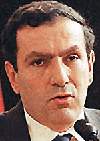
Ter-Petrosyan |
Ter-Petrosyan, Levon (Hakobi), Russian Levon Akopovich Ter-Petrosyan (b. Jan. 9, 1945, Aleppo, Syria), president of Armenia (1991-98). In 1946 his family migrated to Soviet Armenia. He was imprisoned in 1988-89 after founding the Armenian Karabakh Committee. In November 1989 he became chairman of the Armenian National Movement (HHSh), formed to campaign for independence. As chairman of the Supreme Soviet (Council) from August 1990, he led the country to declaring independence following a referendum in September 1991 and backed the ethnic Armenians in the enclave of Nagorno-Karabakh in their fight to break away from neighbouring Azerbaijan. He was elected president in October 1991 and September 1996. Under pressure to resign over the war with Azerbaijan in August 1992, he offered to have the issue of his resignation decided by a referendum, but when this was put to a parliamentary vote there was no quorum. He initiated fundamental institutional, political, and economic reforms, including a radical land privatization program. He guided the drafting and adoption of a constitution in 1995. Although he led the Nagorno-Karabakh war to a conclusion with a ceasefire agreement in 1994, the absence of a final settlement prevented the normalization of relations with Azerbaijan. Enjoying decreasing support for himself and the HHSh, he stepped down in February 1998 amidst divisions over his policy toward Nagorno-Karabakh. He was an unsuccessful presidential candidate in 2008.
Terán, José Alejandro (b. July 1, 1980, La Guaira, Distrito Federal [now in La Guaira state], Venezuela), governor of La Guaira (2021- ). He was also mayor of Vargas municipality (2017-21).
Terán Terán, Édgar (b. July 18, 1939, Quito, Ecuador - d. Nov. 15, 2011, near Washington, D.C.), foreign minister of Ecuador (1984-87). He was also ambassador to the United States (1992-96).
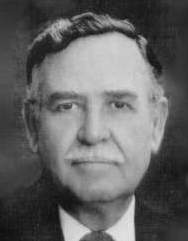
H. Terán |
Terán Terán, Héctor (b. April 3, 1931, Moctezuma, Sonora, Mexico - d. Oct. 4, 1998, Mexicali, Baja California, Mexico), governor of Baja California (1995-98). A lifelong member of the National Action Party, he served in the Baja California legislature and the federal congress, and as a member of the party's national committee, before he was elected with 54% of the vote in 1995 for a six-year term as governor. He died in office.
Terata, Sukeshiro (b. June 19, 1940), governor of Akita (1997-2009).

Terauchi |
Terauchi, Masatake, in full Hakushaku (Count) Masatake Terauchi, original name (before adoption) Tada Jusaburo (b. Feb. 5, 1852, Yamaguchi, Japan - d. Nov. 3, 1919, Oiso, Japan), prime minister of Japan (1916-18). He entered the army at an early age and was injured and lost the use of his right arm during the Satsuma Rebellion of 1877. A protégé of Aritomo Yamagata, he became army minister (1902-11) and displayed great organizational talent during the war with Russia (1904-05), being rewarded with the title of viscount. In May 1910 he was concurrently appointed resident-general in Korea. He quickly stationed Japanese soldiers in every province, and in August 1910 the work of annexation was complete. He then became governor-general and ruled the Koreans with a firm hand; he was also raised to the rank of count. At Yamagata's insistence, he was called by the emperor to become prime minister in 1916, in the course of a passionate struggle between the forces of representative government and those of the Japanese bureaucracy. He faced defeat in parliament but the emperor forestalled a confidence vote by dissolving the house; new elections in 1917 resulted in a victory for him. To increase Japanese influence in China he financially supported pro-Japanese warlords, and agreed to aid Great Britain and its allies during World War I only in exchange for secret agreements (later validated at the Treaty of Versailles in 1919) providing for Japanese rights on the Chinese mainland. In 1918 he initiated Japanese intervention in Siberia, with a view to gaining control of the Trans-Siberian Railway and thus strengthening the Japanese position in Manchuria. Rice riots in Tokyo brought about the fall of his cabinet later that year.

Terboven |
Terboven, Josef (Antonius Heinrich) (b. May 23, 1898, Essen, Germany - d. [suicide] May 8, 1945, Skaugum, near Oslo, Norway), Oberpräsident of Rheinland (1935-45) and German Reichskommissar of Norway (1940-45).
Terceira, António José de Sousa Manoel de Menezes Severim de Noronha, (1º) duque de, (1º) marquês e (7º) conde de Vila Flor (b. March 18, 1792, Lisbon, Portugal - d. April 26, 1860, Lisbon), prime minister of Portugal (1836, 1842-46, 1851, 1859-60). He was also governor of Grão-Pará (1817-20), captain-general of the Azores (1829-32), and minister of war (1834-35, 1836, 1842-46, 1851, 1859-60), foreign affairs (1842, 1859-60), and marine and colonies (1846). He succeeded his father as count in 1795, then was made marquess in 1827 and duke in 1832.
Terceiro Neto, Dorgival (b. Sept. 12, 1932, Santa Maria farm, Taperoá municipality, Paraíba, Brazil - d. April 12, 2013, João Pessoa, Paraíba), acting governor of Paraíba (1978-79). He was also mayor of João Pessoa (1971-74).
Terebilov, Vladimir (Ivanovich) (b. March 18 [March 5, O.S.], 1916, Petrograd [now St. Petersburg], Russia - d. May 3, 2004, Moscow, Russia), Soviet politician. He was justice minister (1970-84) and chairman of the Supreme Court (1984-89).

Terenzi |
Terenzi, Gian Franco (b. Jan. 2, 1941, Serravalle, San Marino - d. [hit by a truck] May 20, 2020, Serravalle), captain-regent of San Marino (1987-88, 2000-01, 2006, 2014-15).
Tereshchenko, Mikhail (Ivanovich) (b. March 30 [March 18, O.S.], 1886, Kiev, Russia [now in Ukraine] - d. April 1, 1956, Monte-Carlo, Monaco), finance minister (1917) and foreign minister (1917) of Russia.
Tereshchenko, Sergey (Aleksandrovich) (b. March 30, 1951, Lesozavodsk, Primorsky kray, Russian S.F.S.R. - d. Feb. 10?, 2023, Astana, Kazakhstan), prime minister of Kazakhstan (1991-94). He was also chairman of the Executive Committee (1986-89) and first secretary of the party committee (1990-91) of Chimkent oblast, first deputy premier of the Kazakh S.S.R (1989-90), and acting chairman of the Otan party (1999-2002).
Teriachiu, Alexandru (b. 1829, Tecuci, Moldavia [now in Romania] - d. March 2, 1893, Bucharest, Romania), foreign minister (1867) and interior minister (1880-81) of Romania. He was also minister of culture and education (1859-60) and minister to Greece (1886-88).
Terkper, Seth (Emmanuel) (b. Somanya, Eastern Region, Ghana), finance minister of Ghana (2013-17).
Terletsky, Yevhen (Petrovych) (b. March 13 [March 1, O.S.], 1892, Lozovy Yar, Russia [now in Kiev oblast, Ukraine] - d. Oct. 22, 1938), member of the All-Ukrainian Bureau for Directing the Partisan Resistance Against the German Occupiers (1918).
Terlouw, Jan (Cornelis) (b. Nov. 15, 1931, Kamperveen, Overijssel, Netherlands), queen's commissioner of Gelderland (1991-96). He was also Dutch minister of economic affairs and a deputy prime minister (1981-82).
Ternay, Charles (Henri) Louis d'Arsac, chevalier de (b. Jan. 31, 1723, Ternay [now in Vienne département], France - d. Dec. 15, 1780, Newport, R.I.), governor-general of the Mascarene Islands (1772-76).
Terpeshev, Dobri (Kolev) (b. May 15, 1884, Bunarchevo, Bulgaria - d. Jan. 26, 1967, Sofia, Bulgaria), a deputy premier of Bulgaria (1949-50). He was also minister without portfolio (1944-46), chairman of the Supreme Economic Council (1946-47) and the State Planning Commission (1947-49), and minister of labour and social policy (1950).
Terra (Leivas), Gabriel (b. Aug. 1, 1873, Montevideo, Uruguay - d. Sept. 15, 1942, Montevideo), president of Uruguay (1931-38). In his early career a member of the Colorado Party under the leadership of José Batlle y Ordóñez, Terra served in several political and diplomatic posts, including as minister of industry, labour, and public instruction (1907) and interior (1919-21). As president he suspended Congress in 1933, disbanded the Council of Administration (a body created by the constitution of 1919 as a check on executive power), and abolished the constitution. After a new constitution, promulgated in 1934, restored presidential authority, Terra was reelected and ruled largely by dictatorial decree. He suppressed a serious revolt in 1935. During his administration, however, the socialization of the republic, begun by Batlle, was continued. He was succeeded by an elected president, Alfredo Baldomir.
Terrac, Édouard Louis (Marie Barthélemy Joseph) (b. April 8, 1900, Pointe-à-Pitre, Guadeloupe - d. April 22, 1956, Paris, France), acting governor of French Guinea (1946-48) and Mauritania (1949-50).
Terrade, Jean (Benjamin) (b. Oct. 4, 1920, Aubenas, Ardèche, France - d. Aug. 13, 1996), prefect of Martinique (1970-73). He was also prefect of the départements of Loire (1976-79), Hauts-de-Seine (1979-83), and Loiret (1983-85).

Terragno |
Terragno, Rodolfo (Héctor) (b. Nov. 16, 1943, Buenos Aires, Argentina), public works minister (1987-89) and cabinet chief (1999-2000) of Argentina.
Terrasson de Fougères, Jean Henri (b. 1881, Beaucaire, Gard, France - d. [accident] 1931), governor of French Sudan (1921-30).
Terry (Costa), José Antonio (b. Oct. 31, 1846, Bagé, Rio Grande do Sul, Brazil - d. Dec. 8, 1910, Buenos Aires, Argentina), finance minister (1893-94, 1904-06) and foreign minister (1903-04) of Argentina. He was also minister to Chile (1902-03).
Terry, Sir Peter (David George) (b. Oct. 18, 1926, Ramsgate, Kent, England - d. Dec. 19, 2017), governor of Gibraltar (1985-89); knighted 1978. In 1990 he was wounded in an assassination attempt by the Irish Republican Army in retaliation for his authorization of a 1988 raid in Gibraltar in which three IRA members were killed.
Terteling-Payne, Carolyn (Ann) (b. Dec. 20, 1936, Buhl, Idaho), mayor of Boise (2003-04).
Teruzzi, Attilio (b. May 5, 1882, Milan, Italy - d. April 26, 1950, Precida, Italy), governor of Cyrenaica (1926-28).
Tervo, Penna (b. Nov. 10, 1901, Vyborg, Russia - d. Feb. 26, 1956, Tuusula, Finland), finance minister of Finland (1954-56). He was also minister of trade and industry (1951-53, 1954).
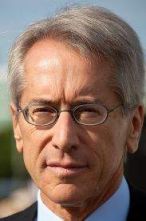
Terzi |
Terzi (di Sant'Agata), Giulio (Maria) (b. June 9, 1946, Bergamo, Italy), foreign minister of Italy (2011-13). He was ambassador to Israel (2002-04) and the United States (2009-11) and permanent representative to the United Nations (2008-09).
Terzic, Adnan (b. April 5, 1960, Zagreb, Croatia), governor of Central Bosnia canton (1997-98) and prime minister of Bosnia and Herzegovina (2002-07).
Tesarík, Martin (b. July 3, 1954, Prostejov, Czechoslovakia [now in Czech Republic]), governor of Olomoucký kraj (2008-12). He was mayor of Olomouc in 1998-2006.
Tesei, Donatella (b. June 17, 1958, Foligno, Umbria, Italy), president of Umbria (2019- ).
Tesfamariam Yohannes, Sophia (b. May 25, 1960, Asmara, Eritrea), Eritrean diplomat. She has been permanent representative to the United Nations (2019- ).
Tesfaye Dinka (b. 1939, Ambo, Ethiopia - d. Dec. 5, 2016, Fairfax, Va.), foreign minister (1989-91) and prime minister (1991) of Ethiopia.
Tesfaye Gebre-Egzy (b. July 1935, Arada, Addis Ababa, Ethiopia - d. [executed] Nov. 23, 1974, Addis Ababa), Ethiopian politician. He was permanent representative to the United Nations (1960-66) and information minister (1971-74).
Tesfaye Gebre Kidan (b. 1935, Gursum, Hararge, Ethiopia - d. June 2, 2004, Addis Ababa, Ethiopia), acting president of Ethiopia (1991). A longtime defense minister (1980-87) and then vice president, he was acting president for seven days after Marxist dictator Mengistu Haile Mariam fled the country in May 1991. When rebel forces rumbled into the capital, he took refuge in the Italian embassy, where he remained for the next 13 years. The former army colonel was tried in absentia for genocide and human rights violations committed during Mengistu's rule. Unconfirmed reports said Tesfaye died after a fight with Berhanu Bayih, a former foreign minister who had also taken refuge at the embassy. "It seems Tesfaye was hit on the head with a bottle. There were gashes on his head," said a hospital source.
Tesfaye Tadesse (b. Nov. 11, 1943, Kaffa region, Ethiopia), foreign minister of Ethiopia (1991). He was also permanent representative to the United Nations (1986-90).
Tesfaye Wolde-Selassie (b. Sept. 1, 1937, Sidamo province, Ethiopia - d. June 2011), minister of public and national security (1979-87) and internal affairs (1987-91) of Ethiopia.
Tesfaye Yilma Sabo (b. 1961), Ethiopian diplomat. He has been permanent representative to the United Nations (2023- ).
Teshabayev, Fatikh (Gulamovich) (b. Oct. 18, 1939 - d. March 11, 2005), Uzbek diplomat. He was permanent representative to the United Nations (1993-97) and ambassador to the United States (1994-96) and the United Kingdom (1997-2000).
Tessin, Carl Gustaf greve (b. Sept. 5, 1695, Stockholm, Sweden - d. Jan. 7, 1770, Bettna socken, Södermanland, Sweden), chancellery president of Sweden (1746-52). He was also Swedish minister to Austria (1725-26, 1735-36) and France (1739-42) and ambassador to Denmark (1743-44) and Prussia (1744-45).
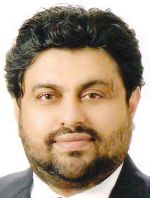
Tessori |
Tessori, Kamran, governor of Sindh (2022- ).
Testard, Jules Marcelin Albert (b. Nov. 17, 1814, Plougastel-Daoulas, Finistère, France - d. [killed] 1861, near Saigon, Cochinchina [now Ho Chi Minh City, Vietnam]), acting commandant of New Caledonia (1855-56).
Teta, Perikli (b. Aug. 11, 1941, Saint-Étienne, France - d. Jan. 23, 2007, Greece), defense minister (1991) and public order minister (1998) of Albania.
Tetenes, Spyridon (Iliou) (b. 1908, Braila, Romania - d. July 24, 1977, Geneva, Switzerland), foreign minister of Greece (1973-74). He was also ambassador to Yugoslavia (1967-73).
Tets van Goudriaan, Arnold Willem Nicolaas van (b. March 27, 1771, The Hague, Netherlands - d. Jan. 5, 1837, The Hague), governor of Noord-Holland (1814-28) and finance minister of the Netherlands (1828-37).
Tets van Goudriaan, Dirk Arnold Willem van (b. Oct. 3, 1844, The Hague, Netherlands - d. Jan. 25, 1930, The Hague), foreign minister of the Netherlands (1905-08); son of Jacob George Hieronymus van Tets van Goudriaan. He was also minister-resident to the Ottoman Empire (1884-94) and minister to Germany (1894-1905).
Tets van Goudriaan, Jacob George Hieronymus van (b. Dec. 7, 1812, Haarlem, France [now in Netherlands] - d. March 14, 1885, Nijmegen, Netherlands), king's commissioner of Zeeland (1853-58) and interior minister (1858-60) and finance minister (1861-62) of the Netherlands; grandnephew of Arnold Willem Nicolaas van Tets van Goudriaan.
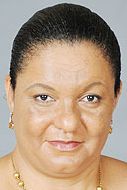
Tetteh | 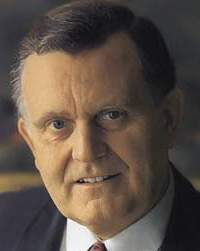
Teufel |
Tetteh, Hanna (Serwaa) (b. May 31, 1967, Szeged, Hungary), foreign minister of Ghana (2013-17). She was also minister of trade and industry (2009-13), director-general of the United Nations Office at Nairobi (2018-19), UN special representative to the African Union (2019-22), and UN special envoy for the Horn of Africa (2022- ).
Tetuán, Leopoldo O'Donnell (y Jorís), conde de Lucena, duque de (b. Jan. 12, 1809, Santa Cruz de Tenerife, Spain - d. Nov. 5, 1867, Biarritz, France), prime minister of Spain (1856, 1858-63, 1865-66). He was also minister of war (1854-56, 1858-63, 1865-66), foreign affairs (1858), navy (1858), and overseas (1863). He was created count in 1847 and duke in 1860.
Teufel, Erwin (b. Sept. 4, 1939, Rottweil, Württemberg [now in Baden-Württemberg], Germany), minister-president of Baden-Württemberg (1991-2005).
Teuira, Jacques, byname Jacky Teuira (b. Dec. 14, 1933), president of French Polynesia (1987).
Teulings, Frans, byname of Franciscus Gerardus Cornelis Josephus Marie Teulings (b. Nov. 15, 1891, 's-Hertogenbosch, Noord-Brabant, Netherlands - d. June 23, 1966, Vught, Noord-Brabant), interior minister of the Netherlands (1949-51 and [acting] 1951). He was also deputy prime minister and minister without portfolio (1951-52).
Tevi, Odo (b. 1973), Vanuatu official. He has been governor of the Reserve Bank of Vanuatu (2003-13) and permanent representative to the United Nations (2014- ).
Tévoédjrè, Albert (b. Nov. 10, 1929, Porto-Novo, Dahomey [now Benin] - d. Nov. 6, 2019, Porto-Novo), Beninese politician. He was minister of information (1960-63) and planning and employment promotion (1996-99), secretary-general of the African and Malagasy Union (1961-63), a presidential candidate (1991), and ombudsman (2006-13).
Tevosyan, Ivan (Fyodorovich) (also Ivan Tevadrosovich Tevosyan) (b. Jan. 4, 1902, Shusha, Russia [now in Artsakh, Azerbaijan] - d. March 30, 1958, Moscow, Russian S.F.S.R.), Soviet politician. He was people's commissar of the shipbuilding industry (1939-40), people's commissar/minister of ferrous metallurgy (1940-48, 1950-53) and metallurgy (1948-49, 1953-54), a deputy premier (1949-53, 1953-56), and ambassador to Japan (1956-58).
Tevyashev, Nikolay (Nikolayevich) (b. Aug. 13 [Aug. 1, O.S.], 1841, Kolybelka [now in Voronezh oblast], Russia - d. Dec. 7 [Nov. 24, O.S.], 1905, Tashkent, Russia [now in Uzbekistan]), governor-general of Turkestan (1904-05). He was also governor of Astrakhan (1890-95).
Tewary, Tribhuvan Prasad (b. July 17, 1923 - d. 2015), lieutenant governor of Pondicherry (1984-88).

Tewaney |
Tewaney Mencomo, Janaina (b. July 14, 1984, Panama City, Panama), interior minister (2020-22) and foreign minister (2022- ) of Panama.
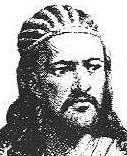
Tewodros |
Tewodros II, English Theodore II, original name Kassa Haile Mariam (b. c. 1818, Quara, near Lake Tana, Ethiopia - d. April 13, 1868, Magdala [now Amba Mariam], Ethiopia), emperor of Ethiopia (1855-68). He spent the early 1840s as a shifta (bandit) in the Tana region, before becoming governor of Quara province and later of the regions north and west of Lake Tana. In 1852, he launched a military campaign to gain control of Ethiopia. Having defeated his main rivals, he proclaimed himself emperor in 1855. Although he later made claims of Solomonic descent, he probably did not belong to the previously ruling dynasty. He deprived many local kings and princes of their power and appointed loyal administrators in their place in an effort to unify the country, but he continued to face rebellions. He created a professional national army for the first time and pressed European missionaries to establish an arms industry. He also clashed with the Ethiopian church. In 1862 he wrote a letter to Queen Victoria that remained unanswered for some time. Feeling insulted, he imprisoned some British missionaries and a British consul in 1863. An envoy was sent to obtain the captives' release but he was held up for more than a year and ultimately he and his two aides also ended up jailed. Meanwhile Tewodros had lost control of much of the country and had apparently decided to exploit the hostages to gain more British support. In 1867, however, Britain sent a military expedition to rescue the prisoners. In the ensuing Anglo-Ethiopian War, the British were aided by rebellious nobles and attacked Tewodros' stronghold at Magdala on April 10, 1868. He refused to surrender and, with the fortress about to be stormed, shot himself.
Tewu, Carlo Brix (b. Sept. 13, 1962, Tondano, Sulawesi Utara, Indonesia), acting governor of Sulawesi Barat (2016-17).
Textor, Johann Wolfgang (b. Dec. 11, 1693, Frankfurt am Main [Germany] - d. Feb. 6, 1771, Frankfurt am Main), senior mayor (1738-39, 1741-42, 1743-44) and Stadtschultheiss (1747-71) of Frankfurt. He was a grandfather of writer Johann Wolfgang von Goethe.
Teziyev, Oleg (Dzherikhanovich) (b. 1948), prime minister of South Ossetia (1991-93).
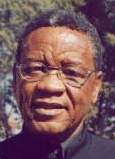
Thabane |
Thabane, Tom, byname of Motsoahae Thomas Thabane (b. May 28, 1939, Maseru, Basutoland [now Lesotho]), prime minister (2012-15, 2017-20) and defense minister (2019-20) of Lesotho. In 1966-70 he was first clerk assistant to the Senate and deputy to the clerk of the Senate in the parliament of Lesotho. In 1970-72 he worked in the ministries of health and education as assistant secretary (administration). He served as principal secretary in various ministries, including justice (1972-76), health (1978-83), foreign affairs (1983-85), and interior (1985-86). He was secretary to the ruling Military Council and also political adviser to the military in 1986-88. In 1988-90 he was the government secretary. In 1990-91 he was minister of foreign affairs, information and broadcasting. He escaped to South Africa after a military coup in April 1991, but returned following the April 1993 democratic elections. From March to June 1994, he joined the Independent Electoral Commission as provincial office administrator for the Free State in South Africa. From 1995 to 1998 he was a special political adviser to Prime Minister Ntsu Mokhehle. He was elected member of parliament for the Abia constituency in the 1998 general elections, and appointed foreign minister. He travelled extensively worldwide. In 2002 he became home affairs minister, serving until 2004 when he became communications minister. In October 2006 he resigned and crossed the floor with 17 other members of the ruling Lesotho Congress for Democracy (LCD), forming the All Basotho Convention. After the 2012 election his party teamed up with the LCD and the Basotho National Party to share power and oust the reviled prime minister Pakalitha Mosisili (who had split from the LCD earlier in the year). In 2014 he dissolved parliament to avoid a pending vote of no confidence; this was followed by what appeared like a coup, during which he fled to South Africa. With South African mediation, early elections were arranged for 2015, following which Mosisili was again able to form a government. A no-confidence vote in 2017 led to another election which allowed Thabane to form a four-party coalition government. In 2020 he and his current wife were named as suspects in the 2017 murder of his former wife; he denied any wrongdoing but ultimately bowed to pressure to resign. Charges against both were dropped in 2022.

Thaçi |
Thaçi, Hashim (b. April 24, 1968, Brocna [Burojë] village, near Srbica [Skënderaj], Kosovo, Serbia), prime minister (2008-14), foreign minister (2014-16), and president (2016-20) of Kosovo.
Thackeray, Bal(asaheb Keshav) (b. Jan. 23, 1927, Pune [now in Maharashtra], India - d. Nov. 17, 2012, Mumbai, India), Indian politician. He was the founder (1966) of the Shiv Sena party.
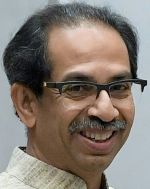
U. Thackeray | 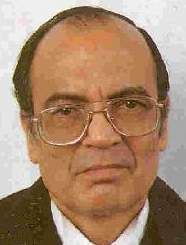
Thakkar |
Thackeray, Uddhav (Balasaheb) (b. July 27, 1960, Bombay [now Mumbai], India), chief minister of Maharashtra (2019-22); son of Bal Thackeray.
Thahane, Timothy (Thahane) (b. Nov. 2, 1940, Leribe, Basutoland [now Lesotho]), finance minister of Lesotho (2002-12). He was also ambassador to the United States (1979-80) and minister of energy, meteorology, and water affairs (2012-13).
Thakkar, C(hunilal) K(arsandas), also spelled Thakker (b. Nov. 10, 1943), acting governor of Maharashtra (2002). He was chief justice of the Bombay High Court (2001-04).
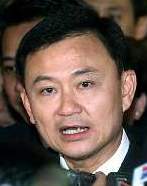
Thaksin |
Thaksin Shinawatra (b. July 26, 1949, Chiang Mai, Thailand), prime minister of Thailand (2001-06); brother-in-law of Somchai Wongsawat. He joined the police force in 1973; after having attained the rank of lieutenant colonel, he left the force in 1987 to concentrate on his businesses. He was granted several exclusive telecommunications concessions, which enabled him to rapidly acquire a vast fortune. He served for three months as foreign minister in 1994-95 and in May 1995 assumed leadership of the Palang Dharma Party after winning a legislative seat in Bangkok. On the party's entrance into Prime Minister Banharn Silpa-archa's government coalition, he served briefly as deputy prime minister, and he held that post a second time under Chavalit Yongchaiyudh in 1997. In 1998 he formed the Thai Rak Thai (Thais Love Thais) party. One of Thailand's richest men, he promised to use his business savvy to restore Thailand's fortunes after the 1997 Asian financial crisis. He led his party to a convincing win in the elections on Jan. 6, 2001, and was appointed prime minister on February 9. On April 3 the National Countercorruption Commission prosecuted him before the Constitutional Court for failure to disclose his assets fully, but he was acquitted by an 8-7 vote on August 3. Adopting a CEO-style approach to governing, he nurtured his core constituency in the countryside with virtually free health care, a three-year debt suspension program for farmers, and low-interest loans for poor villages. In 2005 he won a landslide reelection. Allegations that he used his premiership to boost the fortunes of his business empire and enrich his family were a major factor in his ouster in a 2006 military coup, which followed months of street demonstrations calling for him to step down. He lived in exile in England (where he bought the Manchester City football club) until returning in February 2008. In August 2008 he jumped bail and fled again to England; in October a Thai court found him guilty of a corruption charge and sentenced him to 2 years in prison. In November 2008 he moved to Dubai. In February 2010 a court ordered the seizure of $1.4 billion of his assets. In March 2010 Montenegro was reported to have granted him citizenship. However, he continues to live in Dubai.
Thakur, D(evi) D(as) (b. 1930, Batroo village, Doda district, Jammu and Kashmir, India - d. Feb. 3, 2007, Chandigarh, India), governor of Assam and Arunachal Pradesh (1990-91).
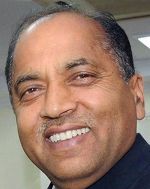
J.R. Thakur |
Thakur, Jai Ram, also spelled Jairam Thakur (b. Jan. 6, 1965, Tandi village, Mandi district, Himachal Pradesh, India), chief minister of Himachal Pradesh (2017-22).
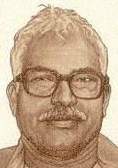
K. Thakur | 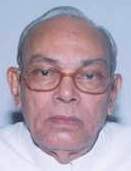
R. Thakur |
Thakur, (Jan Nayak) Karpoori (b. Jan. 24, 1924, Pitaunjhia, Samastipur district, Bihar, India - d. Feb. 18, 1988), chief minister of Bihar (1970-71, 1977-79).
Thakur, Rameshwar (b. July 28, 1927, Godda district, Bihar, India - d. Jan. 15, 2015), governor of Orissa (2004-07), Andhra Pradesh (2006-07), Karnataka (2007-09), and Madhya Pradesh (2009-11).
Thalassinós, Pablo Antonio (b. 1945, Panama City, Panama), Panamanian politician. He was education minister (1994-99) and permanent representative to the United Nations (2009-14).
Thalmann, Ernesto (Agostino Ulderico) (b. Jan. 14, 1914, Bellinzona, Switzerland - d. Feb. 12, 1993, Bern, Switzerland), Swiss diplomat. He was chargé d'affaires in Czechoslovakia (1952-53) and the United States (1960), permanent observer to the United Nations (1961-66), and ambassador to the United Kingdom (1976-79).
Thaly, Gabriel Henri Joseph (b. Oct. 26, 1875, Saint-Pierre, Martinique - d. Aug. 12, 1967, Paris, France), acting governor of the French Settlements in Oceania (1921, 1921-22) and New Caledonia (1930), governor of French Guiana (1926-27), and French resident commissioner of the New Hebrides (1929-30).
Thamae, Tseliso, Lesotho diplomat. He was chargé d'affaires at the United Nations (1980-83) and ambassador to the United States (1991-93).
Thambi Durai, M(unisamy) (b. March 15, 1947, Chinthagampalli, Salem district, Madras province [now in Krishnagiri district, Tamil Nadu state], India), law and justice minister of India (1998-99). He was also minister of surface transport (1998-99).

Thambwe |
Thambwe Mwamba, Alexis (b. May 6, 1943, Longa, Costermansville province, Belgian Congo [now in Maniema province, Congo (Kinshasa)]), foreign minister of Congo (Kinshasa) (2008-12 and [acting] 2019). He was also minister of public works (1985-86, 1996-97), state investments (1986-88), planning (2003-06), and justice (2014-19) and president of the Senate (2019-21).
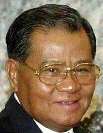
Than Shwe |
Than Shwe (b. Feb. 2, 1933, Kyaukse, Burma [now Myanmar]), chairman of the State Law and Order Restoration Council (1992-97) and the State Peace and Development Council (1997-2011) and prime minister (1992-2003) of Myanmar. At age 20, he enlisted as an officer-cadet in the Burmese army. He first saw combat fighting ethnic rebels, before being posted to a roving psychological-warfare unit. In 1962, after Burma's first military dictator Ne Win seized power, Than Shwe was chosen to head the Central School of Political Science at Phaunggyi. He returned to active service four years later and rose through the ranks. When pro-democracy unrest broke out in 1988, Ne Win fell from power and a military junta, the State Law and Order Restoration Council, took control. Than Shwe became its vice-chairman and a trusted right-hand man of its chairman, Gen. Saw Maung. Elections were held in 1990, which to the military's great surprise were won by the upstart National League for Democracy (NLD), headed by Aung San Suu Kyi. The military never allowed the NLD to take power, and after Than Shwe became the junta's leader in 1992, he officially voided the election results; he has kept Suu Kyi under house arrest most of the time since. Than Shwe, who soon after taking over assumed the rank of senior general, was equally ruthless with his rivals within the military. In 2004 he sacked Gen. Khin Nyunt, prime minister and powerful chief of the pervasive military intelligence organization. Than Shwe dismantled the entire military intelligence network, placed Khin Nyunt under house arrest, and imprisoned or purged hundreds of his followers. He secretly built a new capital near the once-obscure logging town of Pyinmana and moved his government there in 2006 in a clear expression of his desire to rule in total secrecy and isolation. In 2011 under a new constitution a civilian president was chosen, but Than Shwe was set to remain the most powerful man in the country as head of a new State Supreme Council.
Than Swe (b. June 19, 1953), foreign minister of Myanmar (2023- ). He was also permanent representative to the United Nations (2009-12) and ambassador to the United States (2012-13).
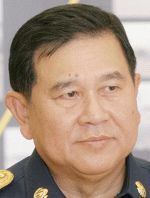
Thanasak |
Thanasak Patimaprakorn (b. Nov. 9, 1953), foreign minister of Thailand (2014-15).
Thanat Khoman (b. May 9, 1914 - d. March 3, 2016, Bangkok, Thailand), foreign minister of Thailand (1959-71). He was also chargé d'affaires in the United States (1946-47) and India (1947-49), acting permanent representative to the United Nations (1952-57), ambassador to the United States (1957-59), and a deputy prime minister (1980-82).
Thanhawla, Lal (b. May 19, 1942, Durtlang, Assam [now in Mizoram], India), chief minister of Mizoram (1984-86, 1989-98, 2008-18).
Thani, Abdullah al-, also spelled al-Thinni (b. Jan. 7, 1954, Kano, Nigeria), defense minister (2013-14) and prime minister (2014-21) of Libya.
Thani, Alya Ahmad Saif Al (b. 1974, Doha, Qatar), Qatari diplomat. She has been permanent representative to the United Nations (2013- ).
Thani, Meshal Hamad Muhammad Jabir Al (b. Sept. 7, 1975, Qatar), Qatari diplomat. He was ambassador to Belgium (2007-11) and permanent representative to the United Nations (2011-13).
Thanin Kraivichien (b. April 5, 1927, Bangkok, Siam [now Thailand]), prime minister of Thailand (1976-77).

Thanom |
Thanom Kittikachorn (b. Aug. 11, 1911, Ban Nhong Ploung, Tak province, Siam [now Thailand] - d. June 16, 2004, Bangkok, Thailand), defense minister (1957-71, 1972-73), prime minister (1958, 1963-73), and foreign minister (1971-73) of Thailand. Graduating from the Royal Thai Military Academy in 1929, he was a major general by 1951. He assisted Field Marshal Sarit Thanarat in his 1957 coup against Plaek Pibulsongkram and became defense minister and temporarily prime minister before Sarit took over the government; in 1959 he became deputy prime minister. After Sarit's death in December 1963, Thanom succeeded him as prime minister and soon after (January 1964) was made field marshal. He ruled the country mostly under martial law at a time when the country was a staunch ally of the United States during the Vietnam War. He is best known for staging a bloodless coup in 1971 against his own elected government, which had faced growing opposition in parliament. Thanom and his powerful deputy, Field Marshal Prapass Charusathira, were ousted in 1973 after weeks of bloody pro-democracy street protests in Bangkok. On Oct. 14, 1973, more than 70 protesters died in clashes with soldiers, prompting revered King Bhumibol Adulyadej to intervene in politics for the first time and push the ruling generals into exile. The two field marshals and Thanom's son Col. Narong Kittikachorn were branded by pro-democracy students as "the Tyrant Trio." Thanom's quiet return to Thailand in 1976 as a Buddhist monk after a three-year exile in the United States triggered bloody clashes between pro-democracy and right-wing students that ended in another military coup. His appointment as an honorary member of the royal guard in 1999 again sparked off heavy protests; Thanom refused the appointment under public pressure.
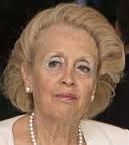
Thanou |
Thanou(-Christophilou), Vassiliki (b. 1950, Chalkida, Greece), interim prime minister of Greece (2015). She became president of the Supreme Court on July 1, 2015.
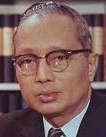
Thant |
Thant (b. Jan. 22, 1909, Pantanaw, Burma [now Myanmar] - d. Nov. 25, 1974, New York City), secretary-general of the United Nations (1962-71). In 1942 he was a member of educational committees in the government of Japanese-occupied Burma. After World War II he was persuaded by Nu and Gen. Aung San, leaders of the Anti-Fascist People's Freedom League, to enter government service. He became press director in 1947, director of broadcasting in 1948, and secretary in the Ministry of Information in 1949. He was a member of the Burmese delegation to the UN in 1952-53, and after holding various posts back in Rangoon, returned to the UN as Burma's permanent representative in 1957. In 1959 he served as vice president of the UN General Assembly. After the death of Secretary-General Dag Hammarskjöld, he was elected acting secretary-general (as a compromise choice acceptable to both superpowers) on Nov. 3, 1961, and permanent secretary-general on Nov. 30, 1962; he was reelected on Dec. 2, 1966, for a term ending Dec. 31, 1971. Neutralist by practice as well as inclination, he criticized at different times both West and East for actions he considered inimical to world peace. He continued the Hammarskjöld tradition by exercising discretion, by keeping himself available to all national representatives, and by trying to forestall problems before they became insurmountable; like his predecessor, he considered the UN to be first and last a world instrument for sustained negotiation. After his death his body was seized by Rangoon university students and monks on Dec. 5, 1974, and buried in a hastily built mausoleum at the university, in protest against the simple burial that was planned; police retrieved it by force on December 11, causing rioting and a declaration of martial law by the military regime.
Thaon di Revel, Paolo Ignazio Maria (b. May 2, 1888, Toulon, France - d. June 1, 1973, Ternavasso, Torino province [now Torino metropolitan city], Italy), finance minister of Italy (1935-43). He was also mayor of Turin (1929-35).
Thapa, Arjun Bahadur (b. Jan. 12, 1956, Sat, Mohariyakot, Lamjung district, Nepal), secretary-general of SAARC (2014-17). He was also Nepalese acting permanent representative to the United Nations (2005-06) and ambassador to the United Arab Emirates (2007-12).
Thapa, Bhekh Bahadur (b. March 4, 1937, Kathmandu, Nepal), finance minister (1975-78) and foreign minister (2004) of Nepal. He was also ambassador to the United States (1980-86) and India (1997-2004).
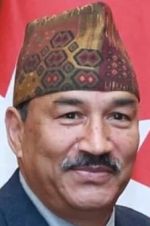
K. Thapa |
Thapa, Kamal (b. Aug. 4, 1955), foreign minister (1997-98, 2015-16) and home minister (2004, 2005-06) of Nepal. He was also minister of local development (1995-97), housing and physical planning (1997), information and communication (2003-04), federal affairs and local development (2017), energy (2017-18), and urban development (2018) and a deputy prime minister (2017-18). After King Gyanendra had to give up his absolute rule, Thapa and other former ministers of the royalist government were arrested on May 12, 2006. He was released Feb. 14, 2007.
Thapa, Ram Bahadur, byname Badal (b. May 2, 1955, Gulmi, Nepal), defense minister (2008-09) and home affairs minister (2018-21) of Nepal.

S.B. Thapa |
Thapa, Surya Bahadur (b. March 21, 1928, Muga village, Dhankuta district, Nepal - d. April 15, 2015, New Delhi, India), prime minister (1963-64, 1965-69, 1979-83, 1997-98, 2003-04) and foreign minister (1981-82, 2003-04) of Nepal. In 1958, he was elected to the assembly and became chairman of the advisory council. In 1959, he was elected to the upper house. He was appointed minister of agriculture, forest, and industry in 1960 and minister of finance and economic affairs in 1962. In 1963, he was appointed prime minister for the first time. In 1965-66 he was also minister of home and panchayat affairs. In 1967, he released B.P. Koirala, who was in jail for seven years. In October 1972, he was arrested when he demanded democratic reform in a 13-point resolution; he spent two years in jail. When he became prime minister again in 1979, he provided amnesty to all exiled political leaders. In 1990, a multiparty system came into being. Thapa started the National Democratic Party (Rastriya Prajatantra Party; RPP) and became the president of the party, while his former royalist colleague Lokendra Bahadur Chand was chosen leader of the party's parliamentary wing. This division of responsibilities evolved into a deep political divide and, eventually, a full-blooded power struggle. In a 1994 by-election, he was elected to the House of Representatives. In 1995, his party actively supported Congress to form a coalition government. In 1997 Thapa, accusing Chand of being a pawn in the hands of Communists, walked out with 13 supporters from the six-month-old coalition headed by Chand, which was dominated by the Unified Marxist-Leninist party. Thapa became prime minister again, leading a coalition government of the RPP, the Nepali Congress, and the Nepal Sadbhavana Party. In 2003 he was appointed by the king against the preference of the main political parties. In 2005 he founded the National People's Power Party (Rastriya Janashakti Party).
Tharawadi Min,1 Tharawadi also spelled Tharrawaddy (b. March 14, 1787, Amarapura, Kingdom of Awa [now Myanmar] - d. Nov. 17, 1846, Amarapura), king of Awa (1837-46). He raised a rebellion on Feb. 24, 1837, and conquered Awa on April 7. He became king after the abdication on April 15 of his elder brother Bagyidaw, who had been obliged to sign the humiliating Treaty of Yandabo that ceded the provinces of Arakan and Tenasserim to the British. One of Tharawadi's earliest public acts was to repudiate the treaty. He was determined to rid Burma of the British resident, a symbol of its humiliation. Henry Burney was forced to leave in June 1837, and Tharawadi did not recognize his successor, Richard Benson, because he too was a representative of the government of India, and Tharawadi demanded the right to deal with a direct representative of the British monarch. The residency was withdrawn in 1840, and diplomatic relations remained broken. In 1841 Tharawadi sailed to Rangoon at the head of a large flotilla of war-boats for a pilgrimage to the Shwedagon pagoda. War was only avoided because the Indian governor-general's attention at the time was concentrated on Afghanistan, as it was later by other problems, so that the Awa question was neglected although Tharawadi caused the British authorities considerable uneasiness. His sabre-rattling appeared to be intended to compel the British to negotiate about the lost territories; at the same time he was careful not to be overly provocative. In his later years he became increasingly subject to mental instability and was finally placed under restraint; his son Pagan Min, who had taken control of the government, succeeded as king after Tharawadi's death.
1 Literally "Prince of Tharawadi," a style conferred before accession; used colloquially instead of the very complex official name as king.
Tharp, William (b. Nov. 27, 1803, near Farmington, Del. - d. Jan. 1, 1865, Milford, Del.), governor of Delaware (1847-51).
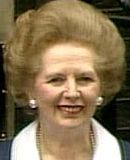
Thatcher |
Thatcher (of Kesteven), Margaret (Hilda) Thatcher, Baroness, née Roberts (b. Oct. 13, 1925, Grantham, Lincolnshire, England - d. April 8, 2013, London, England), British prime minister (1979-90). She first stood for Parliament in 1950 but was not successful until 1959, when she was selected to fight the relatively "safe" Conservative constituency of Finchley, in North London. She was joint parliamentary secretary to the Ministry of Pensions and National Insurance (1961-64) and secretary of state for education and science (only the second woman ever to become a Conservative cabinet minister) under Prime Minister Edward Heath (1970-74). She succeeded Heath as Conservative leader in 1975 after the party's loss of two general elections in 1974. The Conservatives' decisive victory in the 1979 general elections elevated her to the prime ministry; she was Europe's first woman prime minister. She lived up to the appellation of "Iron Lady" (which originated in the Soviet press in 1976) by her strict dominance over the ministers of her cabinet, the pursuance of a strong monetarist policy, increased subjection of trade unions to legal constraints, and privatization of state-owned enterprises. Her term in office saw the growth of a substantial underclass. In 1982 Britain successfully recaptured the Falkland Islands following a 10-week Argentine occupation. Her leadership during that conflict helped give her a landslide victory in the 1983 elections. In 1987 she became the first British prime minister in the 20th century to win three consecutive terms. But her position grew increasingly fragile after the introduction of the unpopular "poll tax," and Gallup polls found that she had become the least popular British prime minister on record. She had to resign in 1990 when she lost support in her own party. In 1992 she was made a baroness.
Thatcher, Maurice H(udson) (b. Aug. 15, 1870, Chicago, Ill. - d. Jan. 6, 1973, Washington, D.C.), governor of the Panama Canal Zone (1910-13).

Thawan | 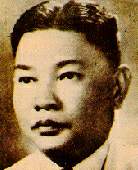
Thawi |
Thawan Thamrongnawasawat (b. Nov. 21, 1901, Ayutthaya province, Siam [now Thailand] - d. Dec. 3, 1988), interior minister (1939-41), prime minister (1946-47), and foreign minister (1947) of Thailand.
Thawi Bunyaket (b. Nov. 10, 1904, Bangkok, Siam [now Thailand] - d. Nov. 3, 1971), prime minister of Thailand (1945). He was also minister of education (1944-45).
Thawr, Ali Lutfi al- (b. Sept. 18, 1940), foreign minister of Yemen (Sana) (1980-84). He was also minister of the treasury (1969-70), economy (1973-74, 1974-76), and development (1978-80).
Thayeb, (Teuku Mohammad) Hadi (b. Sept. 14, 1922, Peureulak, Aceh, Netherlands East Indies [now Indonesia] - d. Jan. 10, 2014, Jakarta, Indonesia), governor of Aceh (1981-86). He was also Indonesian ambassador to Italy (1961-65), Poland (1970-74), Saudi Arabia (1979-81), Switzerland (1987-90), and the United Kingdom (1990-92) and minister of basic industry (1965-66).
Thayeb, (Teuku Mohammad) Syarif, also spelled Sjarif Thajeb (b. Aug. 7, 1920, Peureulak, Aceh, Netherlands East Indies [now Indonesia] - d. Nov. 3, 1989, Jakarta, Indonesia), acting foreign minister of Indonesia (1977). He was also minister of higher education and science (1964-66) and education and culture (1974-78) and ambassador to the United States (1971-74).
Thayer, John M(ilton) (b. Jan. 24, 1820, Bellingham, Mass. - d. March 19, 1906, Lincoln, Neb.), governor of Wyoming (1875-78) and Nebraska (1887-91 and [acting] 1891-92).
Thayer, William W(allace) (b. July 15, 1827, Lima, N.Y. - d. Oct. 15, 1899, Woodstock, Ore.), governor of Oregon (1878-82).
Thayer Arteaga, William (Turpin) (b. Oct. 12, 1918, Santiago, Chile - d. May 28, 2018, Santiago), justice minister of Chile (1968). He was also minister of labour and social security (1964-68).
Thegner, Olof Arvidsson friherre (b. Dec. 25, 1615, Vist socken, Östergötland, Sweden - d. March 8, 1689, Stockholm, Sweden), governor of Uppland (1685-89). He was made friherre (baron) in 1687.
Thein Maung (b. July 17, 1890, Paungde, Burma [now Myanmar] - d. March 11, 1975, Rangoon, Burma [now Yangon, Myanmar]), foreign minister of Burma (1958-60). He was also minister of education (1936-37) and justice (1943-45), chief justice (1952-57), deputy prime minister (1958-59), and ambassador to China (1970-74). Commonly titled U Thein Maung, he is not to be confused with Dr. Thein Maung (b. 1891 - d. 1945?), who was minister of commerce and industry (1938-42) and finance (1942-43) and ambassador to Japan (1943-45).

Thein Sein |
Thein Sein (b. April 20 or May 11, 1945, Kyonku, Burma [now Myanmar]), prime minister (2007-11) and president (2011-16) of Myanmar. A former regional commander in northern Myanmar, he was appointed to the position of secretary-2 in the junta in August 2001. He was promoted to secretary-1 in October 2004 after the then-secretary-1 Soe Win was appointed prime minister. He became acting prime minister for several months in 2007 when Soe Win was confined to illness, and succeeded the latter after he died; he was then promoted to general. He also held the high-profile position of chairman of the National Convention Convening Commission. In April 2010, he took what analysts described as his total obedience to junta leader Than Shwe to new heights, dropping his military ranks and uniform to form a political party. He applied to register the United Solidarity and Development Party (USDP), which won sweeping control of the new parliament elected in November. In February 2011 the parliament elected him president.
Theisen, Rasmus (b. Sept. 16, 1837 - d. May 13, 1908), governor of Nordlands amt (1890-1908). He was also mayor of Bodø (1876-77, 1879).

Thémereau |
Thémereau, Marie-Noëlle, née Billet (b. May 18, 1950, Darnets, Corrèze, France), president of the government of New Caledonia (2004-07).
Themptander, (Oscar) Robert (b. Feb. 14, 1844, Stockholm, Sweden - d. Jan. 30, 1897, Stockholm), finance minister (1881-86) and prime minister (1884-88) of Sweden and governor of Stockholm (1888-96).
Theocharis, Riginos (b. 1929, Larnaca, Cyprus - d. Oct. 24, 2018), finance minister of Cyprus (1959-62). He was also governor of the Bank of Cyprus (1962-76).
Théodor, (Louis) Léon (b. March 20, 1853, Tienen, Belgium - d. June 19, 1934, Brussels, Belgium), justice minister of Belgium (1925).
Théodore, (Joseph) Davilmar (b. 1847, Ouanaminthe, Haiti - d. Jan. 12, 1917, Port-au-Prince, Haiti), president of Haiti (1914-15). He was also president of the Senate (1911-12).
Theodore, Edward Granville (b. Dec. 29, 1884, Port Adelaide, South Australia - d. Feb. 9, 1950, Edgecliff, Sydney, N.S.W.), premier of Queensland (1919-25) and treasurer of Australia (1929-30, 1931-32).
Théodore, René (b. June 23, 1940, Ouanaminthe, Haiti - d. June 1, 2003, Miami, Fla.), Haitian politician; great-grandnephew of Davilmar Théodore. An active member of the Haitian Unified Communist Party, he was forced into exile in 1967 during the 29-year dictatorship of François and Jean-Claude Duvalier. Théodore lived in France and in the Soviet Union, where he worked as an anchorman for Radio Moscow's Creole news broadcasts. In 1979 he became the Communist Party's secretary-general in exile and he returned to Haiti in 1986 when a popular uprising ousted Jean-Claude Duvalier. Having garnered a wide following among Haitian youth and the urban poor, he founded a new party, the Movement for National Reconstruction, but quickly lost support when he unsuccessfully opposed Jean-Bertrand Aristide, then a popular Catholic priest, for the presidency in December 1990. Aristide won in a landslide, and the Communist Party disintegrated. When the army ousted Aristide in a bloody coup in September 1991, the United States backed Théodore's 1992 attempt to become prime minister and work out a compromise with the military. The effort failed after soldiers attacked a meeting he was attending and fatally shot his bodyguard. U.S. troops intervened in 1994 and restored Aristide to power. Accusing Aristide of trying to establish one-party rule, Haiti's opposition was at loggerheads with the president since his Lavalas Family party swept flawed elections in 2000. Théodore, who began his 47-year activist career in high school, performed his last political act in December 2002 by co-signing an opposition declaration calling for Aristide's resignation.
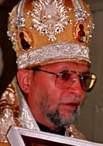
Theodosius |
Theodosius, original name Theodore Lazor (b. Oct. 27, 1933, Canonsburg, Pa. - d. Oct. 19, 2020, Canonsburg), metropolitan of America (1977-2002). In 1961 he took monastic vows and was ordained to the deaconate and priesthood. In 1961-66 he served as rector of the Nativity of the Holy Virgin Church, Madison, Ill., and as an assistant military chaplain. On May 6, 1967, while secretary to Metropolitan Ireney, he was elevated to the episcopacy at the Cathedral of the Holy Virgin Protection in New York City, and given the title of Bishop of Washington, D.C. - at the time an Auxiliary See. That same year he was elected Bishop of the Diocese of Alaska, a position he held until 1972. During his tenure in the church's oldest diocese, he was credited with the revival of parish life. He also oversaw the costly and monumental task of rebuilding Sitka's historic Archangel Michael Cathedral, the work of Saint Innocent Veniaminov, which had sustained immense damage in a fire. With the Moscow Patriarchate's proclamation of autocephaly, he headed the delegation from America which traveled to Moscow in May 1970 to formally accept the Tomos of Autocephaly - the decree of self-governance - from the Russian Orthodox Church. As Bishop of Alaska, he hosted one of the first official acts of the new autocephalous church: the solemn canonization of Father Herman of Spruce Island, one of the original missionaries who began their ministry on Kodiak Island in 1794. The Holy Synod transferred Theodosius to the Diocese of Pittsburgh in 1972. After Ireney's retirement, Bishop Theodosius was elected Archbishop of New York and Metropolitan of All America and Canada in 1977. After the Holy Synod's 1980 decision to establish a new diocese as the seat of the American primate, Metropolitan Theodosius bore the title of Archbishop of Washington, D.C.
Theofili, Maria (b. Athens, Greece), Greek diplomat. She was ambassador to France and Monaco (2015-17) and permanent representative to the United Nations (2017-22).
Theophilakt, secular name Fyodor (Gavrilovich) Rusanov (b. 1765 - d. July 31 [July 19, O.S.], 1821), exarch of Georgia (1817-21). He was also bishop of Kaluga (1799-1803) and archbishop of Kaluga (1803-09) and Ryazan (1809-17).
Theophilus, secular name Fyodor (Nikolayevich) Pashkovsky (b. Feb. 18 [Feb. 6, O.S.], 1874, Kiev province, Russia [now in Ukraine] - d. June 27, 1950, San Francisco, Calif.), metropolitan of All America and Canada (1934-50). He was also archbishop of Chicago (1922-31) and San Francisco (1931-50).
Theotokis, Georgios (Nikolaou-Andrea) (b. 1844, Corfu, Ionian Islands [now in Greece] - d. Jan. 25 [Jan. 12, O.S.], 1916, Athens, Greece), prime minister of Greece (1899-1901, 1903, 1903-04, 1905-09). He was also minister of marine (1886-90), education (1889-90, 1900, 1915), interior (1890, 1892-93, 1897, 1899-1901, 1903-04), foreign affairs (1903), military (1905-09), and economy (1915-16).
Theotokis, Ioannis (Georgiou) (b. 1880 - d. June 6, 1961, Corfu, Greece), prime minister of Greece (1950); son of Georgios Theotokis. He was also minister of agriculture (1932-33, 1933-34, 1935, 1946), foreign affairs (1935), interior (1946), public order (1946), mercantile marine (1946), military (1950), aviation (1950), and marine (1950), deputy prime minister (1935), and president of the Vouli (1946-49).
Theotokis, Spyros, byname of Spyridon (Ioannou) Theotokis (b. 1908, Corfu, Greece - d. Sept. 6, 1988), foreign minister (1955-56), finance minister (1961-63), and interior minister (1967) of Greece; son of Ioannis Theotokis. He was also minister of provisioning (1944, in exile), public order (1946), agriculture (1957), and hygiene (1967).

Thériault |
Thériault, Camille (Henri) (b. Feb. 25, 1955, Baie-Sainte-Anne, N.B.), premier of New Brunswick (1998-99). He was first elected to the New Brunswick Legislative Assembly on Oct. 13, 1987, as MLA for Kent South. He served as chairperson of the Public Accounts Committee and was a member of the Standing Committee on Estimates. Reelected Sept. 23, 1991, he became Minister of Fisheries and Aquaculture on Oct. 9, 1991. He was a member of the Board of Management cabinet committee and chairperson of the Select Committee on Representation and Electoral Boundaries. He co-chaired the Ministerial Committee on Creating New Options. On April 27, 1994, he became Minister of Advanced Education and Labour. He was also a member of the cabinet committee on Policy and Priorities. Following his reelection on Sept. 11, 1995, he was appointed Minister of Economic Development and Tourism. He also assumed responsibility for the Information Highway Secretariat. He became leader of the provincial Liberal Party on May 2, 1998, and was sworn in as the 29th premier of New Brunswick on May 14. But in the following year he never put his mark on the government. He sensed that voters were stinging from the years of austerity under Premier Frank McKenna, but could only distance himself so far when he had been a senior cabinet minister while the cuts were made. And he could not reproduce the camera-friendly, high-energy style of his predecessor. The Liberals were defeated in the 1999 election.
Thesen, Gudbrand (b. July 17, 1792, Næs [now Åndalsnes], Romsdals amt [now Møre og Romsdal fylke], Norway - d. June 10, 1866, Christiansund [now Kristiansund], Romsdals amt), governor of Romsdals amt (1840-53).
Thesleff, Wilhelm (Alexander) (b. July 27, 1880, Vyborg, Russia - d. March 26, 1941, Helsinki, Finland), war minister of Finland (1918). He was also commander-in-chief of the army (1918).
Thestrup, Hans Nicolai (b. Oct. 1, 1794, Vejlø, Denmark - d. May 1, 1879, Copenhagen, Denmark), war minister of Denmark (1859-63). He was also navy minister (1859-60).
Theunis, Georges (Émile Pierre Léonard) (b. Feb. 28, 1873, Montegnée, Belgium - d. Jan. 4, 1966, Brussels, Belgium), finance minister (1920-25), prime minister (1921-25, 1934-35), and defense minister (1932) of Belgium. He was also governor of the National Bank (1941-44).
Theux de Meylandt, Barthélemy Théodore, chevalier (from 1840, comte) de (b. Feb. 27, 1794, Sint-Truiden, Austrian Netherlands [now Belgium] - d. Aug. 21, 1874, Heusden, Belgium), cabinet chief of Belgium (1834-40, 1846-47, 1871-74). He was also interior minister (1831-32, 1834-40, 1846-47) and foreign minister (1836-40).
Thévenet, François (Marie) (b. April 6, 1845, Lyon, France - d. April 7, 1910, Paris, France), justice (and worship) minister of France (1889-90).
Thevenoux, Sophie, née Solamito (b. May 19, 1957, Monaco), finance and economy minister of Monaco (2009-11). She was also ambassador to France (2011-15) and Belgium, the Netherlands, and Luxembourg (2015-20).
Thi Han (b. 1912 - d. May 17, 1999), foreign minister of Burma (1962-69). He was also minister of trade development, commodity distribution, and cooperatives (1959-60), public works, housing, mines, and labour (1962-64), and national planning (1964-69).
Thiam, Amadou (b. Aug. 5, 1923, Dakar, Senegal - d. Jan. 6, 2009, Rabat, Morocco), Ivorian politician; nephew-in-law of Félix Houphouët-Boigny. He was minister of information (1963, 1978-86), ambassador to Morocco (1966-78, 1988-96), and a minister of state (1986-88).
Thiam, Doudou (b. Feb. 3, 1926, Bambey, Senegal - d. July 6, 1999, Geneva, Switzerland), foreign minister (1960-62, 1962-68) and justice minister (1962) of Senegal.
Thiam, Habib (b. Jan. 21, 1933, Dakar, Senegal - d. June 26, 2017, Dakar), prime minister of Senegal (1981-83, 1991-98). He was also minister of planning and development (1963-68) and rural development (1968-73) and president of the National Assembly (1983-84).
Thiam, Iba Der (b. Feb. 26, 1937, Kaffrine, Senegal - d. Oct. 31, 2020, Dakar, Senegal), Senegalese politician. He was minister of education (1983-88) and a minor presidential candidate (1993, 2000).
Thiam, Tidjane (b. July 29, 1962, Abidjan, Ivory Coast [now Côte d'Ivoire]), Ivorian politician; son of Amadou Thiam; nephew of Habib Thiam; grandnephew of Félix Houphouët-Boigny. He was minister of planning and development (1998-99).
Thibaudeau, Léon Emmanuel (b. Sept. 18, 1883, Parançay, Charente-Inférieure [now Charente-Maritime], France - d. July 1946, Bordeaux, France), resident-superior of Cambodia (1936-41).
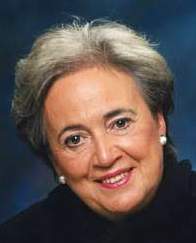
Thibault |
Thibault, Lise, née Trudel (b. April 2, 1939, Saint-Roch-de-l'Achigan, Quebec), lieutenant governor of Quebec (1997-2007). She made an outstanding contribution to public life in Quebec in many different fields. From 1979 to 1984 she was the moderator of a television program on family life for Radio-Canada and Télé-Métropole. She was the first person to serve as Vice-President, Client Relations, at the Quebec Occupational Health and Safety Board, from 1987 to 1993. From 1993 to 1995, she was chair and director-general of the Quebec Office for Persons with Disabilities. Thibault has been involved in many community organizations, including the United Way and the Red Cross. In recognition of her contributions to community life and the advancement of women, she was named a Woman of Merit by the Montreal YWCA in 1994.
Thibaw Min,1 Thibaw also spelled Theebaw (b. Jan. 1, 1859, Ratnapura, Kingdom of Awa [now in Myanmar] - d. Dec. 15, 1916, Ratnagiri Fort [now in Maharashtra], India), king of Awa (1878-85). He was a younger son of King Mindon Min and was chosen for the succession by the Council of State, with the backing of Mindon's most senior wife (who later married her daughter Supayalat to Thibaw); Mindon himself did not designate a new heir apparent after his first choice was assassinated in 1866. At the beginning of his reign Thibaw was more or less a puppet of his ministers. Supayalat and her mother, resenting the constraints placed on royal power, influenced him to reassert his authority. This was effected largely by the execution of 40 of his siblings in 1879. The existence of the country being threatened by the British, who had already annexed Lower Burma during his father's reign, an attempt was made to create French interests to balance the British. His government sent a mission to Paris in 1883 and a treaty was concluded in 1884, providing for a French representative in Mandalay. When the French were about to be granted valuable economic concessions, British Indian officials demanded immediate annexation of Upper Burma. A pretext was furnished by a dispute about some teak wood between the British-owned Bombay-Burmah Trading Corporation and Thibaw who demanded from the company a fine of £100,000. An ultimatum sent by the Indian viceroy, Lord Dufferin, to Mandalay in October 1885 was not complied with by Thibaw, and on November 14 the British invaded, capturing Mandalay on November 28. The next day Thibaw was deposed and sent to exile in India. Upper Burma was annexed to British Burma on Jan. 1, 1886, and the kingdom of Awa ceased to exist.
1 Literally "Prince of Thibaw," a style conferred before accession; used colloquially instead of the very complex official name as king.
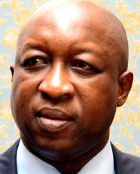
Thieba |
Thieba, Paul Kaba (b. July 28, 1960, Bobo Dioulasso, Upper Volta [now Burkina Faso]), prime minister of Burkina Faso (2016-19).
Thiebaut, Jules Nicolas (b. Feb. 17, 1884 - d. Jan. 23, 1935), acting resident-superior of Laos (1931-32).
Thielen, Jacob Achilles Petrus (b. Aug. 11, 1871, Aruba - d. July 13, 1942, Curaçao), acting administrator of Saba (1907-08) and administrator of Bonaire (1910-20).
Thielmann, Max (Franz Guido) Freiherr von (b. April 4, 1846, Berlin, Prussia [Germany] - d. Sept. 30, 1929, Berlin), finance minister of Germany (1897-1903). He was also ambassador to the United States (1895-97).
Thiémélé, Amoakon Edjampan Boa (b. April 7, 1941, Abengourou, Ivory Coast [now Côte d'Ivoire]), Ivorian diplomat/politician. He was ambassador to West Germany (1974-77) and China, North Korea, and Thailand (1984-90), permanent representative to the United Nations (1977-81), and commerce minister (1981-83).
Thierack, Otto Georg (b. April 19, 1889, Wurzen, Sachsen, Germany - d. [suicide] Oct. 26, 1946, Eselheide camp, Nordrhein-Westfalen, Germany), justice minister of Germany (1942-45). He was also president of the People's Court (1936-42).
Thiercy, Georges (Henri Joseph) (b. April 12, 1915, Antony, Seine [now in Hauts-de-Seine], France - d. Sept. 14, 1984, Créteil, Val-de-Marne, France), high commissioner of the French Territory of the Afars and Issas (1971-74).
Thierry, Joseph (Marie Philippe) (b. March 20, 1857, Haguenau, Bas-Rhin, France - d. Sept. 22, 1918, San Sebastián, Spain), finance minister of France (1917). He was also minister of public works (1913) and ambassador to Spain (1917-18).
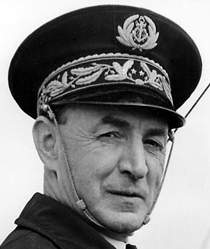
Thierry d'Argenlieu |
Thierry d'Argenlieu, Georges (Louis Marie) (b. Aug. 7, 1889, Brest, Finistère, France - d. Sept. 7, 1964, Le Relecq-Kerhuon, Finistère), high commissioner of French Indochina (1945-47). As head of the French Carmelite monks, he was known as Père Louis de la Trinité.
Thierry Lebbé, Alexis (b. March 22, 1920, Fresco, Ivory Coast [now Côte d'Ivoire]), Ivorian politician. He was minister of animal production (1966-70) and construction and town planning (1970-77) and minister of state at the presidency (1981-83).

Thiers |
Thiers, (Marie Joseph Louis) Adolphe (b. April 18, 1797, Marseille, France - d. Sept. 3, 1877, Saint-Germain-en-Laye, near Paris, France), president of France (1871-73). As the first signatory of a journalists' protest preceding the revolution of 1830 which overthrew King Charles X, he took refuge in a Paris suburb during the revolution, then returned to win support for Louis-Philippe, duc d'Orléans. During King Louis-Philippe's rule, he was a deputy for Aix-en-Provence and served as undersecretary of state for the treasury (1830), minister of the interior (1832, 1834-36), minister of trade and public works (1833-34), and premier and foreign minister (1836, 1840). He was appointed premier again on Feb. 24, 1848, but revolution forced the king to abdicate the same day. He was responsible for the choice of Louis-Napoléon Bonaparte as a candidate for the presidency of the Second Republic (December 1848), but when Bonaparte carried out his coup of 1851, Thiers was exiled until 1853. As a deputy under the Second Empire from 1863, he did much to arouse in his countrymen a nationalistic and militarist frame of mind. During the quarrel with Prussia in 1870, however, he changed his views and opposed an aggressive policy. He stayed out of the national defense government set up after the fall of the Empire (September). Becoming "head of the executive power" in February 1871, he negotiated a peace treaty with Otto von Bismarck and, in concert with the Germans, used severe measures to defeat the Paris Commune (May), destroying for many years the strength of French workers' movements. In August he became the first president of the Third Republic. He thought the republican system would divide France the least, being confronted with three monarchist parties (Legitimists, Orleanists, Bonapartists), but he did not win their support and resigned in 1873.
Thijn, Ed(uard) van (b. Aug. 16, 1934, Amsterdam, Netherlands - d. Dec. 19, 2021), interior minister of the Netherlands (1981-82, 1994). He was also mayor of Amsterdam (1983-94).
Thil, Robert (Gilbert Georges) (b. May 29, 1924, Alençon, Orne, France - d. Jan. 31, 2012, Paris, France), administrator-superior of Wallis and Futuna (1980-83).
Thile, (Karl) Hermann von (b. July 19, 1812, Berlin, Prussia [now in Germany] - d. Dec. 26, 1889, Berlin), foreign minister of Germany (1871-72). He was also Prussian minister resident to Greece (1852-54) and minister to the Papal State (1854-58).
Thilén, Theodor (Sebastian Gustaf) (b. Aug. 26, 1818, Leppävirta, Finland - d. Sept. 7, 1887, Helsinki, Finland), governor of Mikkeli (1863-69) and Uusimaa (1869-73).
Thilesen, Georg August (b. Dec. 20, 1837, Fredrikshald, Smaalenenes amt [now Halden, Viken fylke], Norway - d. Dec. 20, 1917, Kristiania [now Oslo], Norway), interior minister (1888-89, 1898-99) and finance minister (1900) of Norway. He was also mayor of Drammen (1883-84).
Thilges, (Jules Georges) Édouard (b. Feb. 17, 1817, Clervaux, Luxembourg - d. July 9, 1904, Luxembourg, Luxembourg), prime minister and foreign minister of Luxembourg (1885-88). He was also minister of interior and justice (1859-60) and communal affairs (1867-70) and president of the Council of State (1872-74, 1889-95).
Thinley, Lyonchhen Jigmi (Yoeser), before 2008 Lyonpo Jigmi Thinley (b. 1952, Bumthang, Bhutan), prime minister (1998-99, 2003-04, 2008-13), foreign minister (1998-2003), and home affairs minister (2003-07) of Bhutan. He was also permanent representative to the United Nations (1987-89).
Thiounn Mumm (b. Dec. 8, 1925, Phnom Penh, Cambodia), Cambodian politician; brother of Thiounn Thioeun and Thiounn Thioum. He was minister of economy and finance (exile government, 1970-74) and science (Democratic Kampuchea rebel government, 1979-82).
Thiounn Prasith (b. Feb. 3, 1930, Phnom Penh, Cambodia), Cambodian official; brother of Thiounn Thioeun, Thiounn Thioum, and Thiounn Mumm. He was minister of coordination of the struggle (exile government, 1970-74) and permanent representative to the United Nations (1975-92).
Thiounn Thioeun (b. Dec. 17, 1920, Phnom Penh, Cambodia - d. June 16, 2006, Phnom Penh), Cambodian politician. He was minister of health (1973-82; in exile government to 1975 and in Democratic Kampuchea rebel government from 1979).
Thiounn Thioum (b. May 25, 1924, Phnom Penh, Cambodia - d. Oct. 10, 2008, Fontenay-aux-Roses, Hauts-de-Seine, France), finance minister of Cambodia (1979-82; Democratic Kampuchea rebel government); brother of Thiounn Thioeun.
Thodé, Glenn (Albert Edward) (b. Nov. 1, 1965, Kralendijk, Bonaire, Netherlands Antilles), administrator of Bonaire (2008-11).
Tholance, Auguste (Eugène Ludovic) (b. July 16, 1878 - d. June 15, 1938, Nice, Alpes-Maritimes, France), acting governor of Cochinchina (1929) and resident-superior of Tonkin (1930-37). He was appointed (Oct. 30, 1930) but not installed as governor of Saint-Pierre and Miquelon.

Thom |
Thom, Margaret M. (b. Fort Providence, N.W.T.), commissioner of the Northwest Territories (2017- ).
Thoma, Ruby (Helen Eidagarube), former surname (until 2000) Dediya (b. 1949, Nauru), finance minister of Nauru (1996). Nauru's first woman member of parliament (1986-92, 1995-97), she was also minister of health (1986) and minister assisting the president (1996).
Thomann, Georges (b. May 20, 1872, Le Mans, Sarthe, France - d. January 1943), acting lieutenant governor of Gabon (1917-18) and Middle Congo (1922-23).
Thomas, Albert (b. June 16, 1878, Champigny-sur-Marne, Seine [now in Val-de-Marne], France - d. May 7, 1932, Paris, France), director-general of the International Labour Organization (1919-32). He was also French minister of armaments (1916-17).
Thomas, David M. (d. March 18, 2009, Alexandria, Va.), Liberian diplomat. He was permanent representative to the United Nations (1978-79).

I. Thomas |
Thomas, Iona, governor of Pitcairn Island (2022- ). She is also British high commissioner to New Zealand (2022- ).

J. Thomas |
Thomas, Julie (Dorne), chief minister of Saint Helena (2021- ).
Thomas, M(adathilparampil) M(ammen) (b. May 15, 1916, in present Kerala, India - d. Dec. 3, 1996), Indian politician. He was influenced both by the Indian independence movement and by the Marxist movement. At one point in his youth, he applied for ordination in the Mar Thoma Church and for membership in the Communist Party. The church rejected him because of his Marxist leanings of his social ethics; the party rejected him because of his Christian faith. His social ethics, though deeply committed to the struggle of the poor for justice and humanity, broke sharply with the total claim of Marxist-Leninist ideology. He was first secretary of the Youth Christian Council of Action in his native Kerala, then Student Christian Movement secretary in Madras, and Youth Secretary of the Mar Thoma Church. In 1947-52 he served on the staff of the World Student Christian Federation in Geneva. He took part in the First Assembly of the World Council of Churches (WCC) in 1948. In 1968-75 he served as chairman of the Central Committee of the WCC, guiding it through some of the stormiest years of its history. The centrepiece of Thomas' work was, however, in India itself. He joined with India's leading theologian, P.D. Devanandan, in 1957 to form the Christian Institute for the Study of Religion and Society, which he served first as associate director and then, upon Devanandan's death, as director until his retirement in 1976. He opposed, at serious risk of arrest and imprisonment, Indira Gandhi's suspension of democracy in 1976. This led indirectly to his appointment as governor of the largely Christian state of Nagaland in northeastern India in 1990, a post in which he was as much a pastor as official until his resignation in 1992, in protest against central government corruption.
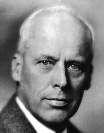
N. Thomas |
Thomas, Norman (Mattoon) (b. Nov. 20, 1884, Marion, Ohio - d. Dec. 19, 1968, Huntington, N.Y.), U.S. politician. During his work as a Presbyterian minister in Harlem, he became increasingly convinced that the major political parties were offering no adequate solution to the problems of poverty and social injustice that he found on every hand, nor to the problem of war. Opposing U.S. participation in World War I, he became secretary of the Fellowship of Reconciliation, an international Christian pacifist organization, in 1917. That year he was also one of the founders of what became the American Civil Liberties Union. In 1918 he joined the Socialist Party. In 1922 he became co-director of the League for Industrial Democracy, a position he held until 1937. A powerful speaker, he ran for governor of New York in 1924, for mayor of New York City in 1925 and 1929, and for president of the United States in six successive elections between 1928 and 1948, winning his highest popular vote, 884,781, in 1932. He became the recognized leader of the Socialist Party after the death of Eugene Debs in 1926. He was generally critical of the New Deal of Pres. Franklin D. Roosevelt, regarding it as a device to bail out capitalism; many Socialists, especially trade unionists, disagreed and broke away to support the New Deal. He was, however, stoutly anti-Communist. His non-interventionist stance ahead of World War II - he co-founded the Keep America Out of War Committee in 1938 - also led to defections, though after Pearl Harbor he gave American participation his critical support. After the war, he reorganized the committee as the Post-War World Council; as its chairman the problems of international peace remained his major concern and he was an early critic of U.S. involvement in Vietnam.
Thomas, Philip F(rancis) (b. Sept. 12, 1810, Easton, Md. - d. Oct. 2, 1890, Baltimore, Md.), governor of Maryland (1848-51) and U.S. secretary of the treasury (1860-61); grandson-in-law of Robert Wright.

Sally Thomas |
Thomas, Sally (Gordon) (b. Aug. 7, 1939, Cambridge, England), administrator of the Northern Territory (2011-14).
Thomas, Sir (Thomas) Shenton (Whitelegge) (b. Oct. 10, 1879, London, England - d. Jan. 15, 1962, London), governor of Nyasaland (1929-32), Gold Coast (1932-34), and the Straits Settlements (1934-46); knighted 1931. He was interned as prisoner of war following the British surrender of Singapore to the Japanese (1942-45).

T. Thomas |
Thomas, Tillman (Joseph) (b. June 13, 1945, Hermitage, St. Patrick, Grenada), prime minister (2008-13) and foreign minister (2012-13) of Grenada. During the government of Maurice Bishop (1979-83) he was jailed for political reasons for two years. He first contested general elections in 1984. He served as junior minister in the Ministry of Legal Affairs until 1987 and then was a founding member of the National Democratic Congress (NDC), serving as its assistant general secretary in 1987-90. He lost his St. Patrick East seat in the 1990 general election but was still appointed parliamentary secretary for legal affairs before becoming full-fledged minister of works (1991-92) and tourism (1993-95). In 2000 he became NDC leader after the party failed to win a single seat in the 15-seat parliament. He led it to victory in the elections of 2008 but in 2013 himself suffered a rout. In 2014 he was succeeded as NDC leader by Nazim Burke.
Thomas-Greenfield, Linda (b. 1952, Baker, La.), U.S. ambassador to the United Nations (2021- ). She was also ambassador to Liberia (2008-12).
Thomle, Iver Steen (b. March 1, 1812, Froland, Nedenes amt [now in Agder fylke], Norway - d. Sept. 16, 1889, Kristiania [now Oslo], Norway), governor of Nedenes amt (1849-60). He was also Norwegian acting minister of justice and police (1857) and chief justice of the Supreme Court (1878-86).
Thompson, Aloysius Paterson (b. Oct. 22, 1931, Georgetown, British Guiana [now Guyana] - d. April 7, 2020, Barbados), Guyanese diplomat. He was permanent representative to the United Nations (1969-71).

D. Thompson |
Thompson, David (John Howard) (b. Dec. 25, 1961, London, England - d. Oct. 23, 2010, Mapps, Barbados), prime minister of Barbados (2008-10). He was elected to parliament in 1987 in a by-election which was held following the death of Prime Minister Errol Barrow. He has represented the rural parish of St. John since then. During the Erskine Sandiford administration, Thompson served as minister of community development and culture (1991) and as minister of finance (1993-94). He led the Democratic Labour Party to general election losses in 1994 and 1999 before resigning in September 2001. He was reinstated as political leader in January 2006 following the defection of Clyde Mascoll after a bitter leadership feud. He led the party to victory in the January 2008 elections. He died in office.
Thompson, David P(reston) (b. Nov. 8, 1834, Cadiz, Harrison county, Ohio - d. Dec. 14, 1901, Portland, Ore.), governor of Idaho (1875-76) and mayor of Portland (1879-82). He was also U.S. minister to Turkey (1893).
Thompson, Dudley (Joseph) (b. Jan. 19, 1917, Panama - d. Jan. 20, 2012, New York City), foreign minister of Jamaica (1975-77). He was also minister of mining and natural resources (1977-78) and national security (1978-80) and high commissioner to Nigeria (1990-95).
Thompson, (Henrietta) Elizabeth (b. Nov. 22, 1961), Barbadian politician. She was minister of health (1994-99), environment (1995-99, 2001-08), physical development (2001-03), housing and lands (2003-06), and energy (2006-08) and permanent representative to the United Nations (2018-21).
Thompson, Fred (Dalton) (b. Aug. 19 1942, Sheffield, Ala. - d. Nov. 1, 2015, Nashville, Tenn.), U.S. politician. Also known as an actor, he was a senator from Tennessee (1994-2003) and a candidate for the 2008 Republican presidential nomination.
Thompson, James R(obert, Jr.) (b. May 8, 1936, Chicago, Ill. - d. Aug. 14, 2020, Chicago), governor of Illinois (1977-91).
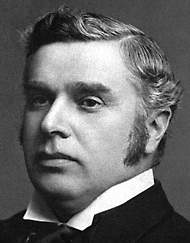
J. Thompson |
Thompson, Sir John (Sparrow David) (b. Nov. 10, 1844, Halifax, Nova Scotia [now in Canada] - d. Dec. 12, 1894, Windsor Castle, Berkshire, England), prime minister of Canada (1892-94). In 1877 he was elected to the Nova Scotia legislature as Liberal-Conservative member for Antigonish. He became the province's attorney general in 1878 and premier in 1882 but his government was defeated after two months. For the next three years he served as a judge of the provincial Supreme Court. In 1885 he was elected to the dominion parliament from Antigonish and became minister of justice in Sir John Macdonald's cabinet. He defended the government with great skill in various controversial questions, including the execution of Louis Riel (1885), the Jesuits' Estates Act (1888-89), and the status of the French language in western Canada. He served as legal adviser to the British delegation in the negotiations with the United States leading to the Bayard-Chamberlain Treaty of 1888 regulating the North Atlantic fisheries; he was knighted the same year. After Macdonald's death in 1891, his Catholic religion seemed to bar his succession. But when Sir John Abbott resigned in 1892, Thompson was named to lead the party. During his premiership he was one of the arbitrators in the Bering Sea seal fishery dispute (1893). His career was cut short by his sudden death on a visit to England, a few minutes after having been sworn in by Queen Victoria as a member of the Privy Council.
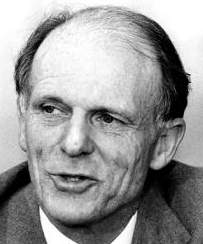
L. Thompson |
Thompson, Lindsay (Hamilton Simpson) (b. Oct. 15, 1923, Warburton, Victoria - d. July 16, 2008, Malvern, Victoria), premier of Victoria (1981-82). He served as a Liberal MP in the state parliament from 1955 to 1982 and held the housing (1961-67), education (1967-79), police (1979-81), and treasury (1979-82) portfolios. In 1972, while education minister, he showed bravery when a group of schoolchildren and a teacher were taken hostage at Faraday near Castlemaine and he offered to hand over a $1 million ransom. He replaced Rupert Hamer as premier in 1981, but served only for 10 months until leading the Liberal Party, which by that time had been in power for 27 years, to defeat at the hands of John Cain's Labor Party at the April 1982 election. He retired from parliament in November 1982.
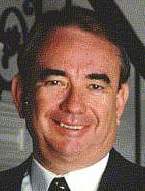
T. Thompson |
Thompson, Tommy G(eorge) (b. Nov. 19, 1941, Elroy, Wis.), governor of Wisconsin (1987-2001). In 1966 the Republican was elected to the Wisconsin legislature, where he was assistant minority leader in 1973-81 and floor leader in 1981-86 before being elected governor. He lost the primary for a vacant congressional seat to Tom Petri in 1979. As governor, he used Wisconsin's extraordinary "partial veto" 1,900 times. He could strike not only lines from the budget, but words and numbers, enabling him, for example, to cut a program by 90% by dropping one zero. He cut income and capital gains taxes and repealed the inheritance tax; he funded a property tax cut with spending cuts; he improved the business climate. He instituted and spotlighted school choice and sponsored the nation's first "work not welfare" experiment, drastically cutting Wisconsin welfare rolls. He pushed for tough crime bills and an Information Technology Fund to make government services more efficient and cost effective through expanded technology. He was not taken as seriously a force at the 1992 Republican National Convention as he had hoped to spotlight his achievements in Wisconsin. Early in the 1996 and 2000 campaigns he seemed interested in running for president, but ultimately did not launch a campaign. In 2001-05 he was secretary of health and human services in the first George W. Bush administration. He made a bid for the 2008 Republican presidential nomination but dropped out of the race in August 2007. In 2012 he lost a bid for the U.S. Senate to Democrat Tammy Baldwin.
Thompson, Willoughby Harry (b. Dec. 3, 1919 - d. Jan. 26, 2018), commissioner of Anguilla (1969-71) and administrator (1971) and governor (1971-74) of Montserrat.
Thompson, Winston (b. July 8, 1940, Yasawa Islands, Fiji), Fijian diplomat. He was permanent representative to the United Nations (1985-91) and ambassador to the United States (2009-15).
Thomsen, Christian Albert Frederik (b. May 31, 1827, Copenhagen, Denmark - d. June 28, 1896, Copenhagen), war minister of Denmark (1872-74, 1894-96). He was also navy minister (1872-73).
Thomson, Arthur (Natanael) (b. Nov. 6, 1891, Mönsterås, Kalmar, Sweden - d. July 7, 1977), governor of Malmöhus (1939-51).
Thomson, Charles (Antoine Francis) (b. Sept. 25, 1845, Mustapha, Algeria - d. July 8, 1898, Marseille, France), governor of Cochinchina (1882-85). He was also prefect of the French départements of Drôme (1877-79), Doubs (1879-80), and Loire (1880-82) and minister to Denmark (1886-91).
Thomson, David Spence (b. Nov. 14, 1915, Stratford, New Zealand - d. Oct. 25, 1999), defence minister of New Zealand (1966-72, 1980-84). He was also minister of tourism (1967-69), police (1969-72), labour and immigration (1972), and justice (1975-78).
Thomson, Sir Ian, original name John Sutherland Thomson (b. Jan. 8, 1920, Glasgow, Scotland - d. March 13, 2008, Edinburgh, Scotland), administrator of the British Virgin Islands (1967-71); knighted 1984. He was a colonial official in Fiji from 1941 to 1967 and returned there in 1971 as chairman of the Sugar Industry Board, a post he held until 1985, besides various other functions.
Thomson, Sir John (Adam) (b. April 27, 1927, Bieldside, Aberdeenshire, Scotland - d. June 3, 2018, Galloway region, Scotland), British diplomat; knighted 1977. He was high commissioner to India (1977-82) and permanent representative to the United Nations (1982-87). He was the son of Sir George Paget Thomson and grandson of Sir Joseph John Thomson, both winners of the Nobel Prize in Physics.

M. Thomson |
Thomson, Meldrim, Jr. (b. March 8, 1912, Wilkinsburg, Pa. - d. April 19, 2001, Orford, N.H.), governor of New Hampshire (1973-79). He got his first taste of electoral politics as a school board member while living in New York state. He came to New Hampshire in 1955. By 1966, he had become so vehemently opposed to big government that he helped persuade his local school board to reject federal aid for a remedial reading program. His efforts started to bring him statewide attention. He made two unsuccessful tries for the GOP nomination for governor in 1968 and 1970, then ran unsuccessfully in the 1970 general election as the candidate of George Wallace's American Party. He managed to win the GOP nomination in 1972, then won the governorship in a three-way race when moderate Republicans ran one of their own as an independent. As governor, serving three two-year terms, he drew devoted support from ultraconservatives with positions that included suggesting nuclear weapons for the state National Guard. He once called Martin Luther King "a man of immoral character whose frequent association with leading agents of Communism is well established." But he also drew votes for his strong antitax stance - to this day, the state has neither an income tax or a sales tax - and for his philosophy of independence from federal influence. "I have fought the holy cause of liberty against the sinister encroachments of the federal government," he wrote in his 1979 book, Live Free or Die. The title of the book is the motto introduced on state license plates during Thomson's time in office. He waged an unsuccessful battle all the way to the U.S. Supreme Court to stop a motorist from covering the words up. Democrat Hugh Gallen ousted Thomson when he sought a fourth two-year term in 1978.
Thomson, Peter (b. 1948, Suva, Fiji), president of the United Nations General Assembly (2016-17). He was Fiji's permanent representative to the UN (2010-16) and was appointed UN special envoy for the ocean in 2017.
Thomson, Rob(ert John) (b. Jan. 1, 1967), administrator of the British Sovereign Base Areas in Cyprus (2019-22).
Thomson of Monifieth, George (Morgan) Thomson, Baron (b. Jan. 16, 1921, Stirling, Scotland - d. Oct. 3, 2008, London, England), British politician. He was chancellor of the Duchy of Lancaster (1966-67, 1969-70), secretary of state for Commonwealth affairs (1967-68), a minister without portfolio (1968-69), and European commissioner for regional policy (1973-77). He was made a life peer in 1977.
Thondup, Gyalo (b. 1928), chairman of the cabinet of Tibet in exile (1991-93); brother of the 14th Dalai Lama.

Thongloun | 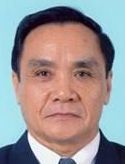
Thongsing |
Thongloun Sisoulith (b. Nov. 10, 1945, Houaphan province, Laos), foreign minister (2006-16), prime minister (2016-21), and president (2021- ) of Laos and general secretary of the Lao People's Revolutionary Party (2021- ). He was also minister of labour and social welfare (1993-98).
Thongsing Thammavong (b. April 12, 1944, Houaphan province, Laos), prime minister of Laos (2010-16). He was president of the National Assembly in 2006-10.
Thór, Vilhjálmur (b. Sept. 1, 1899, Æsustadir, Iceland - d. July 12, 1972, Reykjavík, Iceland), foreign minister of Iceland (1942-44). He was also joint governor of the Central Bank (1961-64).
Thoraval, Joël (b. Sept. 7, 1935, Boulogne-Billancourt, Seine [now in Hauts-de-Seine], France), prefect of Paris département (1994-98). He was also prefect of Haute-Loire (1979-81), Tarn (1981-82), Hauts-de-Seine (1985-86), Corse-du-Sud (1987-89), and Calvados (1989-91).
Thorbecke, (Johan) Rudolf (b. Jan. 14, 1798, Zwolle, Batavian Republic [now in Netherlands] - d. June 4, 1872, The Hague, Netherlands), interior minister of the Netherlands (1849-53, 1862-66, 1871-72). He was also "temporary" chairman of the Council of Ministers (1862-66, 1871-72).
Thórdarson, Björn (b. Feb. 6, 1879, Móar, Iceland - d. Oct. 25, 1963, Reykjavík, Iceland), prime minister of Iceland (1942-44). He was also minister of health and ecclesiastical affairs (1942-44), social affairs (1943-44), and justice and education (1944).
Thórdarson, Fridjón (b. Feb. 5, 1923, Breidabólstadur á Fellsströnd, Iceland - d. Dec. 14, 2009, Reykjavík, Iceland), justice and church minister of Iceland (1980-83).

G.T. Thórdarson |
Thórdarson, Gudlaugur Thór (b. Dec. 19, 1967, Reykjavík, Iceland), foreign minister of Iceland (2017-21). He has also been minister of health (2007-09), social security (2007-08), and environment and climate affairs (2021- ).
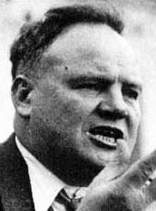
Thorez |
Thorez, Maurice (b. April 28, 1900, Noyelles-Godault, Pas-de-Calais, France - d. July 11, 1964, on ship near Istanbul, Turkey), French politician. He joined the Socialist Party in 1919 and followed its majority in founding the Communist Party in 1920, becoming party secretary for Pas-de-Calais in 1923 and a member of the Central Committee in 1924 and of the Politburo in 1925. He was imprisoned several times for agitation. In 1930 he became general secretary of the party, a position he held until shortly before his death. He was elected to the Chamber of Deputies in 1932 and reelected in 1936. In 1934 he advocated a Popular Front against the right - an alliance of Communists, Socialists, and Radical Socialists. The front won the elections of 1936 and enacted long-neglected social legislation. At the outbreak of World War II he was mobilized, but when the government banned the Communist Party he deserted. He was tried in absentia, sentenced to six years' imprisonment, and deprived of his citizenship. He went to the U.S.S.R. in 1943. When the Allies liberated France in 1944, he was pardoned by Gen. Charles de Gaulle's government. That November he returned to France, and in 1945 his nationality was restored and he was again elected to the Chamber of Deputies. He was a minister of state under de Gaulle in 1945-46 and a deputy premier in 1946 and in 1947 before the Communists left the government. He came close to winning the premiership himself in 1946. He was notably tardy in joining the de-Stalinization campaign begun by Nikita Khrushchev in 1956, but his general loyalty to Moscow prevailed and he backed Khrushchev in his dispute with the Chinese Communists. In May 1964 he was named party president. He died on board a Soviet liner en route from Marseille to Yalta.
Thórhallsson, Tryggvi (b. Feb. 9, 1889, Reykjavík, Iceland - d. July 31, 1935, Reykjavík), prime minister of Iceland (1927-32). He was also chairman of the Progressive Party (1927-32) and the Peasants' Party (1933-35), finance minister (1928-29, 1931), justice, church, and education minister (1931), and president of the Althing (1933).
Thorigny, (René François Élisabeth) Tiburce de (b. July 19, 1798, Bessenay, Rhône, France - d. Jan. 22, 1869, Montrésor, Indre-et-Loire, France), interior minister of France (1851).
Thorláksson, Jón (b. March 3, 1877, Vesturhópshólar, Iceland - d. March 20, 1935, Reykjavík, Iceland), prime minister of Iceland (1926-27). He was also finance minister (1924-27), chairman of the Conservative Party (1924-29) and the Independence Party (1929-34), and mayor of Reykjavík (1933-35).
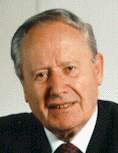
G. Thorn |
Thorn, Gaston (Egmont) (b. Sept. 3, 1928, Luxembourg, Luxembourg - d. Aug. 26, 2007, Luxembourg, Luxembourg), prime minister of Luxembourg (1974-79) and president of the European Commission (1981-85). During the 1950s he took an active part in local politics, becoming a Luxembourg city councillor and then mayor of Luxembourg (1961-63). Meanwhile, he had joined the liberal Democratic Party and in 1959 became a member of parliament and, soon afterward, of the European Parliament. In 1961 he was named the Democratic Party's chairman. Following the 1968 general election he became foreign minister and minister for trade in the Christian Socialist-Democratic coalition formed in 1969. His personal popularity contributed to his party's success in the 1974 election, which ended 50 years of Christian Socialist domination in Luxembourg politics. He then served as prime minister in a coalition with the Workers' Socialist Party. He also took responsibility for the portfolios of foreign affairs and foreign trade, economy, and the middle classes, retaining these responsibilities after the 1979 election in a new Christian Socialist-Liberal coalition headed by Pierre Werner. In 1975 Thorn was elected president of the 30th UN General Assembly, and the following year he was chosen to head the newly formed Federation of Liberal and Democratic Parties within the European Community. He was a firm believer in the need for European unity. In June 1980 he was designated as next president of the Commission of the European Community. His appointment was preceded by some disagreement, and it was known that he was not the favoured candidate of France's Pres. Valéry Giscard d'Estaing. He resigned as Luxembourg's foreign minister in November 1980, and took office in January 1981.
Thorn, Victor (b. Jan. 31, 1844, Esch-sur-Alzette, Luxembourg - d. Sept. 15, 1930, Luxembourg, Luxembourg), prime minister and foreign minister of Luxembourg (1916-17). He was also minister of public works (1888-92, 1915) and justice (1915, 1916-17) and president of the Council of State (1914-15, 1915-16, 1917-30).
Thörn, Ylva (Britt Inger) (b. Aug. 2, 1954, Åtvidaberg, Östergötland, Sweden), governor of Dalarna (2015-21).
Thornburgh, Richard (Lewis) (b. July 16, 1932, Pittsburgh, Pa. - d. Dec. 31, 2020, Oakmont, Pa.), governor of Pennsylvania (1979-87) and U.S. attorney general (1988-91).
Thorndike (Galup), Augusto (b. Nov. 12, 1903, Lima, Peru - d. Sept. 23, 1966, Lima), justice minister (1956-58) and finance minister (1958) of Peru; grandson of Manuel Galup.
Thorne (Vetter), Alfredo (Eduardo) (b. Oct. 29, 1955, Lima, Peru), economy and finance minister of Peru (2016-17).
Thorne (León), Jaime (Fernando) (b. 1943? - d. early April 2018), defense minister of Peru (2010-11).
Thorneycroft, (George Edward) Peter Thorneycroft, Baron (b. July 26, 1909, Dunston Hall, Staffordshire, England - d. June 4, 1994, London, England), British chancellor of the exchequer (1957-58), defence minister (1962-64), and defence secretary (1964). He was also president of the Board of Trade (1951-57) and minister of aviation (1960-62). He was created a life peer in 1967.
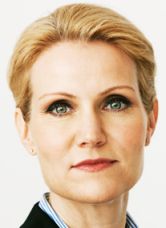
Thorning-S. | 
Thörnroos |
Thorning-Schmidt, Helle (b. Dec. 14, 1966, Rødovre, Denmark), prime minister of Denmark (2011-15); daughter-in-law of Neil Kinnock, Baron Kinnock. Leader of the Social Democrats from 2005 to 2015, she became the country's first woman prime minister after the 2011 elections, heading a coalition with the Socialist People's Party and the Radikale Venstre (Social Liberals).
Thörnroos, Veronica (Margaretha), née Lindman (b. July 16, 1962, Främmanby, Åland Islands, Finland), lantråd of the Åland Islands (2019- ).

Thoroddsen |
Thoroddsen, Gunnar (b. Dec. 29, 1910, Reykjavík, Iceland - d. Sept. 25, 1983, Reykjavík), prime minister of Iceland (1980-83); son-in-law of Ásgeir Ásgeirsson. He took up politics at the age of 24. He was mayor of Reykjavík (1947-60), minister of finance (1959-65), ambassador to Denmark (1965-69), a presidential candidate (1968), a judge of the Supreme Court (1970), and minister of energy and social affairs (1974-78). As premier he was the leader of a splinter group of the Independence Party in a coalition government that included the People's Alliance (Communist) and Progressive (Farmers') parties. He was also vice-president of the Independence Party until 1981.
Thorp, Sir John Kingsmill (Robert) (b. June 13, 1912 - d. Aug. 13, 1961), administrator of Saint Lucia (1953-58) and governor of Seychelles (1958-61); knighted 1959.
Thorp, William Gray (b. Oct. 3, 1922, Nelson, N.Z. - d. June 27, 1998), administrator of Tokelau (1973-75). He was also New Zealand minister (non-resident) to the Philippines (1968-71), high commissioner to Western Samoa and Tonga (1971-75), and ambassador to the Netherlands and Sweden (1977-82).
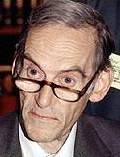
J. Thorpe |
Thorpe, (John) Jeremy (b. April 29, 1929, London, England - d. Dec. 4, 2014), British politician. He became an MP for North Devon at the age of 30 and was elected leader of the Liberal Party in 1967. Under his leadership the party reached a peak of postwar success in the general election of February 1974, when Liberal candidates received six million votes (19% of the poll) and 14 Liberal MPs were elected. His distinctly theatrical style and his wit did not endear him to all his fellow Liberals. His reputation suffered a blow when a report on the collapse of a bank, London and County Securities, raised questions concerning his judgment as a non-executive director of the company. Then in January 1976, a former male model named Norman Scott stated in a court hearing that he had had a homosexual affair with Thorpe in the early 1960s. This Thorpe persistently denied. The Scott affair attracted a great deal of publicity in the British press and, later, in the U.S., where television accounts of the affair were shown. Thorpe resigned the leadership of the Liberal Party in May 1976, though a committee of senior Liberals had said they found nothing to support the allegations against him. In 1978, Thorpe, with three others, was charged with conspiracy to murder Scott; Thorpe was charged separately with incitement to murder. The charges were the culmination of police investigations lasting two years and ten months. They arose from a case brought against Andrew Newton, a former airline pilot, after he had shot and killed a Great Dane owned by Scott. Newton claimed that an unidentified Liberal had paid him £5,000 to silence Scott by murdering him. The subsequent investigation attempted to trace the trail of alleged conspiracy back to Thorpe himself. He was acquitted in June 1979, shortly after losing his parliamentary seat in the May general election, and never returned to politics.
Thorpe, Marjorie (Ruth) (b. July 8, 1941, Trinidad and Tobago), Trinidad and Tobago diplomat. She was permanent representative to the United Nations (1988-92).
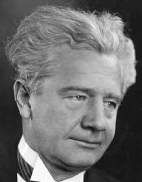
Ó. Thors |
Thors, Ólafur (Tryggvason) (b. Jan. 19, 1892, Borgarnes, Iceland - d. Dec. 31, 1964, Reykjavík, Iceland), prime minister (1942, 1944-47, 1949-50, 1953-56, 1959-63) and foreign minister (1942, 1944-47) of Iceland. He was also minister of justice (1932), industry (1939-42, 1950-53), social affairs (1949-50), and fisheries (1950-56).
Thors, Thor (b. Nov. 26, 1903, Reykjavík, Iceland - d. Jan. 11, 1965, Washington, D.C.), Icelandic diplomat; brother of Ólafur Thors. He was minister (1941-55) and ambassador (1955-65) to the United States, minister/ambassador to Canada (1947-65), Argentina and Brazil (1952-65), Cuba (1956-65), and Mexico (1964-65), and permanent representative to the United Nations (1947-65).
Thorsing, Oscar (Uno Konrad) (b. Dec. 1, 1896 - d. Dec. 6, 1967), Swedish diplomat. He was chargé d'affaires (1946-51) and minister (1951-52) to Ireland and permanent representative to the United Nations (1952-56).
Thorsson, Fredrik Vilhelm (b. May 30, 1865, Stora Köpinge socken, Malmöhus [now in Skåne], Sweden - d. May 5, 1925), finance minister of Sweden (1918-20, 1921-23, 1924-25). He was also minister of trade (1920).
Thott, Tage greve (b. Oct. 23, 1739 - d. March 7, 1824, Malmö, Sweden), governor of Malmöhus (1776-94). He was made friherre (baron) in 1778 and greve (count) in 1807.
Thoutch Vutthi, Cambodian diplomat. He was ambassador to South Vietnam (1970-71) and Indonesia (1971-73) and permanent representative to the United Nations (1973-75).
Thouvenel, Édouard (Antoine) (b. Nov. 11, 1818, Verdun, France - d. Oct. 18, 1866, Paris, France), foreign minister of France (1860-62). He was also minister to Greece (1849-50) and Bavaria (1850-51) and ambassador to the Ottoman Empire (1855-60).
Thuau, Rémi (b. June 16, 1951, Paris, France), prefect of Saint-Pierre and Miquelon (1997-99). He was also prefect of the French départements of Mayenne (2002-04), Lot-et-Garonne (2005-07), Savoie (2007-10), and Côtes-d'Armor (2010-12).
Thugut, (Johann Amadeus) Franz (de Paula) Freiherr von (b. March 8 or 30, 1736, Linz, Austria - d. May 28, 1818, Vienna, Austria), foreign minister of Austria (1793-1800). He was also minister to the Ottoman Empire (1771-76), Poland (1780-83), France (1783-87), and the Two Sicilies (1787-89).
Thugutt, Stanislaw (August) (b. July 30, 1873, Leczyca, Poland - d. June 15, 1941, Stockholm, Sweden), interior minister (1918-19) and deputy prime minister (1924-25) of Poland.
Thun und Hohenstein, Franz (Anton) Fürst von (b. Sept. 2, 1847, Tetschen, Austria [now Decín, Czech Republic] - d. Nov. 1, 1916, Tetschen), Statthalter of Bohemia (1889-96, 1911-15) and prime minister and interior minister of Austria (1898-99); son of Friedrich Graf von Thun und Hohenstein. He was raised from Graf (count) to Fürst (prince) in 1911.
Thun und Hohenstein, Friedrich (Franz Joseph Wenzel Michael Vinzenz) Graf von (b. May 7, 1810, Tetschen, Austria [now Decín, Czech Republic] - d. Sept. 24, 1881, Tetschen), Austrian diplomat. He was chargé d'affaires in Sardinia (1843-44) and minister to Sweden (1847-49), Bavaria (1849-50), the German Confederation (1850-52), Prussia (1852-55), and Russia (1857-63).
Thunborg, Anders (Ingemar) (b. June 9, 1934, Stockholm, Sweden - d. Dec. 10, 2004), defense minister of Sweden (1983-85). He was also permanent representative to the United Nations (1977-82) and ambassador to the Soviet Union (1986-89), the United States (1989-93), Greece (1993), and the Vatican and San Marino (1996-99).
Thunborg, (Tord) Folke (b. March 16, 1909, Söderhamn, Gävleborg, Sweden - d. May 10, 1957), governor of Norrbotten (1953-57).
Thune, Harald (Torfinn) (b. 1952), acting governor of Rogaland (1991-93, 2008-13).
Thungon, Prem Khandu (b. June 5, 1946, Shergaon, Assam [now in West Kameng district, Arunachal Pradesh], India), chief minister of Arunachal Pradesh (1975-79).
Thurlow (of Thurlow in the County of Suffolk), Edward Thurlow, (1st) Baron (b. Dec. 9, 1731, Bracon Ash, Norfolk, England - d. Sept. 12, 1806, Brighton, Sussex, England), British lord chancellor (1778-83, 1783-92). He was also solicitor general (1770-71) and attorney general (1771-78). He was created baron in 1778.
Thurlow (of Thurlow in the County of Suffolk), Francis Edward Hovell-Thurlow-Cumming-Bruce, (8th) Baron (b. March 9, 1912, London, England - d. March 24, 2013), governor of the Bahamas (1968-72); grandson of Thomas John Hovell-Thurlow-Cumming-Bruce, Baron Thurlow. He was also British high commissioner to New Zealand (1959-63) and Nigeria (1963-67). He was knighted in 1961 and succeeded to the barony in 1971.
Thurlow (of Thurlow in the County of Suffolk), Thomas John Hovell-Thurlow-Cumming-Bruce, (5th) Baron (b. Dec. 5, 1838 - d. March 12, 1916), British politician; son-in-law of James Bruce, Earl of Elgin; great-grandnephew of Edward Thurlow, Baron Thurlow. He was paymaster-general (1886). He succeeded to the barony in 1874.
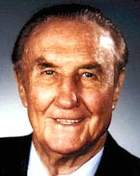
Thurmond |
Thurmond, (James) Strom (b. Dec. 5, 1902, Edgefield, S.C. - d. June 26, 2003, Edgefield), U.S. politician. Winning his first election, to local office, in 1928, he served as a South Carolina state senator (1933-38) and a circuit court judge (1938-41) and as governor of South Carolina (1947-51). At the 1948 Democratic National Convention, he led the bolt of Southern delegates opposing Pres. Harry Truman's civil rights program who formed the States' Rights Democratic Party, popularly known as the Dixiecrats. As their presidential candidate, he won 39 electoral votes (Alabama, Louisiana, Mississippi, and South Carolina). He was elected to the Senate in 1954, the only person ever to win a seat as a write-in candidate. He quickly established himself as a vigorous champion of increased military spending and an archfoe of civil rights legislation. He was reelected in 1960, but on Sept. 16, 1964, he again left the Democratic Party in support of the conservative Republican presidential nominee, Barry Goldwater. Reelected as a Republican in 1966, 1972, 1978, 1984, 1990, and 1996, he was chairman of the Senate Judiciary Committee (1981-87) and of the Armed Services Committee (1995-2001) and president pro tem of the Senate (1981-87, 1995-2001). In March 1996, he became the oldest man ever to serve as senator, breaking the previous age record of 93 years and 3 months set by Theodore Green of Rhode Island, who retired in 1961. In May 1997 he set a record for longest Senate term, surpassing the record set by Arizona Democrat Carl Hayden, who held office 41 years and 10 months. Thurmond also held the record for controlling the Senate floor longer than anyone else: in 1957 he spoke nonstop against a civil rights bill for 24 hours and 18 minutes. He retired in January 2003 at age 100.
Thygeson, (Nicolai) Emanuel de (b. April 19, 1772, Mattrup, near Horsens, Denmark - d. May 16, 1860, Kilchberg, Zürich canton, Switzerland), governor of Hedemarkens amt (1802-04), Nedenes amt (1804-10), Christiansand stift (1804-10), and Christiania stift (1812-13).
Thyrén, Johan (Carl Wilhelm) (b. April 6, 1861, Lund, Malmöhus [now in Skåne], Sweden - d. May 4, 1933), justice minister of Sweden (1926-28). He was also rector of Lund University (1916-26).
Thyselius, Carl Johan (b. June 8, 1811, Österhaninge, Södermanland, Sweden - d. Jan. 11, 1891, Stockholm, Sweden), governor of Kronoberg (1863-64) and prime minister of Sweden (1883-84). He was also minister of education (1860-63) and civil affairs (1875-80).
Thyssen, Marianne (Leonie Petrus) (b. July 24, 1956, Sint-Gillis-Waas, Belgium), Belgian politician. She was chairperson of Christian Democratic and Flemish (2008-10) and EU commissioner for employment, social affairs, skills, and labour mobility (2014-19).
Thystère Tchicaya, Jean-Marc (b. April 11, 1964, Villeneuve-Saint-Georges, Val-de-Marne, France), Congo (Brazzaville) politician; son of Jean-Pierre Thystère Tchicaya. He has been minister of hydrocarbons (2015-21), transport, civil aviation, and merchant marine (2021-22), and special economic zones (2022- ).
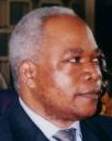
J.-P. Thystère |
Thystère Tchicaya, Jean-Pierre (b. Jan. 7, 1936, Pointe-Noire, Middle Congo [now Congo (Brazzaville)] - d. June 20, 2008, Paris, France), acting head of state of Congo (Brazzaville) (1979). He was also minister of technical, vocational, and higher education (1971-74) and mines, energy, and hydrocarbons (1992-93), mayor of Pointe-Noire (1994-97), and president of the National Assembly (2002-07).
Tian Bao, Tibetan Sangye Yeshi (b. 1917, Kham region, Sichuan, China - d. Feb. 21, 2008, Chengdu, Sichuan), chairman of the government of Xizang (1979-81).
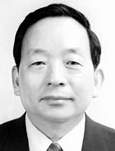
Tian Jiyun |
Tian Jiyun (Pinyin), Wade-Giles T'ien Chi-yün (b. June 1929, Feicheng county, Shandong, China), Chinese politician. He joined the Communist Party in 1945. In the late 1940s he was involved in violent Communist-led land reforms. After the People's Republic was founded in 1949, he held a number of middle-level financial posts in Guizhou province, where he remained until his transfer to Sichuan province in 1969. In the late 1970s he assisted Zhao Ziyang, then governor of Sichuan, in carrying out experimental economic and agricultural reforms in the province. As Zhao's right-hand man, Tian played an important role in bold and flexible programs that deviated from Marxist principles but significantly increased industrial output and agricultural production. These results were achieved through such innovative policies as rewarding workers on the basis of work rather than need and providing incentives based on free enterprise and market forces rather than on rigid quotas established by central authorities. These approaches soon attracted national attention, and both Zhao and Tian were transferred to Beijing, where they were appointed premier and deputy secretary-general of the State Council (cabinet), respectively, in 1980. After being elected to the Communist Party's Central Committee in 1982, Tian became an important member of a team that successfully introduced to the entire nation Zhao's Sichuan reforms, which markedly speeded up China's economic development, especially in the agricultural sector. For these achievements he was promoted to vice-premier and secretary-general of the State Council in 1983. In September 1985 he was elected to both the Secretariat of the Central Committee and the Politburo. He remained a vice premier until 1993.
Tian Wenlie (b. 1853, Hanyang [now part of Wuhan], Hubei, China - d. 1924), civil governor of Shandong (1913-14), military (1914) and civil (1914-17) governor of Henan, and minister of agriculture and commerce (1917-20), interior (1919-20, 1922), and transportation (1920) of China. His political career derived from his service under Yuan Shikai, when the latter was still an official of the Qing government in the last few years of the 19th century.
Tian Zhongyu (b. 1869, Linyu, Hebei, China - d. 1935), governor of Chahar (1916-17, 1918-19), military governor of Jilin (1917-18), and military (1919-23) and civil (1919-20, 1920-22) governor of Shandong.
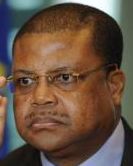
Tiangaye | 
Tiao |
Tiangaye, Nicolas (b. Sept. 13, 1956, Bocaranga, Oubangui-Chari [now Central African Republic]), prime minister of the Central African Republic (2013-14). He was a minor presidential candidate in 2020.
Tiao, (Beyon) Luc Adolphe (b. June 4, 1954, Tenkodogo, Upper Volta [now Burkina Faso]), prime minister of Burkina Faso (2011-14). He was ambassador to France in 2008-11.
Tiaré, Yemdaogo Eric (b. Dec. 31, 1960, Poura, Upper Volta [now Burkina Faso]), Burkinabe diplomat. He was ambassador to France, Spain, Monaco, Portugal, and the Vatican (2013-15) and permanent representative to the United Nations (2015-21).
Tibbaut, Emile (Louis Marie) (b. June 15, 1862, Laarne, Belgium - d. Dec. 19, 1935, Paris, France), chairman of the Chamber of Representatives of Belgium (1928-30).

Tibbetts |
Tibbetts, (Darwin) Kurt (b. March 2, 1954, Jamaica), leader of government business of the Cayman Islands (2000-01, 2005-09). He was leader of the People's Progressive Movement in 2002-11. In 2013-17 he was minister of planning, lands, agriculture, housing, and infrastructure.
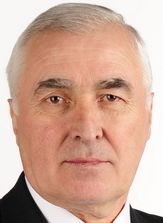
L. Tibilov |
Tibilov, Leonid (Kharitonovich) (b. March 28, 1952, Verkhny Dvan village, South Ossetian autonomous oblast, Georgian S.S.R.), president of South Ossetia (2012-17).
Tibilov, Semyon (Grigoryevich), chairman of the Executive Committee of the South Ossetian autonomous oblast (1957-58?).
Tibiriçá, Jorge (b. Nov. 15, 1855, Paris, France - d. Sept. 30, 1928, São Paulo, Brazil), president of São Paulo (1890-91, 1904-08).
Tibone, (Mbiganyi) Charles (b. Jan. 5, 1947), home affairs minister of Botswana (2007-08). He was also minister of minerals, energy, and water resources (2004-07).
Tibrewal, Navrang Lal (b. Jan. 17, 1937, in present Jhunjhunu district, Rajasthan, India), acting governor of Rajasthan (1998-99). He was acting chief justice of Rajasthan High Court (1998-99).
Tichon, Dan (b. Jan. 5, 1937, Kiryat Haim [now part of Haifa], Palestine [now in Israel]), Israeli politician. He was speaker of the Knesset (1996-99).
Tickell, Sir Crispin (Charles Cervantes) (b. Aug. 25, 1930, London, England - d. Jan. 25, 2022), British diplomat; knighted 1983. He was ambassador to Mexico (1981-83) and permanent representative to the United Nations (1987-90).
Tidemand, Otto Grieg (b. June 18, 1921, Kristiania [now Oslo], Norway - d. June 10, 2006, Oslo), defense minister of Norway (1965-70). He was also minister of trade and shipping (1970-71).
Tief, Otto (b. Aug. 14, 1889, Rapla, Russia [now in Estonia] - d. March 5, 1976, Ahja, Estonian S.S.R. [now in Põlva county, Estonia]), justice minister (1927) and acting prime minister in exile (1944-53) of Estonia. He was also minister of labour and welfare (1926-27).
Tiemann, Daniel F(awcett) (b. Jan. 9, 1805, New York City - d. June 29, 1899, New York City), mayor of New York City (1858-60); nephew-in-law of Peter Cooper.
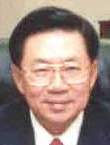
Tien | 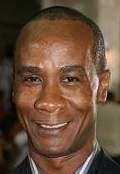
Tien-Liong |
Tien Hung-mao, Pinyin Tian Hongmao (b. Nov. 7, 1938, Tainan, Taiwan), foreign minister of Taiwan (2000-02). He was chairman and president of the Taipei-based Institute for National Policy Research.
Tien-Liong, Alain (b. May 21, 1963, Cayenne, French Guiana), president of the General Council of French Guiana (2008-15).
Tienhoven, Gijsbert van (b. Feb. 12, 1841, De Werken, Noord-Brabant, Netherlands - d. Oct. 10, 1914, Zandvoort, Noord-Holland, Netherlands), prime minister and foreign minister of the Netherlands (1891-94) and queen's commissioner of Noord-Holland (1897-1911). He was also mayor of Amsterdam (1880-91).
Tiensten, Paul (b. 1966), foreign minister of Papua New Guinea (2006-07). He was also minister of trade and industry (2003-06) and national planning and district development (2007-11). In 2014 he was sentenced to 9 years' imprisonment for misappropriating some U.S.$3.8 million during his tenure as minister.
Tientarboum, Félix, also spelled Tientaraboum (b. Nov. 20, 1935, Donsin, Upper Volta [now Burkina Faso] - d. June 9, 2013, Paris, France), foreign minister of Upper Volta (1980-82). He was also minister of youth and sports (1971-77).
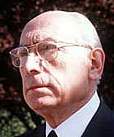
Tierno |
Tierno Galván, Enrique (b. Feb. 8, 1918, Madrid, Spain - d. Jan. 19, 1986, Madrid), Spanish politician. In 1954 he founded a small clandestine socialist group (later the Popular Socialist Party). He served (1963-65) as professor of political science at the University of Salamanca until he was dismissed by the Franco government for joining with students in anti-government demonstrations. In 1962 he founded a university reform movement. Tierno became a mediating figure between the older Socialist leaders exiled in France and those newer leaders who had remained in Spain, but in 1965 he was expelled from the grouping by the leaders in France. Following the death of Franco, he regained his chair at the University of Salamanca in 1976. But his party failed to win much support during the elections, and it merged with its sometime rival, the Spanish Socialist Workers' Party, in 1978. In 1979 he was elected mayor of Madrid. Tierno, who exhibited a studious and erudite manner, was reelected in 1983 and gained immense popularity for his opposition to urban property speculation, promotion of conservation, and support for a cultural revival. More a scholar than a man of action, Tierno was a natural loner whom the people of Madrid ultimately took to their hearts as "the old professor."
Tiété, José Manoel da Silva, barão de (b. 1793, Santo Amaro [now part of São Paulo], Brazil - d. March 27, 1877, São Paulo), acting president of São Paulo (1852, 1868, 1871). He was made baron in 1854.
Tiffin, Edward (b. June 19, 1766, Carlisle, England - d. Aug. 9, 1829, Chillicothe, Ohio), governor of Ohio (1803-07).
Tigrid, Pavel, original name Pavel Schönfeld (b. Oct. 27, 1917, Prague, Austria [now in Czech Republic] - d. Aug. 31, 2003, Héricy, near Paris, France), culture minister of the Czech Republic (1994-96).
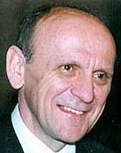
Tihic |
Tihic, Sulejman (b. Nov. 26, 1951, Bosanski Samac, Bosnia and Herzegovina - d. Sept. 25, 2014, Sarajevo, Bosnia and Herzegovina), chairman of the Presidency of Bosnia and Herzegovina (2004, 2006). He was also chairman of the House of Peoples (2007-08, 2009-10, 2012-13).
Tihipko, Serhiy (Leonidovych) (b. Feb. 13, 1960, Dragoneshty, Moldavian S.S.R. [now Draganesti, Moldova]), Ukrainian politician. He was a deputy prime minister (1997, 2010-12), minister of economy (1999-2000) and social policy (2010-12), chairman of the National Bank (2002-04), and a presidential candidate (2010, 2014).
Tiilikainen, Paavo (Herman) (b. July 12, 1923, Ruokolahti, Finland - d. April 15, 2007, Imatra, Finland), interior minister of Finland (1975-76).
Tijerino (Vaca), Perfecto (b. Aug. 6, 1882, Chinandega, Nicaragua - d. Sept. 20, 1966, Choluteca, Honduras), finance minister of Nicaragua (1923-25).
Tikhomirov, Vladislav (Nikolayevich) (b. Aug. 14, 1939, Kukoboy village, Yaroslavl oblast, Russian S.F.S.R. - d. June 19, 2017), chairman of the Executive Committee (1987-90) and head of the administration (1996-2000) of Ivanovo oblast.
Tikhon, secular name Marc R. Mollard (b. July 15, 1966, Boston, Mass.), metropolitan of All America and Canada (2012- ). He was also bishop of South Canaan (2004-05) and bishop (2005-12) and archbishop (2012) of Philadelphia.
Tikhon I, secular name Vasily (Ivanovich) Bellavin (b. Jan. 31 [Jan. 19, O.S.], 1865, Toropets, Pskov province, Russia - d. April 7, 1925, Moscow, Russian S.F.S.R.), metropolitan of Moscow (1917) and patriarch of Moscow and All Russia (1917-25). He was also bishop of Lublin (1897-98), bishop (1898-1905) and archbishop (1905-07) of the Aleutian Islands and Alaska (from 1900 Aleutians and North America), and archbishop of Yaroslavl (1907-14) and Vilna (1914-17).
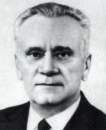
N. Tikhonov |
Tikhonov, Nikolay (Aleksandrovich) (b. May 14 [May 1, O.S.], 1905, Kharkov, Russia [now Kharkiv, Ukraine] - d. June 1, 1997, Moscow, Russia), premier of the Soviet Union (1980-85). He became friends with Leonid Brezhnev, who advised him to join the Communist Party, which he did in 1940. In 1950-57 he worked in the Ministry of Ferrous Metallurgy, rising to deputy minister in 1955. He then took over the Dnepropetrovsk economic region (1957-60) and became deputy chairman of the State Science and Economic Council (1960-62) and deputy chairman of Gosplan, the state economic planning organization (1963-65). He was made a candidate member of the Central Committee of the Communist Party in 1961 and a full member in 1966. In 1965, a year after Brezhnev became party leader, he was named deputy prime minister. In 1976 he was promoted to first deputy prime minister. He took an active role in international affairs and replaced the ailing Aleksey Kosygin on official foreign visits as the premier's condition worsened. He became an alternate member of the Politburo in November 1978 and a full member in November 1979, and was chosen to succeed Kosygin as premier in October 1980. He retired from his post in 1985, citing health reasons, but remained a member of the Central Committee until April 1989, when he was ousted in a purge of "dead souls." In his memoirs, former Soviet leader Mikhail Gorbachev listed Tikhonov among those Politburo members who opposed his liberalizing policies. Gorbachev said Tikhonov supported the leadership of his predecessor, Konstantin Chernenko, and after Chernenko's death in 1985, Tikhonov himself sought the position of general secretary, which instead went to Gorbachev. He was twice named a Hero of Socialist Labour and was awarded nine Orders of Lenin.
Tikhonov, Viktor (Mykolayovych) (b. Jan. 31, 1949, Shchotove, Lugansk oblast, Ukrainian S.S.R. - d. Aug. 29, 2020, Simferopol, Crimea), a deputy prime minister of Ukraine (2010-11). He was also first secretary of the party committee of Lugansk city (1990-91) and ambassador to Belarus (2011-12).
Tikhonov, Vladimir (Ilich) (b. Feb. 4, 1947), head of the administration of Ivanovo oblast (2000-05).
Tikunov, Vadim (Stepanovich) (b. April 9, 1921, Simbirsk [now Ulyanovsk], Russia - d. July 16, 1980, Yaoundé, Cameroon), Soviet politician. He was interior minister of the Russian S.F.S.R. (1961-66) and Soviet ambassador to Upper Volta (1974-78) and Cameroon (1978-80).
Tilak, Raghukul (b. Jan. 7, 1900 - d. [road accident] Dec. 25, 1989, near Gurgaon [now Gurugram], Haryana, India), governor of Rajasthan (1977-81).
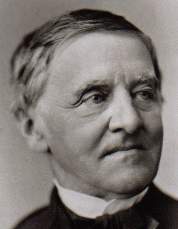
Tilden |
Tilden, Samuel J(ones) (b. Feb. 9, 1814, New Lebanon, N.Y. - d. Aug. 4, 1886, Greystone estate, Yonkers, N.Y.), U.S. politician. A leader of the Barnburner or Free-Soil faction of the Democrats, he served in 1846 in the New York Assembly and was a member of the state constitutional conventions of 1846 and 1867. He supported the Union cause in the Civil War (1861-65) and in the following years played a prominent role in the reorganization of the Democratic Party. As chairman of the New York state Democratic committee (1866-74) he helped destroy the corrupt "Tweed Ring" that controlled New York City politics. Renowned as a reformer, he was elected governor in 1874 and won national recognition for exposing the "Canal Ring" (a conspiracy of politicians and contractors who were defrauding the state) and for his efficient administration of state government. His record secured him the 1876 Democratic presidential nomination. The bitter campaign against Republican Rutherford B. Hayes ended in a disputed election in which two sets of returns were sent to Washington from Florida, Louisiana, Oregon, and South Carolina. Congress, with a Republican Senate and a Democratic House, created an electoral commission (Jan. 29, 1877) to settle the controversy. Tilden, who had received a majority of the popular vote and under fair conditions would probably have had a majority of electors too, reluctantly consented to this. The commission decided all questions by a strictly partisan vote (8 Republicans to 7 Democrats), thus giving the presidency to Hayes. Thereafter, his frail health and characteristic indecisiveness left him in the background of politics. He refused to be considered for renomination in 1880 and 1884.
Tildy, Zoltán (b. Nov. 18, 1889, Losonc, Hungary [now Lucenec, Slovakia] - d. Aug. 3, 1961, Budapest, Hungary), prime minister (1945-46) and president (1946-48) of Hungary. He was also minister of state (1956). In 1958 he was given a 6-year prison sentence for joining the 1956 "counterrevolutionary revolt"; he was released in 1959.
Tilkens, Auguste (Constant) (b. Oct. 1, 1869 - d. Dec. 1, 1949, Brussels, Belgium), governor-general of Belgian Congo (1927-34).
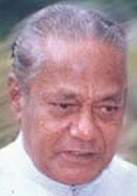
Tillekeratne |
Tillekeratne, (Wanniarachchige Don) Stanley (b. Aug. 3, 1929 - d. June 22, 2005), Sri Lankan politician. He had a long liaison with the country's Left movement from 1947 before joining the Sri Lanka Freedom Party in 1965. He contested and won Kotte on the Communist Party ticket at the July 1960 elections and retained the seat in 1965 for the SLFP. He was reelected in 1970 and was made speaker of parliament, in which role he won the admiration even of his opponents for the impartial manner in which he conducted the affairs of the House. Along with many of the SLFP stalwarts he too suffered defeat at the 1977 poll, but he succeeded in remaining in the public eye as a champion human rights lawyer, especially during the turbulent period of 1989-90. He figured in several groundbreaking cases. At the 1989 elections he was returned to parliament from Colombo district and remained as an MP until his exit in 1994. He was governor of Central province in 1998-2000.
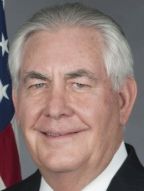
Tillerson |
Tillerson, Rex (Wayne) (b. March 23, 1952, Wichita Falls, Texas), U.S. secretary of state (2017-18). He was CEO of ExxonMobil (2006-16).
Tillery, Dwight (b. March 10, 1948), mayor of Cincinnati (1991-93).
Tillett, Kenneth E(rroll) (b. Dec. 19, 1940, Crooked Tree, British Honduras [now Belize]), Belizean diplomat. He was permanent representative to the United Nations (1985-89).

Tilley |
Tilley, Sir Samuel Leonard (b. May 8, 1818, Gagetown, New Brunswick - d. June 25, 1896, Saint John, New Brunswick, Canada), Canadian politician. Having been active in temperance movements in the 1840s, he began his political career in 1850 as a Liberal member of the New Brunswick legislature, becoming provincial secretary in 1854 and premier in 1861. He represented New Brunswick at the conferences of Charlottetown and Québec in 1864, at which the plans for confederation were prepared. He was the chief advocate of confederation in the province, and his defeat by anti-confederates in a general election in 1865 delayed the progress of negotiations for almost a year. In 1866 his position was vindicated and the confederationists were returned to power. Later that year he attended the London conference on settling provisions of the British North America Act, which in 1867 created the Dominion of Canada. He became the first minister of customs for the dominion, and he served as minister of finance in 1873. After a term as lieutenant governor of New Brunswick (1873-78) he again became minister of finance (1878-85), in which office he introduced the "National Policy," a program of trade protection that remained the basis of Canadian fiscal policy. He was knighted in 1879. In 1885-93 he was again lieutenant governor of New Brunswick.

Tillich |
Tillich, Stanislaw (Rudi) (b. April 10, 1959, Neudörfel, East Germany [now in Sachsen, Germany]), minister-president of Sachsen (2008-17).
Tillisch, Frederik Ferdinand, byname Frits Tillisch (b. April 15, 1801, near Haderslev, Denmark - d. Feb. 16, 1889, Copenhagen, Denmark), prefect of the Faeroe Islands (1830-37) and interior minister of Denmark (1851-52, 1854, 1864-65); brother of Christian Ludvig Tillisch. He was also amtmand of Ringkøbing (1837-43) and Aalborg (1843-45) and minister for Slesvig (1851).
Tillisch, Christian Ludvig (b. July 28, 1797, Favrvrå, near Christiansfeld, Denmark - d. Sept. 13, 1844, Gram, Denmark), prefect of the Faeroe Islands (1825-30).
Tilney, William S(tephen) (b. Sept. 3, 1939, Maywood, Calif.), mayor of El Paso (1991-93).
Tim Dong (b. Feb. 26, 1924, Kien Svay, Kandal province, Cambodia), Cambodian politician. He was minister of information (1957-58, 1958-59, 1962-64) and governor of Kandal (1969?-70).
Tim Nguon (b. June 20, 1920, Takeo province, Cambodia - d. March 8, 1975, Bangkok, Thailand), interior and surface defense minister (1958), finance minister (1970-71), and first deputy prime minister (1971-72) of Cambodia. He was also governor of Prey Veng (c. 1954), Kompong Cham (1950s), and Battambang (1967-70) and ambassador to Australia (1966-67) and Thailand (1972-75).
Timakata, Fred(erick Karlomuana), original name Frederick Karlo Muana, from 1975 Frederick Karlo Maraki (b. 1937, Emae island, Shepherd Islands, New Hebrides [now Vanuatu] - d. March 21, 1995), president of Vanuatu (1984 [acting], 1989-94). He was also minister of home affairs (1980-83) and health (1988-89) and speaker of parliament (1983-87).
Tímár, Mátyás (b. July 10, 1923, Mohács, Hungary - d. Feb. 16?, 2020), finance minister of Hungary (1962-67). He was also a deputy premier (1967-75) and president of the Hungarian National Bank (1975-88).
Timashev, Aleksandr (Yegorovich) (b. April 3, 1818, Orenburg province, Russia - d. Jan. 20, 1893, St. Petersburg, Russia), interior minister of Russia (1868-78). He was also governor-general of Kazan, Perm, and Vyatka (1861-64) and minister of posts and telegraphs (1867-68).
Timashev, Sergey (Ivanovich) (b. 1858 - d. Jan. 27, 1920, Petrograd [now St. Petersburg], Russia), Russian official. He was governor of the State Bank of the Russian Empire (1903-09) and minister of commerce and industry (1909-15).
Timberman, Thomas S(herman) (b. March 21, 1900, New Jersey - d. Aug. 2, 1989), U.S. city commandant of Berlin (1953-54).

Timerman | 
Timmermans | 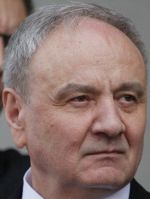
Timofti |
Timerman, Héctor (Marcos) (b. Dec. 16, 1953, Buenos Aires, Argentina - d. Dec. 30, 2018), foreign minister of Argentina (2010-15). Son of the prominent journalist and political prisoner Jacobo Timerman, he was also ambassador to the United States in 2008-10.
Timiryazev, Vasily (Ivanovich) (b. March 31 [March 19, O.S.], 1849, St. Petersburg, Russia - d. Aug. 20, 1919, Petrograd [St. Petersburg]), commerce and industry minister of Russia (1905-06, 1909). He was a nephew of famous botanist Kliment Timiryazev.
Timkovsky, Vasily (Fyodorovich) (b. March 21 [March 10, O.S.], 1781 - d. Dec. 15 [Dec. 3, O.S.], 1832, St. Petersburg, Russia), governor of Bessarabia (1825-28).
Timmermans, Frans, byname of Franciscus Cornelis Gerardus Maria Timmermans (b. May 6, 1961, Maastricht, Netherlands), foreign minister of the Netherlands (2012-14). He has also been first vice-president (2014-19) and an executive vice-president (2019- ) of the European Commission and commissioner for better regulation, inter-institutional relations, rule of law, and charter of fundamental rights (2014-19) and European Green Deal (2019- ).
Timofey, secular name Tikhon (Ivanovich) Shcherbatsky (b. 1698, Tripolye, Russia [now Trypillya, Ukraine] - d. April 29 [April 18, O.S.], 1767), metropolitan of Moscow (1757-67). He was also metropolitan of Kiev (1748-57).
Timofti, Nicolae (Vasile) (b. Dec. 22, 1948, Ciutulesti, Moldavian S.S.R.), president of Moldova (2012-16).
Timonen, Esa (Elias) (b. May 28, 1925, Nurmes, Finland - d. April 19, 2015, Liperi, Finland), governor of Pohjois-Karjala (1967-92). He was also Finnish minister of labour (1970) and transport (1971-72, 1975).
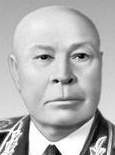
Timoshenko |
Timoshenko, Semyon (Konstantinovich) (b. Feb. 18 [Feb. 6, O.S.], 1895, Furmanka, Russia [now in Ukraine] - d. March 31, 1970, Moscow, Russian S.F.S.R.), Soviet general. Conscripted into the tsarist army in 1915 during World War I, he was awaiting court-martial for striking an officer when freed at the outbreak of the Revolution. He joined the Red Army and, aided by Stalin's friendship, became a cavalry division commander during the Russian Civil War. He held several regional military commands during the 1930s. He became a deputy to the Supreme Soviet in 1937. His greatest contribution to the Red Army was the system of training and rigid discipline he instituted after early Soviet failures in the Russo-Finnish war of 1939-40. He was placed in command of the Soviet forces in January 1940 and by March had forced the Finns to sue for peace. He was rewarded by being named a marshal of the Soviet Union and commissar for defense in May 1940. He worked to upgrade tactical planning as well as to improve Soviet forces' preparedness for a defense against German invasion. When the invasion came in 1941, he was succeeded as defense commissar by Stalin. He held a succession of important commands during World War II. But after some initial success in delaying the German advance on Moscow, he failed in an important campaign in 1942 and was relegated to a staff assignment at Stalin's personal supreme headquarters. After the war he served as commander of the Belorussian military district (1949-60). He was buried in the Kremlin Wall.
Tin Kyaw (b. Oct. 31, 1955, Wuntho, Burma [now Myanmar]), Myanmar diplomat. He was chargé d'affaires (2005) and ambassador (2011-12) to Canada and permanent representative to the United Nations (2012-16).
Tin Oo (b. 1927? - d. Dec. 30, 1998, Yangon, Myanmar), Burmese politician. He was a powerful figure in military intelligence under the rule of Gen. Ne Win, who overthrew a civilian government in 1962 and imposed one-party military rule over Burma. Brig.Gen. Tin Oo served as joint general secretary of the ruling Burma Socialist Program Party from 1981 and was widely regarded as Ne Win's heir apparent. He was removed from office in 1983 and sentenced to life imprisonment for misuse of state funds and property, but was released in 1989. He spent his retirement devoted to religion and meditation.

Tin Oo (1927- ) |
Tin Oo (b. March 3, 1927, Bassein, Irrawaddy division, Burma [now Myanmar]), Myanmar politician. He was chief of staff and minister of defense in 1974-76. In 1976, he was imprisoned for alleged involvement in a coup attempt in July of that year. Released in 1980, he emerged in August 1988 as a prominent opposition leader and became vice-chairman and, on Dec. 19, 1988, chairman, of the National League for Democracy. In 1991 the ruling State Law and Order Restoration Council removed him as chairman; he was replaced by Aung Shwe. He was again detained for four months in 2000-01.
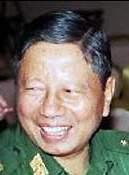
Tin Oo
(1933-2001) |
Tin Oo (b. May 13, 1933 - d. Feb. 19, 2001, at the Salwin River, Kayin state, Myanmar), Myanmar general. He joined the military in 1959 and became commander of Infantry Battalion No. 24 with the rank of lieutenant colonel in 1979. He was promoted to colonel the following year and in 1987 was appointed army chief of staff. He was promoted to brigadier general in 1989, major general in 1990, and lieutenant general in 1993. He became Secretary Two of the ruling State Peace and Development Council and was regarded as the fourth most powerful member of the military government. He survived two apparent attempts on his life in the 1990s. In December 1996 two bombs exploded at a Buddhist shrine on the outskirts of Yangon after a visit by Tin Oo. The blasts killed five people and wounded 17. The government blamed ethnic Karen guerrillas, who denied responsibility. In April 1997 his eldest daughter was killed by a parcel bomb which the authorities said was mailed to his house from Japan. Tin Oo was at home at the time, but was not injured by the blast. The government blamed the attack on Myanmar dissidents based in Japan, but opposition groups denied responsibility and said it was linked to a power struggle among Myanmar's ruling generals. He died in a helicopter crash.
Tin Tut (b. Feb. 1, 1895 - d. Sept. 18, 1948, Rangoon, Burma [now Yangon, Myanmar]), finance minister (1947) and foreign minister (1947-48) of Burma. He died from wounds received Sept. 17, 1948, when an assassin threw a hand grenade into his car.
Tinaz, (Ahmed) Naci (b. 1882, Servia, Greece - d. Nov. 25, 1964, Ankara, Turkey), defense minister of Turkey (1939-40). He was also general commander of gendarmerie (1935-38).
Tinca, Gheorghe (b. Sept. 21, 1941, Bucharest, Romania), defense minister of Romania (1994-96).
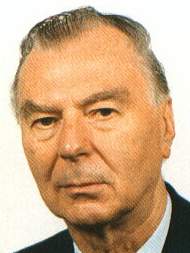
Tindemans |
Tindemans, Léo(nard Clément) (b. April 16, 1922, Zwijndrecht, Belgium - d. Dec. 26, 2014, Edegem, Belgium), prime minister (1974-78) and foreign minister (1981-89) of Belgium. He was also minister of relations between the communities (1968-72), agriculture and middle classes (1972-73), and budget (1973-74).
Tine, Augustin, defense minister of Senegal (2012-19).
Tineo Quispe, Richard (Washington) (b. 1961?), defense minister of Peru (2022). He has also been minister of transport and communications (2022- ).
Tingayev, Nikolay (Yakovlevich) (b. January 1907, Mordovskaya Bokla, Orenburg province, Russia - d. ...), chairman of the Council of People's Commissars/Council of Ministers of the Mordovian A.S.S.R. (1944-50).
Tingley, Clyde (Kendle) (b. Jan. 5, 1882, near London, Ohio - d. Dec. 24, 1960, Albuquerque, N.M.), chairman of the City Commission of Albuquerque (1925-34, 1939-46, 1947-48, 1951-54) and governor of New Mexico (1935-39).
Tingsten, Lars (Herman) (b. June 13, 1857, Ingatorp, Jönköping, Sweden - d. Sept. 10, 1937), war minister of Sweden (1905-07). He was also chief of the General Staff (1919-22).
Tinoco, Tasso de Oliveira (b. Jan. 8, 1897, Rio de Janeiro, Brazil - d. April 21, 1970), federal interventor in Alagoas (1931-32).
Tinoco Castro, Luis Demetrio (b. Sept. 26, 1905, Cartago, Costa Rica - d. March 25, 1986, San José, Costa Rica), Costa Rican politician. He was minister of education (1940-44), minister to France (1946-48), ambassador to West Germany, Norway, and Sweden (1960-62) and the United States and Canada (1968-70), and permanent representative to the United Nations (1966-68).
Tinoco Granados, (José) Federico Alberto (de Jesús) (b. Nov. 21, 1868, San José, Costa Rica - d. Sept. 7, 1931, Paris, France), president of Costa Rica (1917-19). He was also minister of war and navy (1914-17).
Tinubu, Bola (Ahmed Adekunle) (b. March 29, 1952), governor of Lagos (1999-2007).
Tiny, Carlos Alberto Pires (b. 1950 - d. April 8, 2022, Lisbon, Portugal), foreign minister of São Tomé and Príncipe (2008-10). He was also minister of health and sports (1980-84) and cooperation (1984-86) and a presidential candidate (2001).
Tipote, Filomena (Mendes) Mascarenhas (b. March 1, 1969), foreign minister (2001-02) and defense minister (2003-04) of Guinea-Bissau. She has also been minister of social solidarity and employment (2001) and public administration and labour (2002-03) and ambassador to France (2018-21) and Morocco (2021- ).
Tipping, Paul (John Alexander), New Zealand representative in the Cook Islands (1982-85). He was also ambassador to Chile, Brazil, Uruguay, and Argentina (1988-91), Spain (1992-96), and Mexico, Cuba, Venezuela, Guatemala, and El Salvador (2001-04).
Tirado, Claudio N(abor) (b. Zacapoaxtla, Puebla, Mexico - d. Aug. 11, 1947, Mexico City, Mexico), governor of Puebla (1921, 1925-26).
Tirado (Escanilla), Gonzalo (b. 1860? - d. 1926, Paris, France), interior minister of Peru (1913-14).
Tirado, José Manuel (b. 1809, Lima, Peru - d. Dec. 22, 1855, Lima), foreign minister (1844, 1852-53) and interior minister (1852-53) of Peru. He was also minister to the United States (1850, 1854-55).
Tirant, René (Aristide Théophile) (b. Nov. 22, 1907, Chey, Deux-Sèvres, France - d. June 7, 1978, Cannes, Alpes-Maritimes, France), acting governor (1958) and high commissioner (1958-60) of Dahomey and governor of French Somaliland (1962-66).
Tirard, Pierre (Emmanuel) (b. Sept. 27, 1827, Geneva, Switzerland - d. Nov. 4, 1893, Paris, France), prime minister of France (1887-88, 1889-90). He was also minister of agriculture and commerce (1879-81), commerce (1882), finance (1882-85, 1887-88, 1892-93), commerce and industry (1889-90), and colonies (1889-90).
Tirman, Louis (b. July 29, 1837, Mézières [now part of Charleville-Mézières], Ardennes, France - d. Aug. 2, 1899, Taboureaux castle, near La Ferté-Loupière, Yonne, France), governor-general of Algeria (1881-91). He was also prefect of the French départements of Ardennes (1871-73), Puy-de-Dôme (1876-77), and Bouches-du-Rhône (1877-79).
Tirpitz, Alfred (Peter Friedrich) von ("von" added in 1900) (b. March 19, 1849, Küstrin, Prussia [now Kostrzyn nad Odra, Poland] - d. March 6, 1930, Ebenhausen, near Munich, Germany), navy minister of Germany (1897-1916).
Tirumurti, T(irunelvelli) S(rinivasamurti) (b. March 7, 1962, Madras [now Chennai], India), Indian diplomat. He was representative in Palestine (1996-98), high commissioner to Malaysia (2013-18), and permanent representative to the United Nations (2020-22).
Tiselius, Karl (Edvard) (b. Oct. 16, 1875, Stockholm, Sweden - d. April 21, 1954), governor of Östergötland (1930-41).
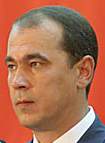
Tishanin |
Tishanin, Aleksandr (Georgiyevich) (b. April 20, 1966, Troitsk, Chelyabinsk oblast, Russian S.F.S.R.), governor of Irkutsk oblast (2005-08) and head of administration of Ust-Ordynsky Buryat autonomous okrug (2007).
Tiso, Frano (b. April 12, 1894 - d. March 2, 1974, Pfaffenhofen, Bayern, West Germany), Slovak diplomat; nephew of Jozef Tiso. He was minister to the Soviet Union (1939-41).
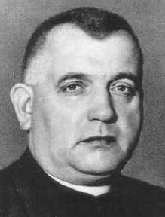
J. Tiso |
Tiso, Jozef (b. Oct. 13, 1887, Velká Bytca, Austria-Hungary [now in Slovakia] - d. April 18, 1947, Bratislava, Czechoslovakia [now in Slovakia]), president of Slovakia (1939-45). After World War I Tiso, a Catholic priest, became a prominent member of Andrej Hlinka's Slovak People's Party, which was strongly clerical and autonomist. In January 1927, after a détente between Prague and the Slovaks, he was one of the two members of his party who joined the Czechoslovak government (as minister of health and physical education); but in October 1929, after the trial and conviction of its deputy Vojtech Tuka as an agent of Hungary, the Slovak People's Party lost five seats in a general election and withdrew from the cabinet. On Hlinka's death in August 1938, Tiso succeeded him as party leader. On Oct. 7, 1938, he became premier (and in November also interior minister) of autonomous Slovakia in the new federal Czechoslovakia. In March 1939 Slovakia became nominally independent under German protection; on October 26, he was elected its first president. His prime minister was Tuka, an admirer of Nazi Germany. Though Tiso was more clerical and less Nazi, he was able to make the most of German protection and to retain a degree of freedom of action. He was overthrown by the Red Army and Czechoslovak Partisans at the end of World War II. Tried and found guilty of conspiring against the Czechoslovak republic, suppressing democratic freedom, preparing and waging war against Poland and the Soviet Union, and crimes against humanity, he was sentenced to death and hanged.
Tisza de Borosjenö et Szeged, István (Imre Lajos Pál) gróf (b. April 22, 1861, Pest [now part of Budapest], Hungary - d. Oct. 31, 1918, Budapest), prime minister (1903-05, 1913-17) and interior minister (1903-05) of Hungary; son of Kálmán Tisza de Borosjenö et Szeged. Entering the Hungarian parliament in 1886, he became a leader of the Liberal Party led by his father. He was also acting minister a latere (1903-04, 1915), speaker of the House of Representatives (1912-13), and minister for Croatia-Slavonia and Dalmatia (1913, 1914-16). He became gróf (count) in 1897. He believed in strong personal government and sought to make Hungary a forceful partner in the Austro-Hungarian monarchy. He took repressive measures against the Serbian and Romanian minorities of Hungary, seeking to block their secessionist tendencies. When the Liberal Party was defeated in 1905, he dissolved it and in 1910 founded the Party of Work. He strongly opposed the aggressive policy of Leopold Graf Berchtold, the Austro-Hungarian foreign minister at the outbreak (1914) of World War I, but at last consented to declaring war on Serbia after being assured that no Serbian territory was to be annexed. Tisza's influence waned after the death of Emperor Franz Joseph and the accession of Karl I. He refused to bow to Karl's demand that voting rights be broadened. His ministry fell in 1917, and he took a military command on the Italian front. He was assassinated near the end of the war by soldiers who believed him a chief instigator of the same.
Tisza de Borosjenö et Szeged, Kálmán (b. Dec. 16, 1830, Nagyvárad, Hungary [now Oradea, Romania] - d. March 23, 1902, Budapest, Hungary), interior minister (1875-87), prime minister (1875-90), and finance minister (1878 [acting], 1887-89) of Hungary. He was also acting minister a latere (1879). He founded the Liberal Party in 1875.
Tisza de Borosjenö et Szeged, Lajos (b. Sept. 12, 1832, Geszt, Hungary - d. Jan. 26, 1898, Budapest, Hungary), Hungarian politician; brother of Kálmán Tisza de Borosjenö et Szeged. He was minister of public works and transport (1871-73) and minister a latere (1892-94).
Tito, Epel (d. 2018), defense minister of Papua New Guinea (1982-83). He was also minister of information and broadcasting (1983-85).

J.B. Tito |
Tito, Josip Broz, original name Josip Broz (b. May 7, 1892, Kumrovec, near Zagreb, Austria-Hungary [now in Croatia] - d. May 4, 1980, Ljubljana, Yugoslavia [now in Slovenia]), prime minister (1945-63) and president (1953-80) of Yugoslavia. He was drafted into the Austro-Hungarian army in 1913 and fought in World War I until captured by the Russian army in 1915. In 1918 he joined the Red Army and became a Communist. In 1920 he returned from Russia to Croatia. Having joined the Communist Party of Yugoslavia (CPY), he was arrested on Aug. 4, 1928, and was sentenced to five years. In 1934 he was released and became a member of the Central Committee of the CPY and then of the Politburo. For conspiratorial reasons, he adopted several pseudonyms, among which Tito was most frequently used. In 1937 he took over the leadership of the party. After the German invasion of Yugoslavia in 1941 he began building up a guerrilla organization. This Partisan movement spread throughout Yugoslavia, and the rival underground organization, the Chetniks, lost ground. In 1943 he decided to convene a Partisans Parliament, which set up a provisional revolutionary government. Tito, now a self-appointed marshal, was installed in Belgrade on Oct. 20, 1944, and the last German or pro-German forces were annihilated on May 15, 1945. In 1948 Tito became the first Communist national leader to defy the Soviet Union, insisting on Yugoslavia's right to set its own political course. In 1953 he became the first president of Yugoslavia, a post he held until his death. In the pursuit of his neutralist policy he traveled extensively in Africa, Asia, and Latin America. He supported the concept of active nonalignment, going beyond mere neutrality by promoting alternatives to the politics of the Western and Soviet blocs.
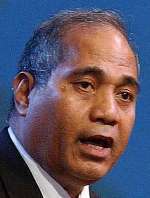
T. Tito |
Tito, Teburoro (b. Aug. 25, 1953, Tanaeang village, Tabiteuea North island, Gilbert and Ellice Islands [now in Kiribati]), president of Kiribati (1994-2003). In 1980 he joined the civil service as scholarship officer with the Ministry of Education, Training and Culture. In 1987, he was elected as a member of the Maneaba ni Maungatabu (Kiribati House of Parliament), and he served as leader of the opposition from 1987 to 1990. He was reelected in general elections in 1991, 1994, 1998, and 2002. He became president in 1994 following his victory over three other candidates in a national presidential election. He was reelected president in 1998 and, narrowly, in 2003, soon after which he was toppled in a no-confidence motion. In 2017 he became permanent representative to the United Nations.
Titov, Boris (Yuryevich) (b. Dec. 24, 1960, Moscow, Russian S.F.S.R.), Russian politician. He has been co-chairman (2008-09) and chairman (2016) of Right Cause and chairman of the Party of Growth (2016- ), presidential commissioner for entrepreneurs' rights (2012- ), and a minor presidential candidate (2018).
Titov, Fyodor (Yegorovich) (b. Jan. 8, 1910, Gorky village, Vladimir province [now oblast], Russia - d. May 18, 1989, Moscow, Russian S.F.S.R.), foreign minister of the Russian S.F.S.R. (1971-82). He was also first secretary of the party committees of Ivanovo oblast (1952-59) and the Chechen-Ingush A.S.S.R. (1963-66) and Soviet ambassador to Hungary (1966-71).
Titov, Konstantin (Alekseyevich) (b. Oct. 30, 1944, Moscow, Russian S.F.S.R.), head of the administration of Samara oblast (1991-2000, 2000-07). He was also mayor of Kuybyshev (1990-91) and a Russian presidential candidate (2000; 1.5% of the vote).
Titov, Pavel (Ivanovich) (b. Oct. 10, 1907, Pytalovo, Pskov province, Russia - d. Sept. 14, 1990, Moscow, Russian S.F.S.R.), first secretary of the party committee of Crimea oblast (1949-54).
Tittoni, Tommaso (b. Nov. 16, 1855, Rome, Papal State [now in Italy] - d. Feb. 7, 1931, Manziana, Italy), foreign minister (1903-05, 1906-09, 1919), prime minister (1905), and interior minister (1905) of Italy. He was also ambassador to the United Kingdom (1906) and France (1910-16) and president of the Senate (1919-29).
Titulescu, Nicolae (b. March 4, 1882, Craiova, Romania - d. March 17, 1941, Cannes, France), finance minister (1917-18, 1920-21) and foreign minister (1927-28, 1932-34, 1934-36) of Romania. He was also minister to the United Kingdom (1922-27, 1928-32) and president of the Assembly of the League of Nations (1930-32).
Tiu, Nicolae (Anton), Russian Nikolay (Antonovich) Tsyu (b. March 25, 1948, Kakhul region, Moldavian S.S.R.), foreign minister of Moldova (1990-93). He was also first secretary of the party committee of Kishinev city (1986-90) and ambassador to the United States, Canada, and Mexico (1993-98).

Tiwari |
Tiwari, Narain Dutt (b. Oct. 18, 1925, Baluti village, Naini Tal district, United Provinces [now in Uttarakhand], India - d. Oct. 18, 2018, Delhi, India), chief minister of Uttar Pradesh (1976-77, 1984-85, 1988-89), foreign minister (1986-87) and finance minister (1987-88) of India, chief minister of Uttaranchal (2002-07), and governor of Andhra Pradesh (2007-09). He was also minister of planning (1980-81), labour (1980-82), industry (1981-84, 1985-86), steel and mines (1982-84), and commerce (1987-88). He resigned as governor, citing "health problems," after a local television channel aired a video allegedly showing the 84-year-old in bed with three young women.
Tixier, Adrien (Pierre) (b. Jan. 31, 1893, Folles, Haute-Vienne, France - d. Feb. 18, 1946, Paris, France), interior minister of France (1944-46). He was also Free French commissioner of labour and social security provisions (1943) and social affairs (1943-44).

C. Tizard |
Tizard, Dame Catherine (Anne), née Maclean (b. April 4, 1931, Auckland, N.Z. - d. Oct. 31, 2021), governor-general of New Zealand (1990-96); former wife (1951-83) of Robert Tizard. An Auckland city councillor from 1971, she became mayor in 1983. She was knighted in 1984. When she ceased to be mayor in 1990, she was appointed as the first woman governor-general of New Zealand.
Tizard, Robert (James), byname Bob Tizard (b. June 7, 1924, Auckland, N.Z. - d. Jan. 28, 2016, Auckland), deputy prime minister (1974-75), finance minister (1974-75), and defense minister (1987-90) of New Zealand. He was also minister of health (1972-74) and energy, science, and technology (1984-87).
Tizengauzen, Graf (Count) Vladimir (Fyodorovich) (b. 1844 - d. 19...), governor of Erivan (1896-1916).



























